The Cantuarian

 Front Cover: Amelie Board (6b, MR)
Front Cover: Amelie Board (6b, MR)


 Front Cover: Amelie Board (6b, MR)
Front Cover: Amelie Board (6b, MR)
The Captain’s Speech Ludo Kolade 6
The Chaplain’s Chapter Lindsay Collins 8
Galpin’s House Michael Boyne 10
Fields of Gold Trajan Majomi 14
Proust Uncut Sophie Sy-Quia 18
A Glass Act Naomi Cray 20
Purple Patch Purples 24
Shell Shock Shells 28
Novel Advice A. F. Steadman 34
Milk and Sleep Briony Cobb 40
The Maker’s Tale Peter Pinder 44
Hard Graft Gavin Merryweather 48
Writing Music Annalise Roy 52
Football Fanatic Rob Harrison 56
Buzz Cars David Perkins 58
Play it Again Roberta Mak 60
Chasing Legends Maddie Aldag 62
Dancing Queen Elina Lin 66

FREDIE FREDIE 70
Wisdom Teeth Charlotte Lester 78
Bred in the Bone Lilia Trigg 80
Earthy Secrets Ross Lane & Jess Twyman 84 Yes, Chef! Andy Snook 90
The Long Ranger Fede Elias 92 Faith Natalya Hoare 94
Salvete Prize Annika Li, Dylan Shearer & Molly Jones 96 Daybreak Song Finn Cleghorn-Brown 102
Sport Jack Pelling & Lucy Andrews 106
Music Lucas Emmott 118
Drama Imogen Melrose 124
From the Archive The Cantuarian 1922 136 King’s Week 144 Art Exhibition 150 Valete 156
Editor Anthony Lyons
Photographer Matt McArdle Designer Cobweb Creative Archivist Peter Henderson
Cobweb Creative yvonne@cobwebcreative.org
Matt McArdle Photography mattmcardle13@mac.com
The Cantuarian info@cantuarian.co.uk
At last, we’ve managed to publish The Cantuarian in the right calendar year, because pupils, staff and OKS rose to a fresh challenge after years of frustrating delays. What follows is, of course, largely a tribute to a constructive decade of leadership by a memorably erudite, industrious and architectural Headmaster, Peter Roberts, who set the school magazine free and allowed it to take new paths and break new ground.
‘We hope you’ll agree that the following pages capture once again a unique school ethos.’
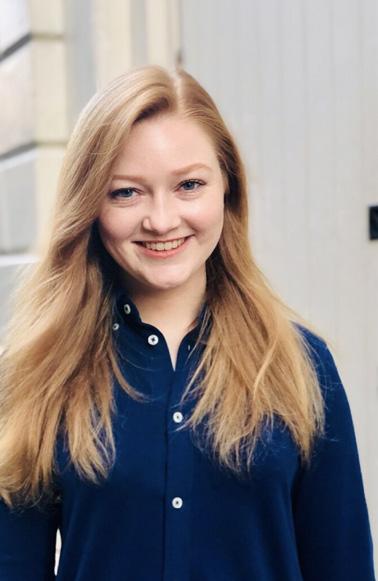
We hope you’ll agree that the following pages capture once again a unique school ethos. King’s is a centre of learning without snobbery, prejudice or arrogance. The word ‘culture’ is never used at this school to mean decorative or recreational activities, because it knows that culture is merely what distinguishes humanity from the biology we share with other great apes.
At King’s, culture is not just art, music, theatre or literature, but also sport, mythology, religion, languages, science and philosophy, and every other activity that chimpanzees and bonobos do not practise. At King’s, rugby is no better than chess, painting is no better than computing, and debating is no better than praying. Human curiosity, enterprise and the pursuit of excellence inspire us all. And it’s a cultural melting pot as a result, since 74 different nations this year have sent their sons and daughters here to learn how to feel, think and behave like adults. Yes, King’s pupils are no longer suppressing emotions but learning to air them openly and steer them creatively, rather than pretending rationality is still the Holy Grail.
How humbling it’s been putting this issue together. A boy born in Kyiv explains why 2022 has been tough. A girl stumbles across an uncut edition of Proust on a classroom shelf and gets it cut. Another girl tells us which stained glass windows in Canterbury Cathedral she likes best. Purples reveal their ambitions for later life, and Shells give advice to their would-be successors from prep schools. An award-winning OKS tells pupils how to write a novel without going mad; another explains how to bring up a child according to nature; and another charts an astonishing career living on his wits in the Far East.



And the school staff prove they are much more than their jobs suggest. The chap who runs the place, the land and buildings on which we all depend, is an Iron Man. The accompanist at Congers is a gifted composer. The indefatigable young polyglot in Modern Languages is a soccer nutter. And the brilliant History teacher, who could easily live in the past if he so chose, is fully aware of the way the past affects the present and our global future day by day. If that’s not enough, a renowned pupil pianist, who plays entire Chopin polonaises from memory, celebrates her father learning the piano, aged 72. Also, a daughter celebrates her father’s brilliant career as a cyclist, and a god-daughter celebrates the dancing genius of her godmother, the greatest of all Chinese ballerinas. I could go on, but do read for yourself.

If you have any ideas for future issues, please get in touch.
 Anthony Lyons Editor info@cantuarian.co.uk
Anthony Lyons Editor info@cantuarian.co.uk

ood afternoon, everyone.
My most recent experience of Shirley Hall has been frantically scribbling for my A’ Levels, so I can only say I’m delighted to be back here instead to celebrate the end of school, surrounded by my friends and family.

The Captain of School’s speech is certainly an intimidating task. I wondered whether to compose a speech filled with life-changing bits of advice, the sort of speech that would be spoken about for years to come. But I’m only an 18-year-old boy, so this afternoon I decided instead to talk from the heart about my experience of King’s, a school which to me has meant very much over the past five years.
I remember the first time I was hit by the King’s spirit, the first time I understood what it meant to be a King’s pupil, was House Song in Shell. Now for those who don’t know, King’s House Song is perhaps the most fiercely competitive event of the calendar year. Rivalries are formed, friendships are put to the test, and I will not even dare mention what goes on if two houses happen to choose the same song! But I still vividly remember approaching Shirley Hall for my first House Song and immediately I was hit by this wall of sound of houses chanting, and singing, and enjoying themselves. This highlighted to me just what we are as a school – passionate. I believe this is what makes us unique compared with other schools. We are passionate about everything we do, from art, to drama, to sport, to music, and we celebrate the success of
those on the cricket pitch just as much as we do the success of those on the stage or in the science labs.
Now this year marked the 71st King’s Week, and being able to welcome parents back into the school has been fantastic. But for me the return of King’s Week proper epitomises all that King’s is: a joyous, inclusive, and fantastically talented community. Whether you went to see Elliot amaze us all at the jazz, or Max take to the stage in Twelfth Night, or perhaps you were even lucky enough to see Louis Smeeton sporting a particularly dashing tank top at Fleetwood Mac, what I’m sure we can all agree on is that not only has the standard this year been exceptionally high, but to be able to relax, and enjoy, and celebrate amongst friends and family has been extraordinary, and something we have not taken for granted.
Sadly, the end of this year’s King’s Week also means we must say goodbye to the Headmaster and Mrs. Roberts. The Headmaster joined King’s in 2011, and in his time here he has taken this school on in leaps and bounds. He has spearheaded projects such as the Malthouse, opened international colleges in Shenzhen, Cambodia, and right here in Canterbury, and set up the new science block. This is all the more impressive when you consider that he did all this alongside a strict seven-day-a-week training regime for the Paris marathon. Ultimately, the Headmaster’s ability to be fun and himself, with frequent ramblings in either Latin or French, which still to this day we do not understand, allows each student to be themselves too, and for that he will be sorely missed. Alongside
‘What I’m sure we can all agree on is that not only has the standard this year been exceptionally high, but to be able to relax, and enjoy, and celebrate amongst friends and family has been extraordinary.’
‘I’m only an 18-year-old boy, so this afternoon I decided instead to talk from the heart about my experience of King’s, a school which to me has meant very much over the past five years.’


him is Mrs. Roberts, who is not only a massive support to the Headmaster, but a quiet leader herself. I am also told she is a fantastic harpist (there you go: don’t say this speech didn’t teach you anything). Mr. and Mrs. Roberts, on behalf of everyone here at King’s, I would like to say a massive thank you and wish you the very best for your retirement.

I would also like to thank the Senior Leadership Team - Mrs. Worthington, Miss Lee, Mr. Bartlett and Mr. Hunter, whose relentless efforts have navigated the school through the pandemic so successfully.
And now, the 6a’s. I would like to thank my friends and the whole of the 6a year group. For our year to have so many individuals excelling in different areas is a truly impressive feat. This ranges from Henry and Octavia raising thousands of pounds for various charities, to Funbi and Melissa spearheading FREDIE groups promoting racial and sexual equality, to Maya performing with the Chineke Junior Orchestra at Soccer Aid in front of 60,000 people. But perhaps more impressive still has been our year’s ability to pull together despite the challenges of the pandemic. How many hours must we have spent sat in our
bedrooms in front of a screen? More likely, how often did we set our alarms for 8:59am to roll out of bed for our 9am lessons? But to be able to come through such a tough period and then complete our first-ever public exams, I think, is truly incredible, and something we should be very proud of ourselves for. This resilience, to persevere despite what is going on around us, is what has prepared us so well to tackle challenges head on, and why we should be excited about whatever the future holds for us.
‘The Headmaster’s ability to be fun and himself, with frequent ramblings in either Latin or French, which still to this day we do not understand, allows each student to be themselves too, and for that he will be sorely missed.’
I would like to finish with a quote from OKS, Michael Morpurgo, which reads, ‘If I learned anything in life, I have learned that you can’t cling on.’ So, this would be my final message to all of us: whilst this chapter of our lives is now over, take confidence from what we have learnt and achieved here at King’s. Use those experiences to tackle whatever obstacles we face in our future, and celebrate both what has been and what is to come.
 King’s Chaplain, Lindsay Collins, muses on the holiness of hospitality.
King’s Chaplain, Lindsay Collins, muses on the holiness of hospitality.
Having had the privilege of serving as Chaplain of The King’s School for the past five years, and looking forward to beginning my sixth year in this special community, I find myself reflecting on what has made my time here so fulfilling. It is easy to comment on our awesome students, the friendliness and hard work of the committed staff, or even the beautiful setting in the Precincts of Canterbury Cathedral. But overhearing some wedding guests enjoying the exceptional food and service of our wonderful catering department during the summer holidays, I realised they had articulated exactly what it is: ‘The hospitality of The King’s School is second to none,’ they said.

And in that one word, ‘hospitality’, they summed up for me what is the ethos of The King’s School and what underpins everything else that goes on here. I should not be surprised, because hospitality has been the bedrock of Christianity in Jesus’ golden rule of love for God and for our neighbour. Hospitality was also practised for centuries by the monks on this very site, who followed the rule of St. Benedict that required them to welcome the guest as Christ himself.
The Israelites in the Old Testament were constantly reminded to ‘welcome the stranger because you know what it is to be a stranger in a foreign land’. The richness of The King’s community comes from the diversity of our members and we welcome students from across the globe. Over the past year staff and students have formed a range of committees to find ways of ensuring we show all who come through our door the best hospitality that we can, because true hospitality matters in a community. As the former Archbishop, Rowan Williams, wrote: ‘Hospitality invites the stranger to come into our own safe space and thereby turns the place of safety into a place of risk. Hospitality is an adventure that you have without travel. Hospitality implies and requires the questioning, stretching
and maybe transgressing of the boundaries that make our life orderly, predictable and pleasant. True hospitality lets things get under your skin.’
In preparing King’s students for the unpredictability and constantly changing nature of the world, hospitality becomes a key skill that they need to have encountered and practised themselves. In learning to make room for the other, they allow themselves to be open and hospitable to new ideas, different cultures and beliefs, alternative ways of seeing and of being.
Such understanding will only help to create people of peace and justice in our world. As Letty Russell wrote: ‘Hospitality is the practice of God’s welcome by reaching across difference to participate in God’s actions bringing justice and healing to our world in crisis.’
In order to practise hospitality we need to learn to make space in our lives. In a world of continued busyness, a lesson we all took away from lockdown was the appreciation of space, of stillness and of silence. Whilst we missed social and tangible interaction, we recognised that making space for reflection, for new ways of living, for discerning what is truly important in our lives, is a necessary part of our development. It is perhaps why students so enthusiastically embraced the introduction of a 9pm midweek voluntary service of Compline in school, for it creates an opportunity for them to reflect on making space in their lives for the things that matter: friends and family, love and justice, fun and joy.
The writer to the Hebrews was inspired when he wrote, ‘Do not neglect to show hospitality to strangers, for thereby some have entertained angels unawares.’ My prayer for The King’s School is that it will never lose sight of the importance of
for the stranger, whoever and whatever that
love
stranger might be.
‘‘In that one word, ‘hospitality’, they summed up for me what is the ethos of The King’s School and what underpins everything else that goes on here.’’
‘In preparing King’s students for the unpredictability and constantly changing nature of the world, hospitality becomes a key skill that they need to have encountered and practised.’
‘Do not neglect to show hospitality to strangers, for thereby some have entertained angels unawares.’ (Hebrews 13:2)

The campfire burned brightly in the peaceful garden. I laughed and exchanged stories with friends, happy to be part of this community known as Galpin’s. Galpin’s is a place that I can call my home and holds many memories because of the amazing people who live there.
Galpin’s is located right at the centre of the school, and I’ve found this convenient for sleeping in when I’m lazy, and inviting friends over from other houses during breaks. It’s also close to the Music School, which has motivated me to improve my clarinet skills. While the location is a huge advantage to being part of Galpin’s, the most important part of the house is the people.
When I arrived in Shell, I was intimidated by the new environment. It was my first boarding experience and I was extremely homesick. The addition of the independence required at a boarding school made me incredibly nervous. To be honest, I was considering asking my parents to let me leave the school. However, I soon found out that many people were struggling with the same problem, which made me feel less alone. I finally got the courage to start talking with the people in my house and realised I was worried about nothing, because these people would end up being my best friends. They have helped me through tough times at school, and were always supportive when I needed them.

The Sixth Form when I was in Shell were also intimidating to talk to, but over the course of the year I came to understand that the Sixth Formers are also teenagers, at the end of the day, and were just as immature as us. The Shell monitors from 6b would end up talking to us a lot, giving us advice or just messing around in house.
Galpin’s is known for its competitiveness when it comes to school events. We have won the overall House rowing cup every year since 2010, and we won the sailing cup every year from 2011-18. At the moment we have boys in many 1st teams (ranging from rugby to rowing, cricket to tennis, chess to fencing), and we are well known for being a very musical house (we have 3 pianos in the house).” During House Song, our conductor will always put their heart and soul into the piece they arrange, which encourages all of our house to try its best and win. It also gives us a role model to look up to.
One of the highlights of the summer term is the Galpin’s Garden Gig. This is held on the 3rd Sunday of the Autumn term and is viewed a little like a mini King’s Week! In the morning we move the sofas and chairs into the garden from our common room, and we put the King’s Week deck chairs onto the lawn, all facing our table tennis terrace. There are gazebos and food and drink on offer (all free!) and everyone

‘Galpin’s is a place that I can call my home and holds many memories because of the amazing people who live there.’
Michael Boyne (5th, GL) told us he was proud to live in Galpin’s, and we asked him why.
in the school is invited to join us, either on stage as singers and musicians, or in the audience. It is a really fun afternoon. I clearly remember Louis, Elliot, and Maya Moh from last year entertaining us for a solid two hours. This year we had Giorgio, Seb, Will, Flore, Mr T and more. Seeing everyone happy and having a good time on a sunny day in our garden made me really proud to be in Galpin’s.
Another thing that separates Galpin’s from other houses is that we have a brilliant housemaster, Mr. Sanderson. He has supported the house greatly when it comes to making school life enjoyable. By providing many types of entertainment, such as a PS4, a football table, darts and a movie night, every so often he has brought together many different year groups and made the house more alive. Whenever someone needs moral assistance, Mr. Sanderson is always available, willing to talk and give advice.
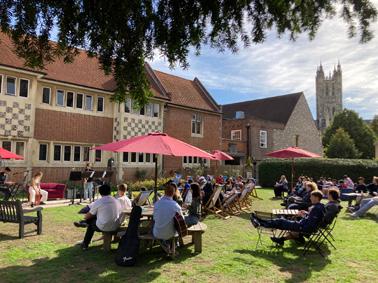






Other staff in the house also play a huge role in why Galpin’s is remarkable. Every cleaner and matron is very friendly. Our talks range from school-work to embarrassing stories that make us all laugh. Sadly, our matron, Michelle May, is leaving in a couple of months. She has brought joy into our house and cheered everyone up just with her presence, and never failed to resolve issues within the house. Even though she is leaving, she will still be fondly remembered and part of Galpin’s.
Galpin’s will always be a home to me. My fondest times belong in this house and it is the reason why I enjoy school so much. I need to make sure that I use my remaining two years at King’s wisely, because the cheerful, chaotic atmosphere of Galpin’s is something I don’t believe I’ll be able to experience again.
‘My fondest times belong in this house and it is the reason why I enjoy school so much.’

‘Whenever someone needs moral assistance, Mr. Sanderson is always available, willing to talk and give advice.’

Before the Russian invasion of Ukraine, I never believed there could be such a conflict in my lifetime. I recall long summers with my grandparents in their village outside Kharkiv, and attending elementary school close to the city centre. I remember the Ukrainian people. I remember friends, parents of friends, teachers and my family. These days, I turn to memories of Ukraine for comfort when current affairs cause turbulence in my life.
It is because of these sacred memories that seeing footage of familiar buildings reduced to rubble is difficult. On the second week of the invasion, I woke up to a video of the town hall under heavy shelling. The town hall stands at the top of what is known locally as ‘Freedom Square’ in the city of Kharkiv. It is the cultural centre of a fine town with many universities and historic buildings. I once attended classes in a building across the street from the site of the impact, and daily drove past the town hall.
That video made me understand that the Russian tactic is to weaken and disorientate the Ukrainian people however possible, even if it means destroying the culture, morale and
emotional integrity of innocent civilians. While I find losing something at a distance difficult, I struggle to understand how people can witness and withstand such terror and horror firsthand.


I often think of my aunt and uncle, who live in Kharkiv. A few days before I was leaving the town to return to school in England last summer, I talked to them about when we would see each other next. While sitting outside their new home, we made plans. Now, in all likelihood, we will not see each other for months or even years. The freedom to roam they took for granted after years of living in the same city has been replaced by the confines of their basement, now their constant shelter from shelling. The images and sounds they have shared with the rest of the family are deeply haunting.
In the past, I wondered how victims of war cope with loss. After hearing accounts of the war from my friends and family I now see that such perils make victims feel any form of retaliation is fit and necessary. After days of confinement to her basement shelter, I shared an emotional phone call with my aunt, who was starting to feel the effects of living in
cramped space and hearing
Trajan Majomi (6b, TR) was born in Kyiv, Ukraine, in 2006. He explains what life has been like since February 2022.
a
constant
‘I recall long summers with my grandparents in their village outside Kharkiv, and attending elementary school close to the city centre.’
artillery fire. Her form of retaliation had to be mental and emotional resilience, which proves difficult to maintain when the shelling is nonstop.



My grandparents, who were abroad during the invasion, struggle to come to terms with their displacement. Based on my time in Ukraine, I believe that Ukrainian values centre on routine and role fulfilment. Like other Ukrainians of their generation, my grandparents grew up valuing a nuclear household. In my eyes, these values offer stability and safety, both difficult to find in war.
During the Easter holiday I visited my grandparents and tried to be a supportive grandson. I tried to be sensitive and considerate, especially after they received news from home that was not good news. While this was a turbulent period for them, they seemed positive and optimistic. To my surprise, they had even maintained their daily routine and diets. The endless meals to fatten me up, coupled with my grandfather’s never-ending list of anecdotes, made

‘It is because of these sacred memories that seeing footage of familiar buildings reduced to rubble is difficult.’
that visit feel like any other visit, and I realised this maintenance of routine by my grandparents was the only way they could cope with being barred from their country and their cherished home. But behind these attempts to cope, and their seeming optimism, there was fear and anxiety with every video from the front lines and every phone call from a friend in the know.
By sharing this account, I am trying to convey the effect the war has had on my family. I am lucky that none of those close to me have suffered fatally, and I hope this will stay the case, not only for myself but for others as well.
I hope also the conflict in Ukraine will be the last of its kind, and that with the end of this war humanity can move forward and abandon the mentality that causes leaders of nations to engage in such devastating behaviour.


‘The freedom to roam they took for granted after years of living in the same city has been replaced by the confines of their basement.’
‘Behind these attempts to cope, and their seeming optimism, there was fear and anxiety with every video from the front lines.’
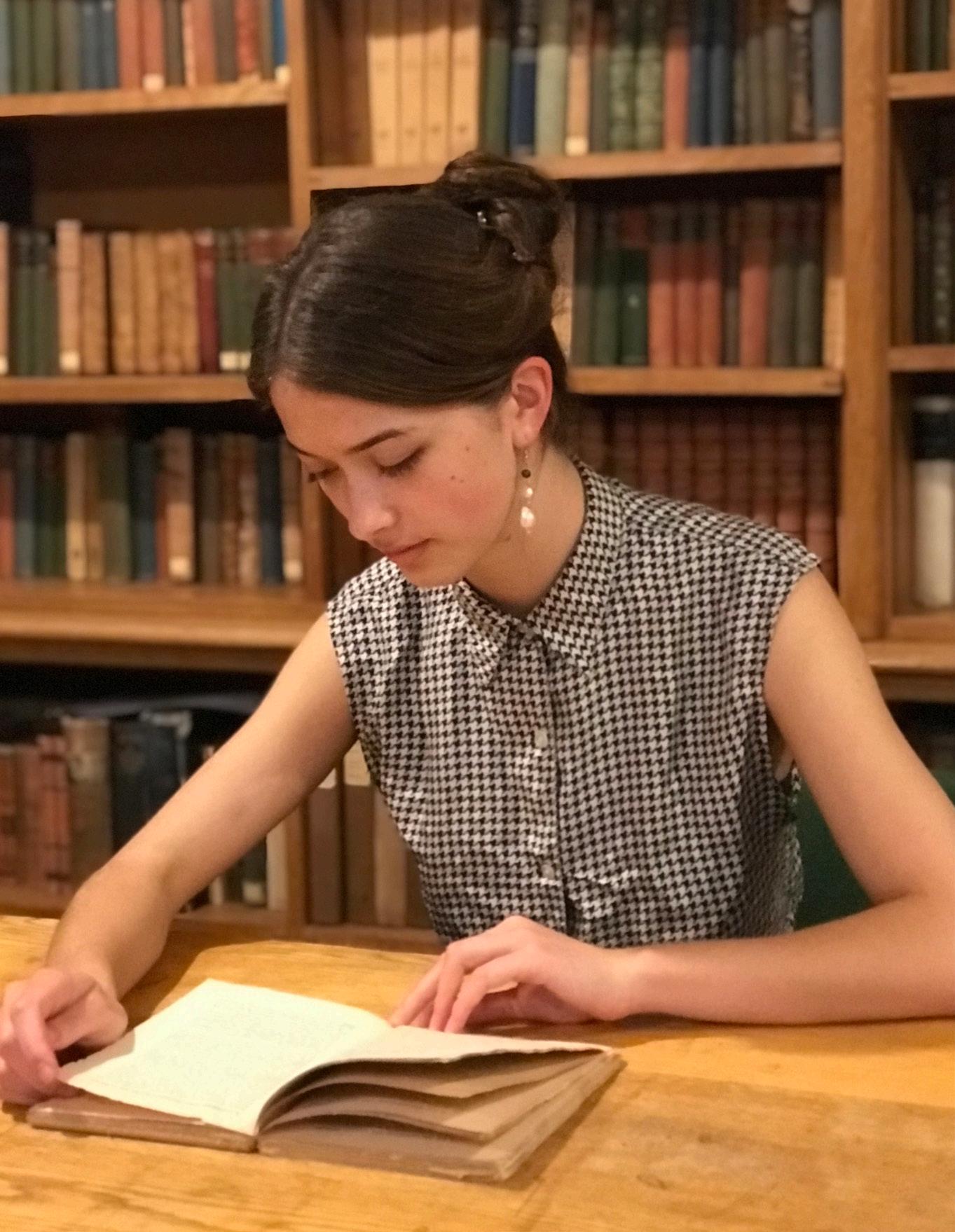
‘She was both disappointed and excited to see that the pages of the book were uncut.’
One day, during an English lesson in the Maugham Library, Sophie Sy-Quia, who is bilingual in French and English, spotted a copy of Proust on the shelves but, after a crafty peek, she was both disappointed and excited to see that the pages of the book were uncut. When her English teacher saw the unsullied text, of course he called in the School Archivist, Peter Henderson, who not only supplied his own paper knife so that Sophie could cut open the pristine volume and have a good read, but also gave us the following details about her discovery:
Marcel Proust’s À L’Ombre des Jeunes Filles en Fleurs was the second volume in his sequence of novels À la Recherche du Temps Perdu. It was published in 1918 and won the Prix Goncourt.


In the Maugham Library are two of a three-volume set published in 1934. The cover states this is the ‘145e édition’ and the cost is 45 francs per volume. These particular copies did not belong to Maugham but were part of a collection of books given to King’s by OKS Bruce Money.
The pages were ‘uncut’ because each group of eight pages was printed on one sheet of paper and then folded and bound. The reader would therefore need to use a paper knife, or a letter opener, to cut open the pages at the top and the side. (Or, as was not uncommon in the 19th and early 20th Centuries, give it to a bookbinder to be trimmed and bound.)
The King’s School Library has most of the French volumes in a 1954 edition, as well as the Penguin complete Remembrance of Things Past (in the CK Scott Moncrieff / Terence Kilmartin translation) from 1983. So no need for that paper knife.
Those who want a quick Proustian fix might even try the Gallic Press’s ‘graphic novel’ version: In the Shadow of Young Girls in Flower published in 2019 that runs to just 112 pages. [But not in the Library.]
This is what happened when A’-Level English student, Sophie Sy-Quia (6a, BR), stumbled across a text in French on the shelves of the Maugham Library.
Canterbury Cathedral contains over 1,200 square metres of stained glass depicting inspirational stories of men and women that relate to the history of the Cathedral and its community, as well as British saints. It is thought to be amongst some of the oldest in the world, according to the latest research, and is one of Europe’s largest collections of early medieval stained glass.
The Miracle windows are in the Trinity Chapel, on the north side. The eastern-most window, half-way up on the left side, depicts the story of Mary of Rouen (formerly thought to be Mad Mathilda of Cologne). Dating from about 1213, the Miracle Windows show ordinary men and women going about their lives, some suffering from physical or mental illnesses, before being cured through divine intervention or benevolence. Mary, a citizen of Rouen, suffered from violent mood swings, and was healed after a visit to the tomb of St. Thomas Becket. Here she is shown in one of her ‘dancingaround-mad-with-hilarious-joy’ phases (to be followed by collapsing in a heap of despair) – what might today be called bipolar disorder. The two men either side are subduing her with bundles of sticks –more of a visual signal that this is a mad person than actual treatment at the time. Its inclusion in the Miracle windows is somewhat obvious; Mary’s story is relatable to many of the pilgrims since they too would have been seeking a cure for their ailments.
In the North Quire aisle, at Triforium level, above the right-hand Bible Window, the Siege of Canterbury is depicted, likely based on the story of St. Alphege. The window itself dates from about 1180, whilst


Given the profusion of fine devotional art on our doorstep, we asked Naomi Cray (6b, KD) to tell us about her favourite stained glass in Canterbury Cathedral.

the Siege of Canterbury itself took place in 1011, almost a hundred and seventy years before its completion. An eyewitness account of the event makes chilling reading and would probably have been known to the artist who designed this panel and influenced several of the design choices. The details shown on the window are graphic and dynamic – a lance piercing the chainmail of the soldier on the left whilst the people in the town are lobbing large lumps of flint at the attacking Danes. The Siege of Canterbury is shown on the cathedral for several reasons: the Vikings entered the city and held several influential religious figures hostage, as well as burning down parts of the cathedral. They were, however, unsuccessful at holding the town, and nor could they raise a ransom for the Archbishop. The Siege is shown because it proves that the spirit of community in the town will always overcome adversity.

Also in the North Quire aisle, on the left-hand Bible Window, at the very top, is The Magi Following the Star, from 1178. It shows the three wise men (known to medieval viewers as Magi) on horseback, travelling towards Bethlehem. These horses appear to be great beasts trotting boldly, but they are quite small compared to their riders. This is true of medieval horses – they were small, about the size of a Welsh pony. The agitation of the Magi so close to their goal is palpable – two are pointing passionately in the direction of Bethlehem, whilst the other has his head turned over his shoulder, looking back at his companions. This scene is probably included on the window because it is very recognisable, as well as relating to pilgrimages – something the Cathedral would want to show near the shrine of Thomas Becket because it would have been seen by so many pilgrims.

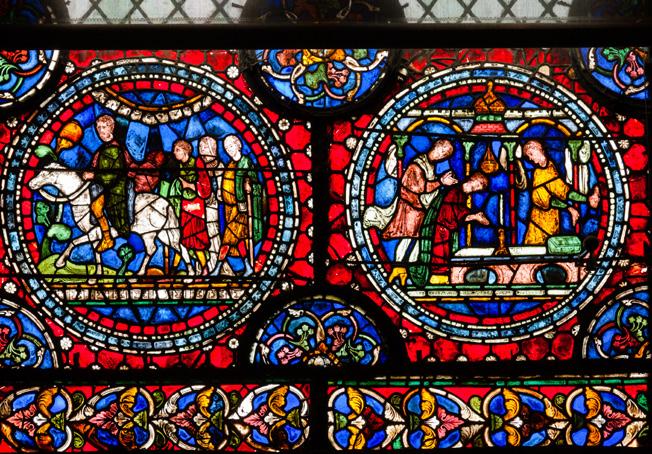

‘Dating from about 1213, the Miracle Windows show ordinary men and women going about their lives, some suffering from physical or mental illnesses, before being cured through divine intervention or benevolence.’
‘An eyewitness account of the event makes chilling reading and would probably have been known to the artist who designed this panel.’




We asked the 2022 Purples what they want to be when they grow up.

I want to be a neuropsychologist.clinical Yes, I am a nerd, but I will have the privilege of reading people’s minds. I hope to do this through studying Psychology at university, then progressing with a masters in Neuropsychology and a PhD in Clinical Psychology. Not to sound creepy, but I am excited to open up a brain. I have always been intrigued about activity in the brain and how this affects human behaviour; most of the time I don’t know what goes on in my brain, so I may as well figure out what goes on in other people’s.
Emma Stewart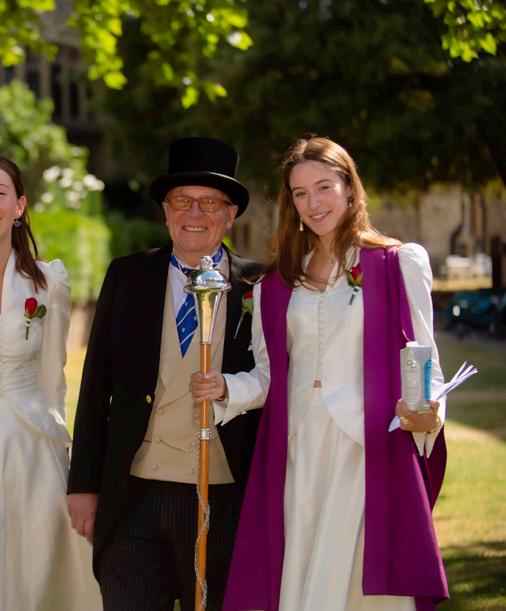
Every morning when I leave the Linacre front door, I think of Nelson walking into that same drive to see Lady Hamilton. I look up at the orange stones in the ruined infirmary, caused by fire in 1174. I step into the Dark Entry and look across at the cathedral water tower; built in the 1160s, it is one of the oldest plumbed water systems in the world. I step onto Green Court. It is a frosty Autumn morning, and I can smell bacon. There is just time for breakfast before my History lesson. I think I may be working too hard.
George PaineI hope that my future self will look back and feel proud of how fully I have lived my life. This starts with a gap year when I will catch up on sleep… no, sorry, I mean do work experience, but also do the fun stuff like travelling, partying and making new friends. I am interested to see where a History degree will take me (I have no clue) but hopefully I will survive uni and then land a good job or possibly go to law school. Then maybe have a family? Or maybe just live with my 10 cats… To be honest, I don’t think the details matter, though, because whatever I do I won’t have any regrets. I will have taken risks and made mistakes but I will be happy knowing that I have experienced everything that I could possibly have wanted.
Anoushka Durham

I want nothing more than to be on the stage. Awaiting decisions for my drama school applications makes me fuelled with excitement for what hopefully may be to come. But, of course, this is a risky plan and a degree in Political Science, for which I have a few offers, gives me an alternative career direction to pursue. Nevertheless, a theatre company that works with primary school children focusing on confidenceboosting and their development is how I want to set up my own business. That is, of course, after my own time in the professional industry, working with like-minded people and creating art. Perhaps my ambition is bigger than reality sees fit!
Daisy LedgerI have chosen to study Physics at university because it is the field that I find most exciting, and it also leaves many doors open for me. There are several career pathways a Physics degree would enable me to pursue, such as Engineering, Computer Science or even Finance. However, continuing with my education after my undergraduate degree and potentially going into academia and research currently appeals to me the most. There are many branches of Physics being researched as it is a very broad subject. My time at university will help me decide what I’m most interested in.
Oluwole DelanoI want to be a Vexillologist (a studier of flags). A Geography degree is only the first step for me; the bulk of my study during my youth shall be via playing Fifa in my room until ungodly hours. This may be a solitary lifestyle, but in the long term it’ll make a heck of a party trick and, who knows, maybe the potential future Mrs. SB will be a flag-follower like me. People often tell me I’m only in it for the money, but it’s more about the history. Flags aren’t just about shapes and colours, you know. Each one has its own meaning. I don’t think I can ever learn enough in this study; flags are ever-changing. However, maybe there will be a day when we are all united under the same flag (hammer and sickle) and I can put my feet up knowing that there is no more for me to learn.
 Nelson Standley Barrow
Nelson Standley Barrow
I want to be a creative when I grow up. Now I know that sounds incredibly abstract and borderline pretentious but ever since I was a very young child, I’ve always found it cool that an idea in someone’s head can materialise into something tangible. I wanted more than anything to be able to do that myself. In keeping with my cringe theme, I believe everyone should follow their dreams because you only get one chance at life. So, I’m taking the most realistic root for me to reach that goal, which is through music. Music is my main passion, and success in music will give me the platform and freedom to convey my thoughts, emotions, and experiences through whatever medium I feel like. And bring in lots of money.
Tobi AderibigbeMy dream is to be at the forefront of innovative veterinary medicine and all of its seismic advances.

Yes, I want to work with animals in the traditional veterinary sense – muddy fields and dirty hands – but
I also want to do more. I am spending the first three months of my gap year on an internship with Chester Zoo, as part of their exotic birds team, and then I am setting off to Southern Africa for the following six months to, hopefully, gain my safari game driver’s licence. I hope to be able to dip my toes into each and every part of the exciting world that is veterinary medicine. So, following my interview for the university of Nottingham, which I hope goes well, I will be starting my journey within a field of science which offers a lifetime of challenge and fulfilment. Ellie
DeanI have applied to study Economics at university. And no, my reasoning doesn’t stem from tucking into countless Economist magazines as a child or stumbling upon the movie Moneyball. It’s much more organic than that. Growing up in Nigeria, I experienced the devastating irony of a country developing quickly but still ridden with issues like mass poverty. For my whole childhood it seemed like the country always took one step forward but two steps backwards. So that’s why I’m striving to become a public finance economist – simply to help the country finally move in one direction.
Kamsi UzombaI’m uncertain of what I want to do. I would love to own by own design house, creating furniture, clothing and everything in between. I would also love to do advertising or work in the creative sectors of large firms. A degree in some area of art or design, after my foundation year, at Central St. Martins is the dream. Earning money for something that I enjoy doing would be pretty insane, being able to afford a multitude of houses in different countries and just keeping up with my own spending habits. But that’s only possible if I can eventually decide what I actually want to do!
 Lili Clifton
Lili Clifton

I want to be a venture capitalist. Yes, in short, I am happy selling my soul for a handsome pay cheque at the end of each month. I am going to Bath University to read Economics, hoping to gain a better understanding of what makes the financial world spin. Perhaps, however, I will have a sudden change of heart, develop a sense of morality or, more likely, the grey drizzly London skies will finally take their toll, in which case I wouldn’t mind jetting off to South America to pursue a career in rugby (and work on my salsa!).
Ludo Kolade

King’s is an awesome place. King’s is a brilliant place. King’s is a big place. But most importantly King’s is not a scary place. King’s may seem scary, but in reality it’s the best place in England.
The teachers aren’t the spawn of Satan (well, some of them are) and you won’t get lost unless you don’t ask other people where something is. Just don’t join any house apart from School House and you’ll be just fine.
The lessons are demanding but fun. Make sure you do every subject so you have a real feel for what you want to do for GCSE and A’ Level. Take a shower every night. Clean your teeth, especially if you eat the same amount of junk food as some of my peers. Clean your desk, change your bedding and go to sleep as early as you can, so you can wake up bright and early.
Do all your homework two days early so you don’t get detention. Organize. Use Teams to the best of your advantage and check your emails ten times a second to make sure you don’t miss any events.

Respect your elders, especially the other years, and make as many good friends as possible. Connections are key at King’s.
Be kind to your matron since she will be the one looking after you when you are ill. Do not do anything that will upset her.
Most importantly, if you feel like what you are doing is wrong, don’t do it.
From LM
The 2022 Shells give advice to prep school pupils who are coming to King’s.
I know you must be really worried about coming to King’s so here are some ideas that, I hope, will calm you nerves. A thing you don’t need to break out about is buying stationery. I remember the anxiety and faff before coming to King’s about having the right equipment, only to realise that they have their own school shop in the social centre (a great place to hang out with friends and meet new people), selling everything from folders to rubbers.
Another thing to note before you come to King’s is reading – which I know you will love – but rather than just focusing on fun easyreaders, try a few classic novels (I promise, this will help). Not only do they make you smarter, but once you get started, they can also be super-enjoyable! If I had to give you a few recommendations, I’d say: Mrs. Dalloway, Jane Eyre, Animal Farm, 1984, Brave New World, All Quiet on the Western Front (which I am not sure is a classic but is great all the same), The Great Gatsby and Dracula (a difficult read but give it a go anyway).
This may sound obvious, but it is still important: don’t forget what you learnt before King’s. The summer holiday is a long time, and it is easy to forget things, but before you come to King’s just flick through your old books (if you haven’t destroyed them first) and refresh your memory.

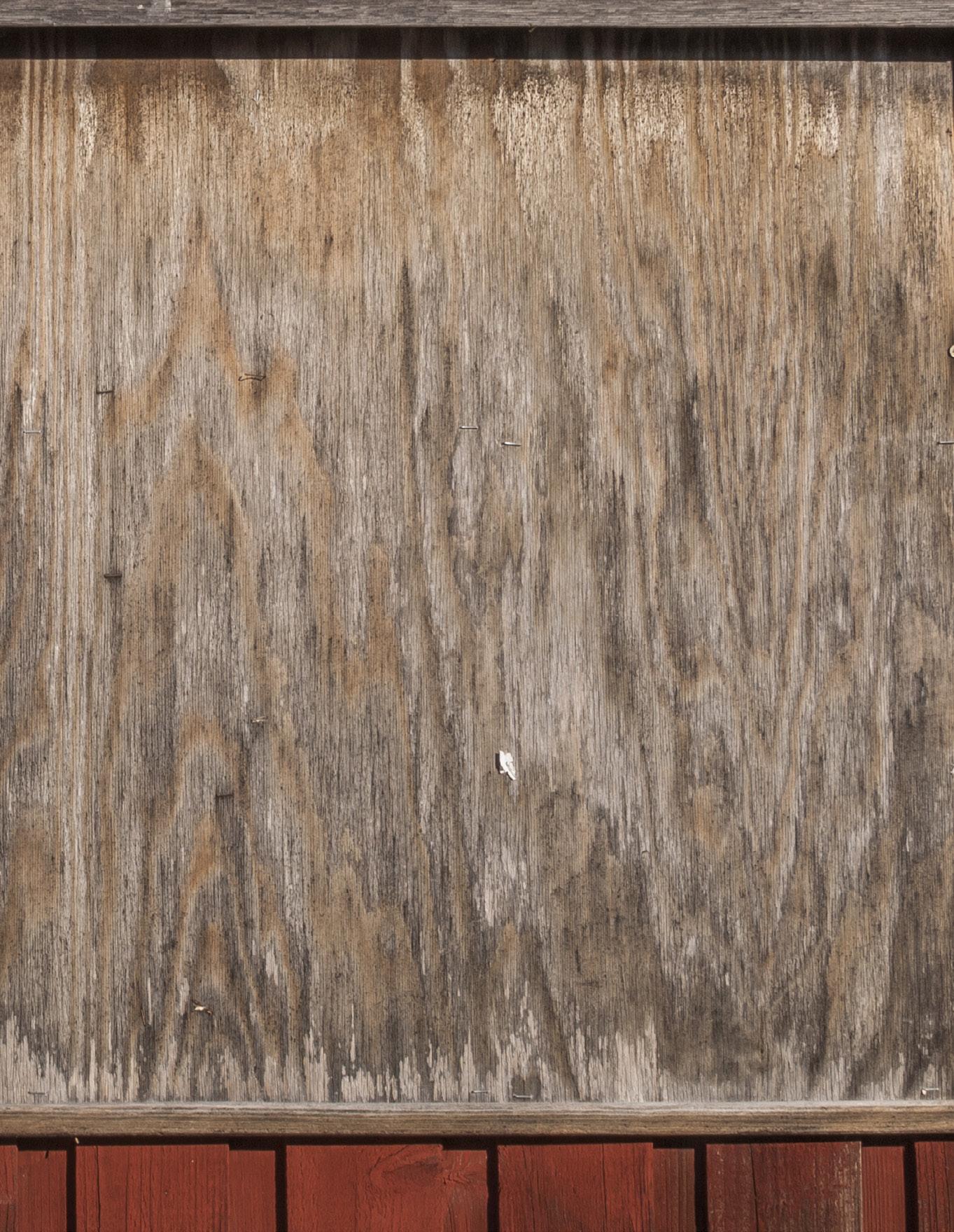
As for some social points: remember to make friends early on, with people in your year, house, classes and especially your dorm (if you are a boarder). Remember you will be spending much of your five years with these people and it is advisable to make a good impression and loyal friendships early on, but don’t focus all of your effort into one person, because if they betray you, leave the school or are ill then there will be no one to turn to because everyone will have already joined other friendship groups. Also, be open-minded. King’s will be a great change, and you need to be prepared for anything thrown at you.
A few more things. Have a notebook to write down reminders. This will help them stick in your mind. Read everything assigned and do everything you are told but don’t forget to relax and enjoy yourself. Finally, it may be useful to join as many clubs and activities as you can. Not only are they fun but they will be useful later on while you develop your interests, and they will also impress your teachers and maybe even your (distant) future university.
Have fun. What is the worst that can happen?
Many thanks, BB

I know that you may be experiencing many different emotions in anticipation of the beginning of your time at King’s. I have been a Shell for little more than a month, but already there are many things I wish I had known before coming here.

First, try not to worry too much. Everyone says this, but it was only when I arrived that I realised it was true; I hate to use such a clichéd metaphor, but everyone is in the same boat. Everyone coming into Shell is guaranteed to be feeling nervous; it is likely that they are worrying about some of the same things you are. This especially applies to boarders if they are nervous about leaving home for the first time. Everyone gets homesick in one way or another, and you’ll probably get over it quite quickly.
One of the biggest things I was worried about is common to many people when beginning a new school: would I make friends? I wish someone had told me that this was not even worth worrying about. As long as you are amiable, kind, and polite, you are practically guaranteed to find someone amongst the approximately one hundred and fifty people in your year who you get along with. If you are boarding, you will automatically become close with the people in your dorm and house. There is always going to be someone you do not particularly like, but very few people at King’s are unashamedly mean. Even if you are worried about this, there are many people you can talk to. Shells have more free time than any other year at King’s, so use this time for trying new things, and seizing every opportunity. You could discover something that you really enjoy. Take advantage of all that’s offered, especially extra-curricular activities.
The older years at King’s practise several slightly unusual traditions, mostly dedicated to making fun of the Shells, but this is all done in good spirit. My advice is just to go along with it – make sure you respect the older years even if you disagree with some of them. They are, however, mostly more than willing to help you with anything.
At some point in the first few weeks of Shell, you will get lost. Because the school is spread out over such a huge campus, it is difficult at first to get your bearings, and it is inevitable that you will be late to some lessons because of this. There will always be people around to direct you.
If you are a boarder, make sure to bring lots of sweets and chocolate; don’t try and be that healthy person who brings mixed nuts and rice cakes if you don’t actually like them. You won’t end up eating them, and instead will have to stick out the first week without sweets before you can go into town and get supplies. Also, make sure you don’t buy long tracksuit bottoms because they’re really annoying and they just trail along the ground (this happened to me).
Try to enjoy it! Or at least get through the first few weeks. These are very busy, so half term arrives very quickly. Of course, none of this advice can truly prepare you for beginning as a Shell at King’s, but hopefully it will ease some of your worries, and reassure you that everyone has felt the same way.
Good luck! HF
Dear New Shell (and the fluttering butterflies in your stomach),

You’ve done it. You’ve made the ultimate decision to join King’s next year. You may be experiencing mixed emotions at this moment. Excitement may be prickling at your fingertips while worry tugs at your heart. It is completely natural to feel this way. This is a huge leap to a future you can’t foresee. Who wouldn’t you be nervous?
I came from Hong Kong, a small, bustling city packed with lights and noise. It had been my home for as long as I could remember. I had never expected to ever say goodbye to it, let alone take such a journey at the age of thirteen to go to school in the UK. Sitting in the plane, I looked down upon the glittering city of Hong Kong. By leaving it, I was also leaving behind everything I knew and loved: friends and family; restaurants I had regularly visited; the local library; everything that had watched me take my first breath of air offered by the sweet world.
There were moments when I wondered what the point of it all was. Why did I abandon the place I loved most, only to be faced with the unknown? Why did I stand there, left with a suitcase of memories, when I could have turned and walked back to familiarity and warmth? Why? Everyone’s been there – the time when you must take risks. I took that risk. My path forwards in life would never have been trodden as sure-footed as it is today, if I had stayed in that tiny city of unfulfilled dreams.
When I first came to King’s, I knew nobody and had no idea where to go. I was worried about making friends, for fear of being judged, excluded, and ignored. After my first few days of school, I realized that I had worried all for nothing. No one will judge you in any way at King’s. In only a matter of time, I was chatting with people of different cultures, nationalities, genders, and interests. We had fun together. Friends are everywhere, just waiting to be found. I was surprised at how friendly and welcoming everyone was to new pupils like me. It’s a nice feeling to be able to exchange smiles with someone passing by, or to receive random compliments that make your day. It’s a feeling of togetherness, clustered in the dining hall, and day and boarding houses. King’s will become like a second home to you in no time.
Don’t worry about not knowing where your next lesson is, or the route back to the main campus – everyone was once new and has experienced the same things that you’re going to. I remember being a little confused about some of the locations of my classes. Whenever I got lost, I would find anyone nearby –older pupils, teachers, members of staff – and ask them for directions. I did feel awkward and embarrassed; it was my third week of school, and I was still getting lost every now and then. If you ever find yourself having these thoughts, just remember that others will understand. No one judges anyone here at King’s. Take your time to remember where everything is. Take notes of it in your timetables and diaries. As well as locations, remind yourself of assignments given to you, and try to use most of the time given at the end of the day to do your prep. As daunting as it may be, the workload is manageable once you get the hang of it.
I am really thrilled that you’ll soon be joining us, and I hope you’re looking forward to it. Do your best, and good luck.

Dear New Shell,
I have been at King’s for a month now, so I thought I would write to encourage you about the coming academic year. If you are like me, you will be forcing the thought of being at a new school next year out of your mind. The truth is, to have some apprehension is natural but let me help you to clear your mind.

If you take any advice on board from this letter, you must take this: buy comfortable shoes and wear them in before coming to King’s. Otherwise, you will get blisters and you will not be able to walk, and that makes things a lot harder. Do yourself a favour and, before the first few days, when you will have tours and be running to and from the right and wrong classrooms, wear your shoes around the house so they become softer. Please.

As a young, new student, with no public exams that loom at the end of the year, it is vital that you keep an open mind. King’s offers an overwhelming myriad of opportunities and, whilst you can, it is astounding the variety of what you can take part in. Whether this is debating or dancing, give it a go. There is nothing to lose from going to an audition for a play or starting a new sport. Take advantage of everything you can, because you will never be at a place like this again.
New people are different. New people are interesting. New people are exciting. New people are not terrifying. Fear of the unknown can be hard to rationalise because, well, you just do not know what you will have to deal with. But, having an open mind, again, is key when you come to your new school. Make an effort with new people and do not prejudge them or their opinions of you. Push yourself to talk to someone different and to make connections all over your year. Just having one introductory conversation with someone can break the ice, and having a friendly face around school will make it easier to feel included.
Sometimes it is easy to forget that everyone wants to help you; no one is ‘out to get you’ and trying to make your life difficult. Ask if you need help with anything: getting lost, prep, lesson timings or music lessons. Everyone at King’s is happy to help and there is no shame in not knowing. But do not worry: you will figure things out much more quickly than you expect.
Now you have some helpful pointers for when you come to King’s, the transition should be smoother. Overall, remember to have an open mind about people and opportunities, and do not worry about not knowing. King’s is an amazing school, so focus on the positive aspects when you join because there are so many.
Best wishes, FB


I don’t want to claim how amazing the school is and how it’s a truly unique experience because honestly, when I was your age, if I read something like that I would immediately think that the student had a gun pointed to their head and was forced to write only generic nice things about the school.
Of course, I am not saying the school isn’t any of those things since, even though at the time of writing I am only half a term into the school, I have changed enormously as a person and have developed new skills, like being organised. But the greatest piece of advice I can give is that, although you may be at the top of your present school and you have all the power over the younger years, don’t let that influence you, because you will be joining a school with hundreds of other pupils and, trust me, you do not want to be the over-confident, insensitive person who talks back to older years. Ultimately what I’m getting at is, be confident but humble. You can be outgoing and make conversation with the older years, but you must remember the boundaries.
Homesickness is a huge problem in boarding school, and though I might not suffer from it, some of my greatest friends, unfortunately, miss their families, their beds, even their siblings. Although I don’t have any cure for this, and you just need to get used to it, I do have to say you have a multitude of people to talk to, whether it be Matron or just someone in your dorm. Personally, I find it very difficult to open up about problems in my life but one aspect of King’s I can truly appreciate is the availability of help from anyone.
The first thing that struck me about King’s is its genuinely interesting teachers. I was even somehow struck by a desire to learn FRENCH VOCAB! Now, of course, all the teachers at King’s are incredible, but the personality of some has truly hit me, making them my favourite teachers. The first not only finds fault with all my essays but can entertain the whole class for a total of three lessons while talking about the first 24 words of a long book, which really makes sure we don’t miss a single detail. In the lessons of the second I love the random tangents we pursue, starting from a 6a quotation like ‘I tell you I feel no emotions at all when I’m reading this’, but also discussing the insane patriarchy of ancient society. The third puts up with my constant lateness to lessons, and constantly forgetting my books.
My first month at King’s has been nothing but charming and enchanting. It is probably the easiest school to fit into because, unlike other schools I know, King’s truly embraces every talent no matter how wild it is. Ultimately what I love so much is the diversity of people. All my friends are so wildly different from me we have nothing in common but just being in the same environment, and this is enough to create the greatest bond. In the end the friends you make here will be your friends forever.
P B-EAre you a writer with novel ambitions? Here is some precious expert advice from A. F. Steadman OKS, author of the Skandar series.
Dear Writers,
As you embark on the tumultuous and rewarding journey of writing a novel of your own, I want to reassure you that every author I know – myself included – finds it challenging. There is a common misconception that writing a book should always be fun and easy, that if you’re not enjoying every second of it – or brimming with endless creativity, or effortlessly writing thousands of words a week – then you are not a true ‘writer’.
But what is a writer, really? For me, it is someone who puts pen to paper – or more likely fingers to keyboard nowadays – and perseveres because they want to tell a story. So much of writing a novel is an exercise in not giving up. When I write my first drafts, I have a daily wordcount. I work out how many words I need to write per day in order to get me to a whole book – in the case of the Skandar books, that’s around 80,000 words – in time to meet my deadline. Some days, I will write 1000 words in an hour without even looking away from my screen; on other days, it takes me five hours to write 100 words. I know that doesn’t sound very magical or romantic, but that’s what works for me.
Of course, that doesn’t mean I don’t run into problems on my way through the novel itself. And as you start your own books, I want to give you some advice that covers some obstacles writers face throughout the drafting process.

One of the most common worries when you start out on a novel is that your idea is not good enough for you to begin writing. A good piece of advice another author gave me is to try out the idea in a short story. Pick one aspect of the idea, or a character, or a single scene, and test it out. When you’ve written the short story, ask yourself whether you wanted to keep writing. Did it feel like there was more to be explored? If the answer to those questions is yes, then your worries about the idea are probably unfounded.
On the other hand, if you feel like the idea needs more development, then there’s plenty of ways to find inspiration. Listen to music – perhaps make a playlist to help you develop the world of the story or a particular character. Watch films or television series that cover similar ground to the idea you are thinking about. And of course, read books. Many writers struggle to write when they’re not reading, and I think that makes a lot of sense. It can be fiction, poetry, non-fiction, plays – anything. This will all help fill up your creative well and get your imagination flowing.
Once you’re happy with your idea and ready to start writing, your next challenge will raise its scary head: the blank page. This is the moment when you are staring at the white paper or computer screen and there is nothing on it. Not one word. You might type a sentence and then delete it immediately. It
‘What is a writer, really? For me, it is someone who puts pen to paper – or more likely fingers to keyboard nowadays – and perseveres because they want to tell a story.’
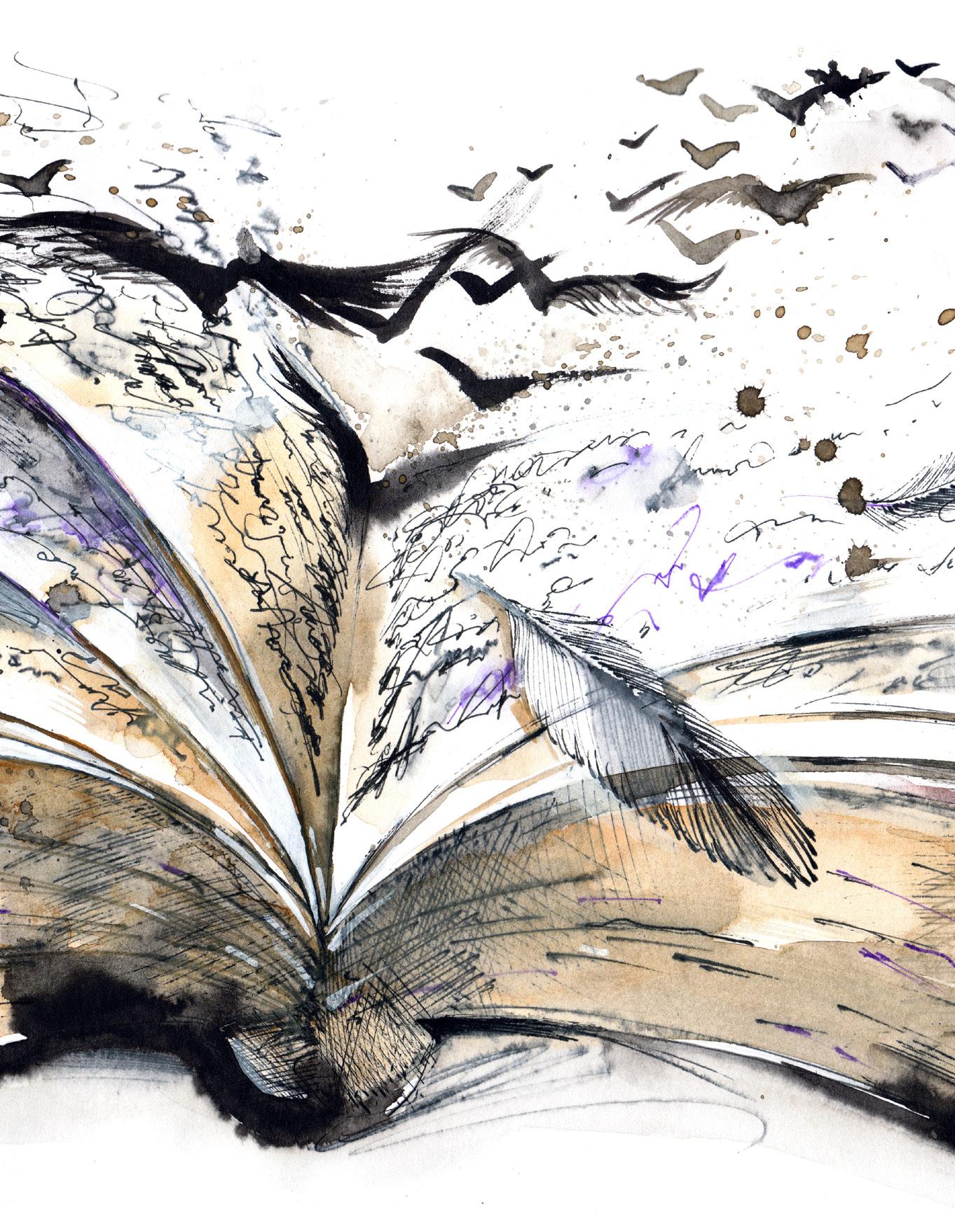
feels impossible that you will ever fill one page up, let alone three hundred. If you are encountering this problem, you are not alone. I have found that one way to overcome it is to plan out your novel. I’ll be honest and tell you I didn’t really plan my first book, Skandar and the Unicorn Thief. But as the series has gone on, I have made increasingly detailed chapter plans. Outlines can be as vague or as fleshed out as you like – some of mine are one line for a whole chapter; others are bullet points for almost every scene. Plans give you direction when you feel unsure of what is going to come next. They help you see the shape of the whole novel. But they are not for everyone or every book. An alternative way of combatting the blank page problem is to write out of order. I know some authors who write the end of the book first and
notebooks,

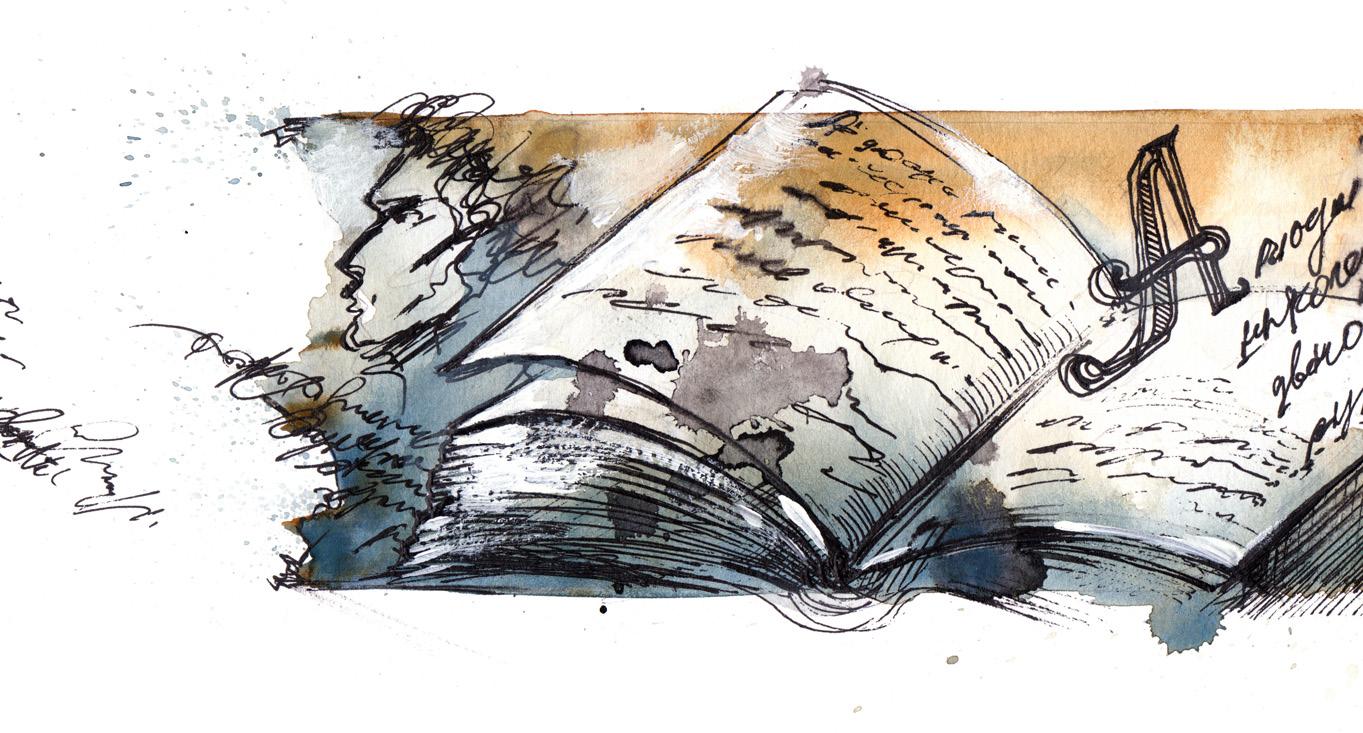
computer files
one third
then work their way up to it; I know others who write a collection of different scenes from different parts of the story in separate word documents and then splice them all together. Do what works for you.
At just over one third of the way through the novel, you are going to panic. I can almost guarantee you this. My theory is that this is the last point when you can turn back and start again. There are many words on the page already, and many more to go, and this is the stage you will ask yourself – is it worth it? Is it worth writing this story to the end? My best advice here is to try to keep going. Sometimes I wonder how many outstanding novels there are out there – in notebooks, in computer files – that are only one third

‘Sometimes I wonder how many outstanding novels there are out there – in
in
– that are only
written. Don’t let yours be one of those.’
‘This is the stage you will ask yourself – is it worth it? Is it worth writing this story to the end?’
written. Don’t let yours be one of those. Keep writing, even if you only manage one hundred words a day in your lunch break. Don’t stop. Don’t look back. Don’t delete.
When you get to the end you are going to think it’s a pile of rubbish. Everybody does. It’s not – but this is how you’ll feel. I think it has something to do with the fact you cannot read all of your book at once, you cannot see what you’ve written, and when you write that final sentence, the anxieties set in and make you forget all the good work you’ve done. Take a deep breath. Don’t read it straight away. Take a couple of weeks off from the whole thing, maybe even three if you have time. I promise you that when you come back to the novel you’ll impress yourself, you’ll surprise yourself – and you might even love what you’ve written.

One last thing to remember is that when you’re writing a first draft there really aren’t any rules. You just need to end up with a whole book –nobody needs to see how you got there. The books that you read in your lessons, or you buy from a bookshop, or find in a library, went through this whole process (and more!) before ending up on a shelf. Most writers wouldn’t want you to see their first draft, so don’t compare yourself to their finished work. Write the story you want to write, and I promise it will be worth it.
Wishing you the very best of luck on your novel-writing journey.
Yours sincerely, A. F. Steadman (2005-2010, MR)
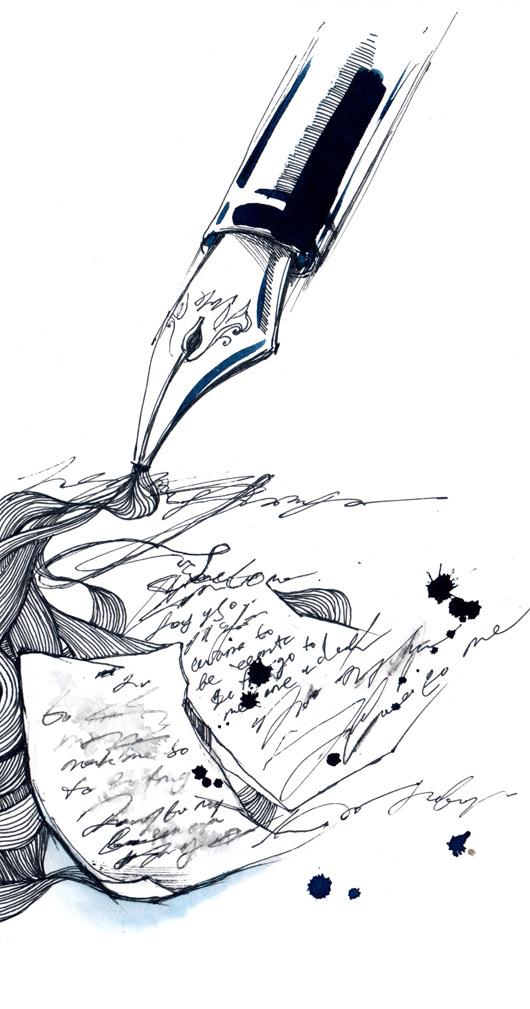

‘Write the story you want to write, and I promise it will be worth it.’
A. F. Steadman grew up in the Kent countryside, getting lost in fantasy worlds and scribbling stories in notebooks. Before focusing on writing, she worked in Law, until she realized that there wasn’t nearly enough magic involved. She is the author of the New York Times bestselling Skandar series.


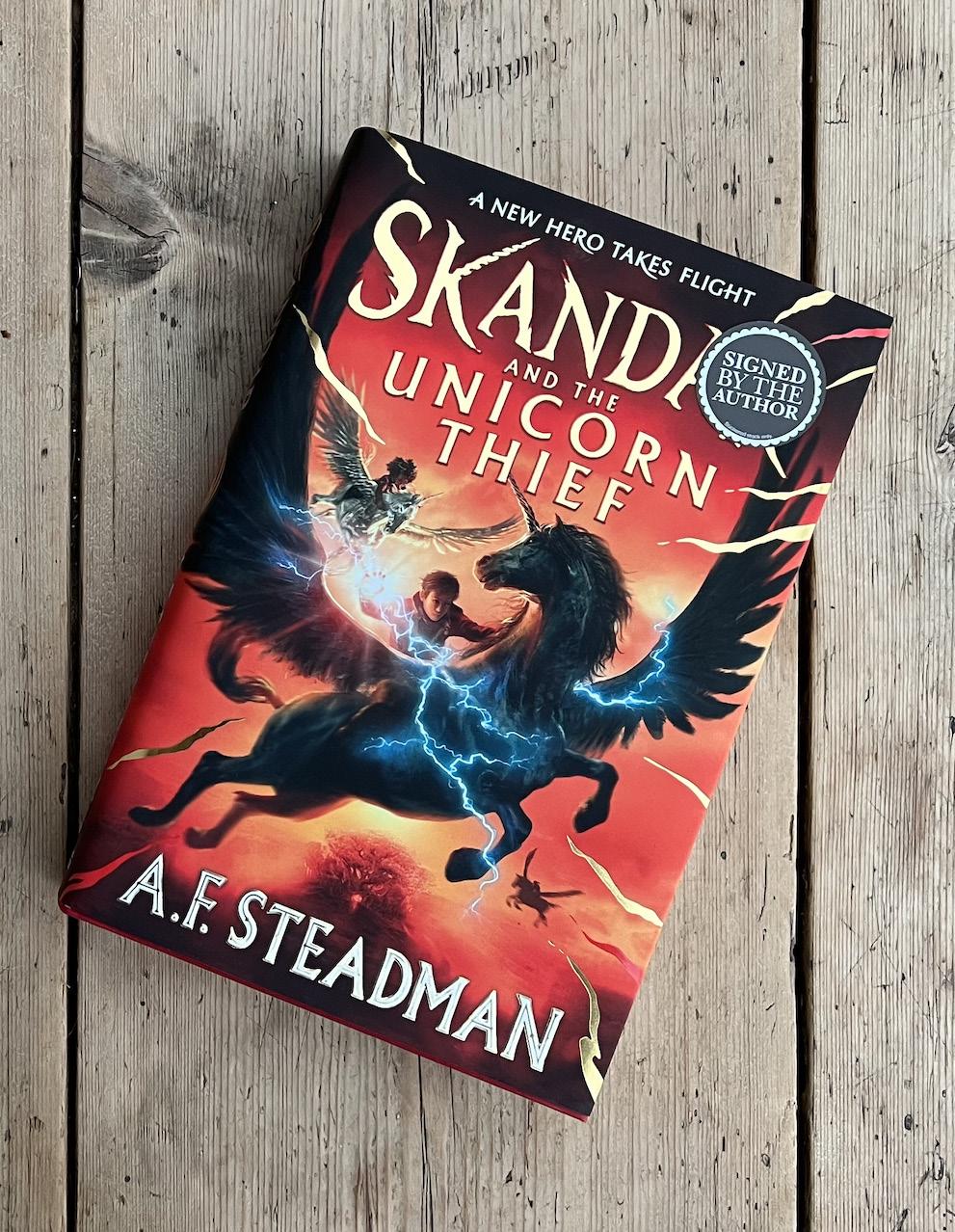

Ateacher of mine once quoted Krishnamurti, who said, ‘It is no measure of health to be well adjusted to a sick society.’ This claim remained at the back of my mind for the next ten years, but it was only when I became a mother that I really understood the truth it tells.
No facet of Western society is sicker than the way we raise our children. We have become far detached from the biological and physiological needs both of children and mothers, and this detachment has become so ingrained in our culture that nobody questions it any more.
My generation has abysmal mental health. We abuse drugs and alcohol at an ever-increasing rate and our attention spans are shrinking decade by decade, but we fall into the same parenting patterns and make the same mistakes our parents made. Against those who do ask questions, we defend our decisions by saying, ‘Well, my parents did (x-y-z) and I turned out fine.’ To me, questioning whether I really was fine is a process I felt I owed my children.
In the UK, despite being a firstworld country with free healthcare, we have the lowest breastfeeding rates in the world. It is normal, even despite all our knowledge of attachment theory, to leave our newborn babies to cry in a room alone to ‘teach them independence’. The separation of mother and baby begins in utero. Formula companies sponsor maternity units. Dummies and bottles are given in welcome packs. We are told to buy formula ‘just in case’. Women are encouraged to breastfeed initially but as soon as the child is six months old, they are told they need to stop, that it’s somehow wrong or perverse, despite the World Health Organisation recommending feeding to ‘age two and beyond’ and the global average age of weaning from the breast being four and a half years.
Our health professionals receive only two hours of breastfeeding training, despite UNICEF estimating that even a moderate increase in breastfeeding rates could save the NHS a minimum of £40 million a year in protection against disease, not considering that the chances of breast, ovarian and uterine cancer in the mother decrease with breastfeeding duration. But in a culture where we tell parents ‘Fed is best’ to save both their feelings and the effort of providing adequate support, our rates are not going to improve. Fed is the bare minimum, so why can we not strive for better?
We are afraid of offending people, afraid to break generational patterns, but we might have to admit our parents could have done better if we are to encourage something that clearly has not only health and financial but also psychological benefits. This is not to say formula is not a worthy substitute in circumstances where breastfeeding genuinely isn’t available, but it should be offered on prescription, for free, thus removing the competitive advertising that is so capable of damaging the confidence and conviction within the breastfeeding relationship.
If feeding is the most contentious aspect of parenthood, then sleep is a close second. We are told we must put our children on a separate sleep surface, preferably in their own room, to protect them from suffocation and sudden infant death syndrome (SIDS). But in many other cultures there is no term for bedsharing or cosleeping; it’s just called ‘sleeping’. In Japan, where SIDS rates are the lowest in the world, it is the norm for children and parents to sleep on the same surface until the child decides otherwise, usually around ten years old.
In the UK, however, we go further than just putting young babies in cots in separate rooms. After nine months of being lulled to sleep in the safe, warm

Briony Cobb OKS (2009-13,
, who is training to become a doula, explains the right way to nurture a child.
‘In the UK, despite being a first-world country with free healthcare, we have the lowest breastfeeding rates in the world.’
environment of the mother’s uterus, babies don’t like being put in their own room, so they cry. But instead of responding to our crying children, our culture tells us to leave them to cry because they are manipulating us, despite not having developed the part of the brain responsible for manipulation until the age of three. It doesn’t consider why babies wake up – to keep themselves alive, regulate their own breathing through their parents (the reason we are designed to sleep close) and protect themselves from SIDS, which used to be called ‘cot death’ for a reason. The sleep-training lobby is now a multi-million-pound industry. It is also completely unregulated, which means that anyone can call themselves a ‘sleep coach’ and extort hundreds of pounds from exhausted parents by telling them they must go against the instinct that kept our species alive for hundreds of millennia and let babies scream until their systems go into shutdown and they stop crying to conserve energy.
Parents who leave their children to cry out will defend themselves by claiming there’s no evidence it’s dangerous, but the reason there is no direct evidence is because no ethics committee will pass a study that allows babies to ‘cry it out’ on the grounds that this could irrevocably harm attachment. Dr. James McKenna, a world expert in safe infant sleep, has a clear view: ‘Euro-American care practices and our infants’ ability to accommodate these practices suggest that we are pushing infant and maternal adaptability too far, with deleterious consequences for short-term survival and long-term health.’

When a mother breastfeeds and bedshares with her child, nobody makes any money, and the government takes no taxes. The culture needs to push back and change, but bad practice is so ingrained, and new parents are so vulnerable, exhausted and loaded with new hormones, that without policy change it’s unlikely this will happen. Policy change rarely happens when there’s no economic benefit.
‘‘Anyone can call themselves a ‘sleep coach’ and extort hundreds of pounds from exhausted parents.’’
The way we raise our children in the West is based on a cultural narrative fulfilling the needs not of our children but of patriarchal, white supremacist colonial capitalism or, as trauma therapist Kelly McDaniel says in her book, Mother Hunger, the ‘misogynistic and patriarchal life forces that disempower women’.

Given the state of the Western world these days I wouldn’t trust them with my dirty laundry, let alone the mental and physical well-being of my child. I trust instincts that have kept our species alive for a quarter of a million years. They seem to work.

‘Our culture tells us to leave them to cry because they are manipulating us, despite not having developed the part of the brain responsible for manipulation.’
 Images: Briony Cobb - @bri_and_alf
Images: Briony Cobb - @bri_and_alf

Like the work of the great Greek poet, Pindar, the life of Peter Pinder OKS (1966-69, GL) celebrates the fruitful ups and downs of life and the stubborn genius of the mind’s eye. For more than 50 years now, Peter has lived on his creative wits and self-taught craftsmanship, and this is his tale.

Ihave fond memories of King’s. It was a refreshing change from my prep school, which was more like a Dickens boot camp. The freedom to buy chocolate was one of my first reliefs. And being allowed to bicycle anywhere we wanted.
On the academic side I was hopeless. I still have my report cards from 1966-69. I managed to be bottom in 80% of subjects, and was continuously on Satis, so I had to report to the Headmaster, Canon Newell, all the time. We got to know each other quite well.
I only realized later in life that there was a word for me. It wasn’t ‘thick’; it was ‘dyslexic’. I couldn’t read properly, amongst other things. I remember having to read out loud when it was my turn during evening prayers. The anxiety would build up days beforehand. And when the time came for me to read ‘The road to Damascus’, I started ‘The road to Domestos’. The roars of laughter continued while I stumbled through the rest.
What I did enjoy most at King’s was the carpentry shop, The Caxton Society and the art classes. But by the time O’ Levels came I only passed three, so I was doomed to repeat the Fifth Form. I called my father and told him I wanted to leave King’s and do something else. He was only too happy since he felt he was wasting his money on me. Asked what I planned to do, I had no idea, but told him Engineering.

‘‘When the time came for me to read ‘The road to Damascus’, I started ‘The road to Domestos’. The roars of laughter continued while I stumbled through the rest.’’
I then applied as an apprentice at Dennis Brothers in Guildford, who made fire engines, garbage trucks and other specialized vehicles. They first sent me to a government school that trained you on machines, and workshop processes, while you made your own tools. While receiving a salary from Dennis Brothers I had finally found something rewarding that I was good at. After a year I had to go to the factory and spend a few days in each department, then do six months on the chassis, installing the hydraulic brakes. After two months of this repetitive work, I quit. My mother was furious. I was 17 years old.
The one subject I wasn’t too bad at was Divinity, under Mr. Gollop. He always liked to pick on me in class. And since our class started just after recess, a lot of us were still eating snacks. If he caught you, he’d confiscate the food and eat it himself. So, one day I went to the Joke Shop, just outside the Mint Yard Gate, and bought some very spicy joke jellybeans. I pretend to eat one. He confiscates them. And eats one. Glaring, his face reddens, and he improvises a quick quiz, throwing a jellybean for each right answer. That didn’t go down too well.

So, with £200, a passport and a sleeping bag, I planned to visit my father in Switzerland, where he worked. While I was hitchhiking, it started raining, and when a truck stopped to pick me up, the driver asked me where I was going, and I told him Australia. He said he wasn’t going that far. But in my mind I was. And 13 months later, having passed through many exotic countries, with many stories to tell, I arrived in Darwin, the backdoor to Australia. I had no money left, nor any shoes, just a sarong and a Balinese T-shirt. Within an hour I got myself a job washing cars. After a few days I could feed myself and afford some shorts and flip-flops to blend in with the local mob. I also adjusted my public school accent to the Aussie twang, so I could get a job digging ditches in 100 degrees of heat.

Leaving Darwin, I hitchhiked around Australia, picking up odd jobs as I went. I ended up with a reasonable salary working in a gold, copper, and bismuth mine doing the assay. The mine was in the middle of nowhere, and I spent nine months saving up money. In the small hut they provided for accommodation, someone had left a Philippine Airline poster featuring a very attractive airhostess.
Knowing nothing about the Philippines, I arrived in 1972. And fell in love with the place. I met lots of very nice people and took a course in TV production as an excuse to stay longer and do something. But when Martial Law was declared, all TV and Media were closed down, so I returned to Darwin and got a job in the YMCA where they sent me 200 miles into the bush to start a YMCA with the Aboriginal tribes. I was my own boss. Since the YMCA had been sponsored by the government, they gave me an open shopping list of what I wanted: pick-up truck, a
small dingy with an outboard motor, film projectors, band equipment, trampolines, roller skates, and all the gymnastic equipment (since I used to be a gymnast) and all the art materials I could think of, including leather tools and jewelry-making stuff. And with more than 100 aboriginal children to do things with, I first learned how to do things, and then taught the children. We did batik, silk-screening, pottery, sculpture, painting and so on. The one thing I got a passion for was leather tooling. But the kids were a little impatient so I made them a gig they could use to make a belt for themselves in 30 minutes.
I would also take small groups out to far-away beaches where we would camp for a few days. They would go hunting and fishing the way their fathers had taught them, and we’d sleep in the sand around a fire. For two years I was having fun, and making more fun. For a Christmas break, and to report back to my bosses, I flew to Darwin, but on Christmas Eve 1974 Darwin was devastated by Cyclone Tracy and I had to resign my job in Maningrida.
I headed back to the Phillipines in 1975. And since then I have never left. I settled in Baguio, a town four hours north of Manila, 1500 metres up in the mountains. Not too hot, not too cold. It was established by the Americans at the beginning of the last century, a tribal area unconquered by the Spanish, where the Igorot tribes live. From them I first learned woodcarving, while I continued my leather tooling skills making all sorts of things with local designs inspired by the Igorot people. I put up a shop, and was commissioned by the Hyatt Hotel, who were building a hotel here, to do a tavern in tooled and painted leather. Soon after that, one of my bag designs got a big hit on the international
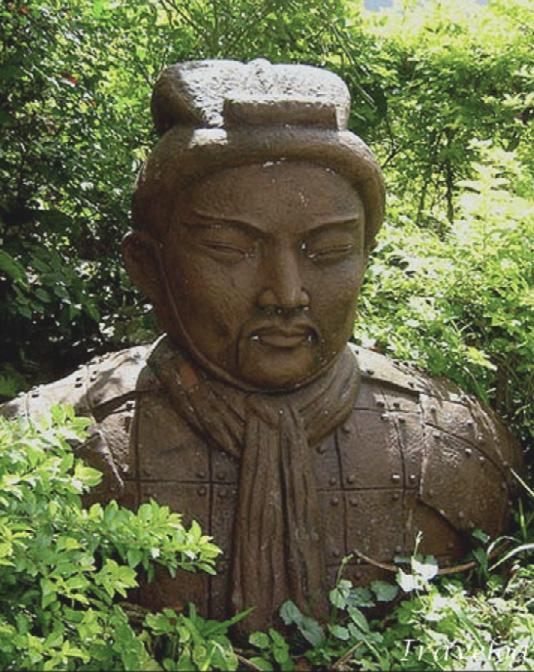
‘‘My latest work, which now hangs over one of the dining tables in the restaurant, is a diorama called ‘One Late Afternoon at Leonardo’s’, which is a whole story in itself. ’’

fashion market, and so I set up a small factory, and was able to buy land and build a house. I had three children already. I put up a shop in the Hyatt Hotel, making all sorts of things in leather, wood, fibreglass and combinations of them all, until 1990, when a 7.9 earthquake devastated Baguio, including the Hyatt Hotel.


By that time my Disco bags were already out of fashion, so I supplied the big department stores in Manila with all sorts of other things. It was quite tiresome having to go there every month. In 2008 I was thinking of something unique to sell in Baguio. And since Filipinos love trophies, and have a display corner in almost every household, I started carving small Igorot figures, doing their tribal dances and rituals, and made them into trophies. With a small collection, I made a flyer and gave them to schools, government offices, golf clubs, local festivals and various companies. They were an instant hit for the local market that usually got rather tacky shop-bought, mass-produced trophies. My range expanded fast as the market demanded custom designs, until 2020, when the pandemic hit. Lockdowns and all the events needing trophies stopped. So, with some of my workers, I built a bamboo house with bamboo from my son’s bamboo plantation. It gave me time to make things for the interior, ideas I’d had for a long time, but never found time for. After about a year building it, some wandering blogger posted it on the internet, and thus we got inundated with the curious. My wife Ella
thought of making it into a restaurant, aptly named Pinderella’s Kitchen. It now has many short videos on You Tube.
In 2022 my trophy business resumed fullspeed, with trained staff doing most of the work, which now leaves me time to have fun with whatever my dyslexic mind dreams up. My latest work, which now hangs over one of the dining tables in the restaurant, is a diorama called ‘One Late Afternoon at Leonardo’s’, which is a whole story in itself. The Mad Hatter’s Tea Party in the foreground, with da Vinci behind, painting himself in the mirror, while on the other side is Michelangelo, Leonardo’s former boyfriend, repairing the statue of his new boyfriend, Tommaso dei Cavalieri, which he called David. Out on the balcony at the back is Jesus and the Disciples having cocktails before supper.

Over the years I have made thousands of things. Some were hits; some were not. I even made a car out of a junked VW 1600. Copying a Hummer design made in fibreglass, half a Hummer and half a Bug, I aptly named it Bugger. Some of the other things I have made can be found on Google.


‘In 2022 my trophy business resumed fullspeed, with trained staff doing most of the work, which now leaves me time to have fun with whatever my dyslexic mind dreams up.’Two Aboriginal boys on Peter’s Belt-o-matic. The Baguio City Hall. A trophy depicting an Igorot dance. Bugger.

Isuppose the question is, how does someone who leaves grammar school in 1981 with a basic set of O’ and A’ levels, and who doesn’t go to university (well, actually, I was aiming at Portsmouth Polytechnic at one point), end up as Capital Projects Director at King’s, looking after, at this precise moment in time, the Mint Yard Science Development Project? A clue is in the title: by grafting!
My working career now spans over forty-one years, with only one week of voluntary ‘redundancy’ (between jobs) and encompassing only three employers, albeit one of them twice – King’s. It has been built almost entirely on graft plus basic ability, an accumulation of professional qualifications post-school, the acquisition of work-specific knowledge and, of course, some luck along the way.
My first piece of luck was sitting an aptitude test at an insurance company HQ in Gloucester when applying, with pressure from my father, who worked in the insurance industry, for an A’-Level trainee scheme. It turned out I had seen the aptitude test before in the form of a Christmas newspaper
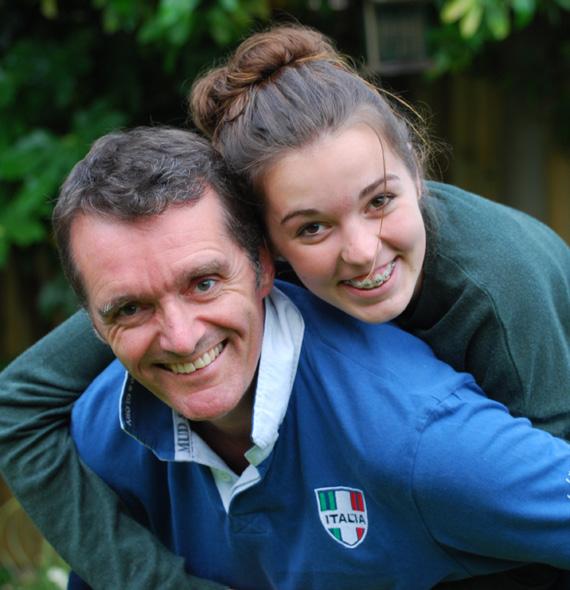
quiz section only a couple of months back, so I was well placed to answer all of the questions!
I passed the aptitude test and started work in September 1981. I didn’t immediately warm to the professional exams that I was supposed to take, and ended up taking nine years to complete what others did in three, but I followed that up by motivating myself to undertake an additional qualification relating to my role as a risk control and property surveyor. That role had come about through hard work and determination to get out of the office and onto the road, which I managed at the age of 22, when at that stage the youngest surveyor in the company was 30. Hard work in the office, hard work on the road, covering thousands of miles and carrying out far more surveys than was expected, eventually led me to the role of Assistant Chief Surveyor at the age of 28. I had managed to impress enough people with my work ethic that I was entrusted with this position, ahead of those with more years of experience in the tank.


Gavin Merryweather, Capital Projects Director at King’s, reflects on a career built on what he calls ‘limited talent and hard graft’.
‘I had managed to impress enough people with my work ethic that I was entrusted with this position, ahead of those with more years of experience in the tank.’Iron Man, Zurich 2008. Gavin larking about with one of his daughters.
But it was the arrival of my two children that switched my focus from endless travelling and staying away from home to a desire to engage somewhere where I could see through a body of work and make a tangible mark from my efforts. But how to transition? Well, hard graft did it again, as I had been surveying independent schools (including King’s) for over ten years and it was an environment in which I was comfortable, but how to find a role?

That involved, in late 1990s, before the internet and Google, hours on a weekend in the public library writing out the names and addresses of schools across the country, followed by sending out about 350 letters to Bursars across the country which led, in relatively short order, to my first role at King’s as Domestic Bursar, although technically I was the Estates Bursar. I arrived one month before the completion of Harvey House in 1998 and that was certainly being thrown in at the deep end.
The transition was swift, the learning curve almost vertical, and in carving out a new post within the school there was a huge amount to do – that has not changed to this day but it is now someone else’s role, mine now being confined to the ’glamorous’ end of Estates Management, i.e. new buildings and significant refurbishments. I had to learn on the job, and learnt from those around me, my peers in other schools, and undertook additional selfmotivated professional studies and a qualification. Once again, determination and hard work helped
me build (literally in the case of the new Pavilion at Birley’s and New Grange) a career in a discipline that I came to enjoy immensely. Highlights of that period, as well as remodelling and re-focusing the Estates Department, included the total refurbishment of Broughton House over two summer holiday periods, the construction of the aforementioned new Pavilion at Birley’s and New Grange, as well as the creation of the Music School in Old Grange and the remodelling of boarding at JKS. The range and breadth of that role was and is staggering, and is the same today. From new building and refurbishments, the day-today maintenance of facilities and the servicing and maintenance of plant and equipment, to name but a few examples, through to dripping taps, slipped tiles and requests for redecorating, it is utterly endless.
So my role is about the here and now, being the school’s representative on the professional team involved in buildings and development, which means that I am also responsible for delivery, programming, budgetary control, ensuring that key decisions are tabled and taken in a timely manner and the all-important health and safety aspects of building in the middle of a busy site – but it is also about looking ahead and assisting the school’s Leadership Team with forward masterplanning of
‘I found a course on the internet, fully immersed myself in a 24-week structured training programme, and in July 2008 I raced at Ironman Switzerland in Zurich.’


‘The transition was swift, the learning curve almost vertical, and in carving out a new post within the school there was a huge amount to do.’Gavin and family.
next part of
career is, in the immediate sense, to see the successful completion of the new Science building and refurbishment of Parry Hall.’


the estate. Using knowledge about the estate, meshed in with the school’s vision for facilities, and supported by knowledge and understanding of planning and, because this is Canterbury, archaeology, I play a key role in advising, assisting, occasionally driving and shaping, and ultimately delivering what the school needs, to maintain its position as a leading coeducational boarding school. All based on hard graft.
A short sporting aside about limited talent and hard graft: in 2003, when I turned 40, I went, with three old school friends, to a sports complex hotel for a holiday during the course of which I undertook a mini-triathlon. I was not really a swimmer, but could ride a bike and run, and the moment I eventually crossed the finish line I was hooked! I came home, bought a road bike and ,some basic gear and started ‘training’. Various short distance races came and went, and I loved the fact that, being rather average at swimming but a bit above average on the bike and on the run meant that I was, for the first time in my sporting life, ‘above average’ at something, which essentially meant that I would finish about one-third down the list of finishers in most
‘I play a key role in advising, assisting, occasionally driving and shaping and ultimately delivering what the school needs, to maintain its position as a leading co-educational boarding school.’
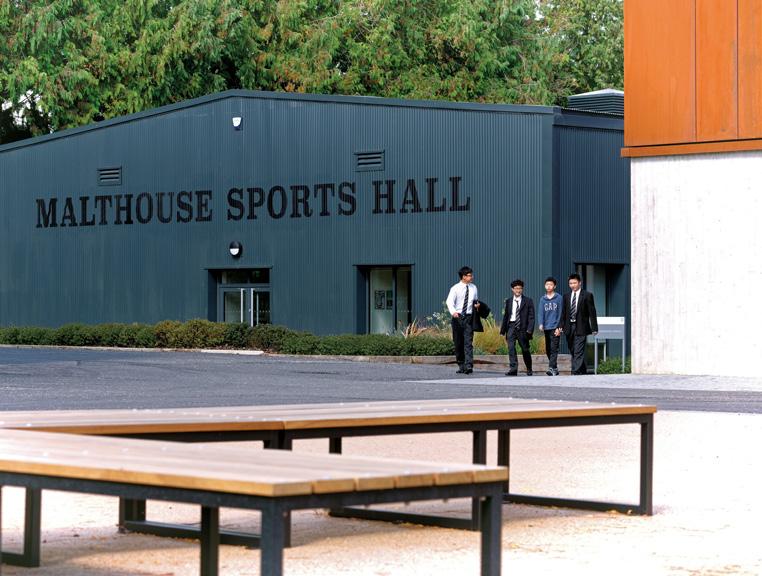
races that I entered. I grafted at my new-found passion, raced around the UK and in San Francisco (N.B. it is possible to swim from Alcatraz to the mainland but only in a suitable wetsuit because the water is really cold!), and eventually there was only one elephant in the room – the Ironman Triathlon. I found a training course on the internet, fully immersed myself in the 24-week structured programme, and in July 2008 I raced at Ironman Switzerland in Zurich where I finished (in just under 11½ hours), true to form, 749th out of 2250 starters. It was, and will always be, the highlight of my sporting life, based upon having a goal and being prepared to graft for it. If I could do it, so can anyone.
The next part of my career is, in the immediate sense, to see the successful completion of the new Science building and refurbishment of Parry Hall on programme (revised in the case of the former) and on budget. After that, other plans are already set and other masterplanning discussions are being held, but I also expect to begin to transition into retirement where a whole list of pleasurable activities await, just as soon as I have the time. Whatever they are, I know I’ll graft!
‘The
my
It is the end of the teaching day, and I am wrapping up some work, sitting under the rafters at the top of the Music School. Suddenly, the traffic noise drifting up from the King’s Mile and the cooing of several pigeons sitting on the nearby roof are eclipsed by a mesmeric toll, a myriad of metallic colours rippling outwards from the hefty weight of ancient bronze pealing through the softening evening air.
Sonically speaking, it is my favourite time of day: the Cathedral bell is tolling for Evensong. I am drawn to the open window, and for some moments I let the sound wash over me. Soon, though, I hurry to the piano, keen to work out the pitch of the bell – not straightforward, thanks to the wonderfully various harmonics complicating the peal. With a collection of notes through which to calibrate the sound now clearer in my mind, I am back at the window. The cogs are whirring, and I feel a sense of determined focus, threaded with joy: I have started a composition.
Music Composition forms a significant part of my life at King’s. Most pupils in the school know me as the person on the piano in Assemblies, providing a musical scaffold for Mr. Bersey’s quality banter at Congers every Friday. But my main role in the classroom is as the Composition teacher. I feel fortunate in this; I have never published anything, nor do I have a vast library of Roy works on my shelf, but I absolutely love writing music.

So, what is it like to compose a piece of music? Any of my Composition pupils could tell you that compositional inspiration does not always strike as serendipitously as I describe above. Crafting a piece of music can be a hard slog, and it is an art form with peculiar idiosyncrasies. A composer is planning a piece of art that will exist fleetingly in a future moment, vibrations that are heard and gone in a blink. Of course, part of the fun is imagining this musical future. I find that a composition lives very prominently in my head for the duration of the creative period, while I hold the various strands of the texture together in my mind. This process demands my attention, rendering me distracted and prone to faroff looks. When I announce to my husband that I have started a new composition, there is a note of seasoned resignation in his
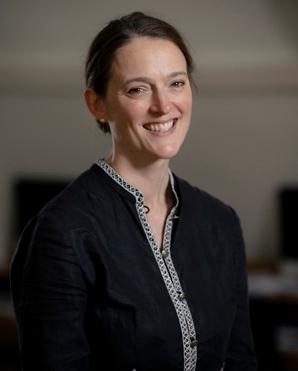
kindly response, since my family knows that I will not be quite ‘present’ for a while, solving harmonic conundrums whilst boiling the kettle, or pacing out transition sections when walking the dog.
I am definitely not recommending it to school-aged composers (their HsMs would be on my case if I did), but the most productive hours for me tend to be from about 10pm until midnight, when the house is still, I feel excused from all the pressing jobs of the day, and I can sit in quiet, benign solitude under a pool of lamplight at my desk – piano on my left, computer on my right. Although inspiration can spring from any number of triggers (maybe a text, an occasion, or a sound such as that of the Great Dunstan bell), I can only get so far with it before I wish to run ideas through at the piano. The keyboard is a very tangible map of harmony and tonality. I feel lucky as a composer to be a pianist. Piano spacings and timbres run through my writing on all sorts of levels, even if I am writing for voices. Indeed, my favoured compositional genre is choral, partly because I have spent a lot of time singing in choirs, but also because I love the functionality of writing for voices. Liturgical texts require music if they are to be sung. I find this to be an immediate source of inspiration, and I am grateful that Will Bersey, Nick Todd and the Crypt Choir occasionally grant me the benefit of their immense talents in performing my compositions.
The sounds that I ‘harvested’ from the Evensong bell became the Sanctus for a Mass that I wrote last year to mark the retirement of Peter Roberts from his role as Headmaster. Peter was an extremely kind, enthusiastic and active patron of Music at King’s. I wished to say thank you. He also seemed woven into the traditions and uniqueness of King’s as a place, and from the overwhelming sonic effect of that
bell came to me the idea to base each movement of a valedictory Mass setting on one of the sounds that Peter might associate with the fabric of King’s. I sat in the garden of Old Grange, scribbling down snatches of birdsong (written into the Gloria) and a woodpigeon’s tuneful call (now the Agnus Dei). Even the distant hum of a summer lawnmower found its way into the bass parts as a soothing drone. There was an embarrassment of riches, really; writing the music was very satisfying.
Over the years, the compositional process has become a place of solace for me. I retreat into the notes when life brings me difficult chores. Both the passages that I have captured with relief on the page before they could melt away, and also those parts that I have yet to fix: both bring me joy. Wishing such joy upon others, here follows my advice to anyone who would like to write a piece of music, whether the exam board requires it of them or not:
First, remember that you have as much right to be a composer as anyone else. When I arrived

at university, I was intimidated by the very clever people around me who counted themselves as serious ‘composers’, a title imbued with as much esoteric mystery and exclusivity as those bestowed on Tolkien’s colourful wizards. It has taken me decades to allow myself the thought that I might be someone who writes music, and I still experience imposter syndrome on the rare occasions that I hear myself referred to as a ‘composer’. Nevertheless, I wrote the notes. If you write something, that music belongs to you, and you become a composer. Own it.
Second, be prepared to dislike your work, perhaps for a significant part of the creative process. I always tell my classes that you can’t edit a blank page. I love the fact that Beethoven’s original manuscript scores are riddled with angry crossings-out. Glorious music is often the result of unhappy struggles and happy accidents, unless you are Mozart, in which case it springs entire and miraculous from your lofty genius. But did Mozart ever experience the triumph that comes from finally working out how to get from one awkward
‘‘My family knows that I will not be quite ‘present’ for a while, solving harmonic conundrums whilst boiling the kettle, or pacing out transition sections when walking the dog.’’
‘Over the years, the compositional process has become a place of solace for me. I retreat into the notes when life brings me difficult chores.’
cadence into the key that you need for the next section, when half an hour previously, munching aggressively through a bag of Percy Pigs, you could have sworn that you would never like the chord progression at all? I think not.
Third, listen to a lot of music, with an open, analytical mind. As the contemporary British composer Thomas Adès says, ‘Composers are all dealing with the same problems over and over again, but when somebody has dealt successfully with so many of them, ...it’s inevitably going to have a great deal to say to us.’[1] Other music can
bring inspiration and help us to push through the moments when we get completely stuck.
Last, share your compositions with the rest of us. Writing a piece of music is an incredibly personal process, and you might feel as though you can’t possibly offer up to the objective, critical ears of others that which has meant so much to you. It can feel, as has often been said before, like baring your soul. As much as a composition lives in the mind of the composer, however, it reaches its fullest potential when it is sounded in air, and that fleeting moment of musical vibration gives us
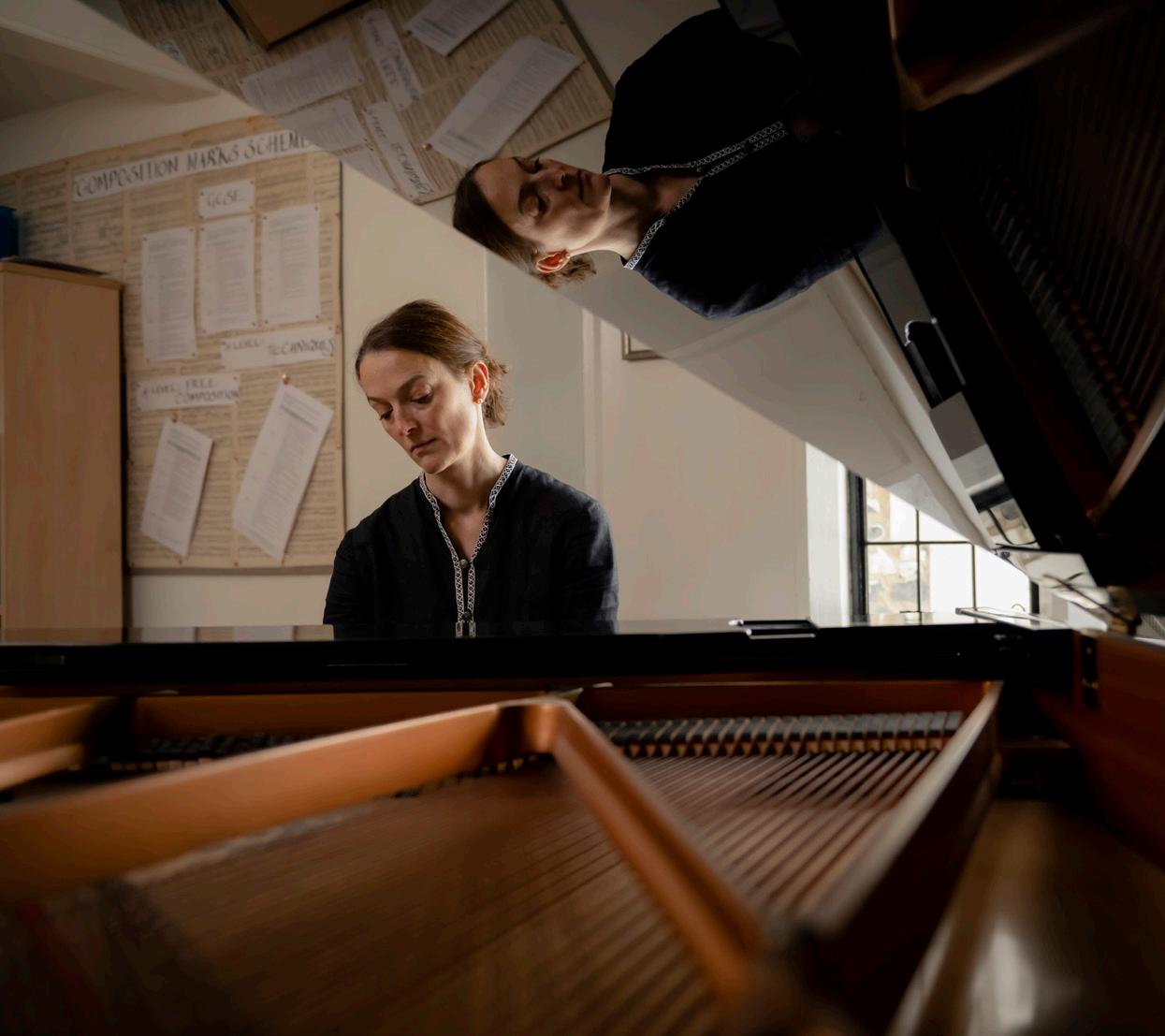
a glimpse of your extraordinary imagination in real time. We, as a community, can in our turn promise to be kind. And grateful. I will always be grateful that, for a few shimmering minutes, my interpretation of that Evensong Bell was turned into sound last Summer Term, in the Cathedral Quire. And I’m glad that Peter and Marie heard it too.
2012
[1]Thomas Adès: Full of Noises, Conversations with Tom Service, Thomas Adès and Tom Service, Faber
‘That fleeting moment of musical vibration gives us a glimpse of your extraordinary imagination in real time.’
‘Even the distant hum of a summer lawnmower found its way into the bass parts as a soothing drone.’



‘‘The sounds that I ‘harvested’ from the Evensong bell became the Sanctus for a Mass that I wrote last year to mark the retirement of Peter Roberts from his role as Headmaster.’’
hy do we love football? Why does this sport, this game that many of us call a way of life, stir such emotion, instil such joy and kindle such fire and passion? For many people, so much of the thrill derives from following your team through thick and thin – the relegations and promotions, the financial doldrums and miraculous buyouts! So often, though, it is an inexplicable, intangible and pure emotion.
I believe that football has three ingredients that make it so special and genuinely awe-inspiring. Those three delicious ingredients, which provide this football burger with a Michelin Star,
are: watching the underdog win, watching beautiful football and watching your own team succeed. When the trifecta combine, the sensation is sheer euphoria and your solitary Michelin-Star meal has suddenly become a tasting menu.
Before I start to delve further into the three reasons why we love football so much, it is necessary to state that I am a Crystal Palace fan. While I cannot claim to have experienced the aforementioned tasting menu as a Palace fan, the sommelier of hope and the sous chef of potential have at least graced Selhurst Park in the last season.
Ingredient one? Check. Wins came against Manchester City, Arsenal, Tottenham Hotspur and Manchester United in the 21/22 season (not to mention that Crystal Palace were the only side to remain unbeaten against title winners Manchester City for the whole of the same season). Ingredient two? Check. New manager Patrick Vieira has arrived at the club with an attractive possession-based philosophy. The whole idea of playing longball cavemanesque football is something in the distant past, with the club trying to pass out from the back (admittedly sometimes getting the defenders in trouble). It has gone down very well with the fans, and many are paying tribute to the former Arsenal and France legend, Vieira, for the change. Final and third ingredient? Check(ish). In his first season, often the hardest for a new manager, Vieira managed to record the second-highest points total for the club since they returned to the Premier League in 2013. Furthermore, it is the best goal difference the club has ever achieved in the Premier League whilst also having recorded the fewest-ever losses on record. In addition, if you were looking at the club’s overall success as much as accolades on the pitch, talented players such as Eberechi Eze, Marc Guehi and Michael Olise are shrewd signings – all under 24 with international experience – whilst home-grown talents like Tyrick Mitchell are regular starters and prove the upgrade of the youth facilities is truly paying off.
So now I have finished boring you about my love of Crystal Palace, like your great uncle

‘Why does this sport, this game that many of us call a way of life, stir such emotion, instil such joy and kindle such fire and passion?’
Clive, who always recounts the latest train he has bought for his model railway, did I mention I named my dog after Wilfred Zaha? Let’s now examine those same ingredients through the Premier League lens I mentioned earlier. As we examine these ingredients and prep our meal, let’s also consider the very British love of watching the underdog win.
In 2014 Leicester City won the Championship with 102 points and their squad included some serious talent for the league below the Premier League. Many thought they would stay up upon promotion, given their squad unity and some sensible signings. These signings mixed Premier League experience, in the shape of Matthew Upson and Danny Simpson, with new younger blood like Tom Lawrence from Manchester United and Leonardo Ulloa from Brighton. As the underdog, newly promoted side, they only spent £20 million (this genuinely is nothing when you think that individual players go for upwards of £80 million at the moment) on all of their new signings. Given the fact that fellow promotees QPR spent £40 million in that same year, and other mid-table teams spent £44 million on average, it is even more impressive that in their second season in the top league of English football, the unthinkable happened. With odds of 5000/1, Leicester City won the Premier League, along the way bagging successive wins against Liverpool and Manchester City in early February to solidify their title credentials with only eleven games to go. This title win, which was confirmed as they played out a 1-1 draw away to Chelsea on the final day, was cheered and roared on by all football fans across the country. Indeed, in some radio phone-ins, Leicester’s rival fans of Derby County and Nottingham Forest were even calling in with words of support for their rival club in a show of solidarity with other goldfish playing in a tank full of whales and sharks. Leicester became everybody’s second club that season and their title win was hailed by all as one of the most miraculous events in Premier League history.
players. Not only that, but the last six touches of the ball included two flicks, a back-heel and a first-time finish – a glorious goal that has won various fan polls for the best goal scored in the Premier League. The very fact that there are articles and YouTube channels dedicated to the ‘best team goals in Premier League history’ suggests that ‘nice football’ is indeed a key part of enjoying the game.
‘In some radio phoneins, Leicester’s rival fans of Derby County and Nottingham Forest were even calling in with words of support for their rival club in a show of solidarity with other goldfish playing in a tank full of whales and sharks.’
So, we like watching the big clubs lose, and occasionally when it comes at the expense of a direct, lumping-the-ball-forward tactic. Nonetheless, we most usually enjoy football when it is played beautifully, on the floor with lots of quick passing, or, as the great Brian Clough put it, ‘If God had meant football to be played in the air, he would have put grass in the sky.’ It is no surprise therefore that many of the sides in the Premier League are trying to dominate possession and keep the ball. Indeed, all of the top three clubs in the Premier League in the 21/22 season achieved average possession stats of over 60%, with Manchester City reaching a staggering hungryhippo-esque 68.2% possession average. Managers and clubs want to play attractive football and win matches of football the ‘right way’, much like the student who revises for the test rather than the kid who brings a cheat sheet. But we as fans love to see it. We love to discuss the idea of ‘team goals’, and a monster number of flowing passes before a lovely set-up and finish. The BBC website often posts videos of football from various parts of the world, or from youth competitions, where the ball is moved quickly and the whole attack is completed with a simple finish due to dynamic passing. As much as I have a vehement disgust for Arsenal (you know, the team who used to win things and have good players – yeah, that team), they did score what has to be one of the most satisfying one-touch, quick, flair-filled goals in Premier League history against yo-yo club, Norwich City, in the 13/14 season. Starting in their own half and near their own box, they managed to get, without losing the ball, to the other end of the pitch with no more than fifteen touches shared among six
Finally, we come to the final and most personal thing for every football fan, the feeling that you get when your own team wins something. If you have never felt such joy, imagine getting a question right on University Challenge and times it by a million. It is THAT jubilant a sensation. Now I hate to bang on about Crystal Palace (Who am I kidding? I love to.) but I was there when we achieved promotion back into the Premier League via the playoffs. The atmosphere at Wembley was sensational and, even though the game was dire, it is a memory that I will never forget. It was made even more memorable by the fact that the winner was scored in extra time by Premier League and Championship legend, Kevin Phillips. There is a reason why football fans the world over say ‘we won’ even though they never kicked a ball, and that is because they, we, feel every emotion possible throughout the whole season or competition. Even if you are the best team in the league, there is an expectation that you will beat everyone, and that can weigh heavily on a club’s shoulders. Conversely, the team expecting to lose every game starts the season as optimists, thinking that any points are a bonus against any club and it is just good to be in the Premier League, until very quickly they have no points from their first eight games. It is a sensation akin to going to the dentist for a check-up all perky and proud of yourself but walking out numb with the after-effects of root canal surgery. We feel it intensely and the troughs are very low, though the highs are very high. You now realise just how high and on cloud nine those Leicester fans must have been feeling in the season they won the league. It therefore also makes sense that, according to a recent report, 29% of football fans report signs of ‘seasonal depression’ when the football leagues finish for the Summer. We then get to the gloating that it allows you to enjoy with your friends and family when your team have won, unless of course you’re an Arsenal fan because they don’t win anything. You walk into the office, proud as a particularly spicy punch, and giving it large to your colleagues. You go onto that WhatsApp group and post all kinds of bizarre gifs that have babies grinning or people in spandex dancing merrily. All this joy and satisfaction is born from the simplest of games where you are merely kicking a ball into a net at the far end of the pitch.
So, no, it is not easy to explain our love for football. It can be going to the Michelin Star levels of the Premier League or the local pub food of the non-league divisions, but either way it draws out the same passion. It draws out the same commitment. It draws out the same sense of belonging. Some say that they don’t get it. Some say that they like playing but can’t stand watching and others say it’s alright. These people are heartless and if they went to the Michelin Star restaurant mentioned earlier, they would order the chicken nuggets with extra ketchup.
How can you not love it? It is like not liking chocolate, or breathing for that matter. Football is golden and if you need proof then go along to watch your local side or, even better, watch the mighty Palace at Selhurst Park.
Football never disappoints.
The Automobile: Interpretative Swerve or Linguistic Turn? David Perkins, Head of Research: Arts and Humanities, reflects on the past of the car.
At the turn of the 20th Century there was competition between different types of vehicle fuel: electricity, steam and gasoline. One of the reasons for an interest in the new fuels was to reduce pollution: lots of horse manure on city streets was a concern for public health and hygiene.
Gasoline won out, of course, against steam and electric power – a victory that later came to be seen as easy and inevitable – and for a long time electricity and steam were seen as evolutionary dead ends. Nonetheless, electric vehicles held an early advantage in terms of speed and reliability and it is possible to imagine an alternative universe in which charging stations could have become as ubiquitous as petrol forecourts are now. Indeed, Scientific American in January 1899 forecast a glowing future for electric vehicles: ‘One year ago a company put thirteen horseless electric cabs for hire on the streets of New York and today the same company operates one hundred cabs. They are so popular they have to be taken from the public cab stands and kept in the cab house to fill the telephone and messenger orders of regular customers. Three hundred cabs are needed and it is doubtful if the demand can be supplied. In addition to the cabs there are at least thirty delivery wagons, pleasure vehicles etc. in Manhattan proper.’
of the electric starter motor for internal combustion engine cars was a game changer.
There was not only a battle over the best means to power vehicles but there was also a linguistic battle about what to call automobiles, a battle that was noted by Scientific American on July 22, 1899:
‘Why did electric car technology fail in the 1910s? One answer is that the choice of fuel for the automobile resembled the choice between VHS and Betamax.’


“The question of a name for the automobile vehicles is still agitating many worthy persons who wish to air their latinity, and the result has been a collection of weird and impossible names which are amusing to say the least. Among them are ‘Carleck’, ‘Careleck’, ‘Electrom’, ‘Autovic’, ‘Autolau’, ‘Autobus’, ‘Autocam’, ‘Autogen’, ‘Propellor’, ‘Locomotive’, ‘Cabine’, ‘Victorine’, ‘Electric Landauine’, ‘Ipsometer’, ‘Sineque’, ‘Self-motor’, ‘Mobiles’, ‘Auto’, ‘Autogo’, ‘Molectros’, ‘Molecs’ and ‘Autopher’. The name last mentioned is really a very pretty derivation, being obtained from St. Christopher, the good saint’s name being used in part. Among other particularly atrocious names are ‘Kinetic’, ‘Autokinet’ and ‘Autokin’. It is to be hoped that if a short and really satisfactory name is devised, it will not be ugly, and will be, in a measure, descriptive.”
In 1905 more than half of all commercial vehicles in the United States were electric and by 1940 tens of thousands of electric cars and trucks had been produced. In the United States and Europe electric vehicles appeared as taxicabs, delivery vans, and even fire engines, as well as private cars.
So why did electric car technology fail in the 1910s? One answer is that the choice of fuel for the automobile resembled the choice between VHS and Betamax video tapes in the 1980s. Given that VHS became dominant through superior licensing and marketing, not better technology, this approach suggests that the internal combustion engine had no real technological advantage over electric cars, but this is not quite true. Early electric cars were hampered by inadequate batteries, complex and lengthy recharging, lack of electric infrastructure across the country, lack of standardisation in current (AC or DC?) as well as in components (e.g. plugs). The internal combustion engine gained an advantage in terms of infrastructure, power, speed, range. The introduction
In 1930 the American literary scholar Theodore Hornberger produced an article on the automobile and American English. Theodore Hornberger was a specialist in Puritanism and specifically the place of science in the very early years of American colleges. Just by the by, he discovered that there was more science education going on than was generally expected for such Puritan institutions. He was a scholar of Puritanism with a side line in motor cars.
Above is a satirical bookplate drawn by hand on the flyleaf by an unidentified artist. It depicts the University of Pennsylvania historian and English literature professor Theodore Hornberger as a wretch at his desk working madly at writing. A wall calendar shows his birthday, January 13, 1933, so presumably the book plate marked a gift on the occasion of Hornberger’s 27th birthday. The book in question is a copy of Sellar and Yeatman’s 1066 And All That. (Bookplate and image from the collection of DJC Perkins / © DJC Perkins.)

Hornberger noted that references to electricity in the Scientific American article reflected the decade or so in which electric cars seemed the most promising vehicles. As we know, ‘automobile’, ‘auto’, ‘motorcar’ and ‘car’ won out in the end. Other words such as ‘flivver’ and ‘buzz-wagon’ didn’t last. Hornberger commented that the word ‘automobile’ is a stranger in Britain and, if it does appear, it signals a tourist. He noted that American English is well known for selecting the word ‘truck’ over the British ‘lorry’, although ‘lorry’ was a commonly used word in America around the turn of the 20th Century and in the 1890s it was reported as a dialect word from Western Connecticut. Americans still refer to ‘sedans’ and that is, perhaps, among other possibilities, a legacy of the pioneering efforts of France in the automobile industry. The British had ‘charabanc’ as a fancy word for a sightseeing bus but there was no American equivalent except ‘rubberneck wagon’. The invention of the taximeter gave rise to the taximeter cab, the compound of taxicab or the ‘taxi’ for short. The word ‘van’, as in ‘white van man’, has a surprising foreign origin: the ancient caravans of Persia.


Hornberger noted that the “…most interesting word of this class, however, is ‘chassis’, used by Chaucer as ‘chasseys’ to mean a peculiar kind of window. It was reborrowed from modern French in about 1900 to supplement ‘frame’. At first there was a rather clear distinction, to judge by the mentions of ‘chassis, engines, and running gear’, but ‘chassis’ gobbled up most of the automobile, and is now used to mean the complete car except the body. Even the dash.” The dash – or dash board – derives from the horse and buggy era.
These days cars speak Californian, at least in the States. If you find yourself driving in New York, let’s say, at some point the SAT NAV will tell you to join the ‘Freeway’ even though there is no such thing in the state. British SAT NAVs do not say ‘Freeway’ but do say ‘please’.
‘The dash – or dash board – derives from the horse and buggy era.’Advert for a General Electric Home Charging Station (1914)
Right now my father is practising the song ‘Happy Birthday’ because he wants to play it on my birthday this year, and ‘Moon River’ by Henry Mancini because he heard this song when he was 13 and describes it as ‘love at first hearing’. It was ‘Moon River’ that triggered his desire to learn the piano because he wanted to sing and play the song at the same time one day, and this also led to his love of classical music: after hearing the song, he started listening to classical music every day.
He could not afford to buy a piano (he was living in poverty with seven other siblings) and in his adult life he ‘over-indulged’ in his work as CEO of a listed car company in Hong Kong, and did not have time to practise.

But now, in his early seventies and retired, he has the time, and so he wishes to fulfil his childhood dream of being a pianist. It makes him very happy because it helps him connect to his inner child, achieve a great sense of satisfaction and use every part of his brain to keep it ‘strong and active’ for his age.

He started learning the piano three years ago. It was onand-off for the first two years but now he practises for an hour every day and usually plays for short periods of time throughout the day depending on how he feels. This ‘spaced repetition’ has the advantage of helping him memorise sections of a piece, rather than practising in onehour blocks each day with no breaks, and helps develop his muscle memory faster.
Of course his fingers are less flexible than they once were, and he finds it difficult to remember where the notes are on the keyboard, so it takes him quite a long time to learn pieces. He’s been working on ‘Moon River’ for a year! He also finds it difficult to memorise passages, which is frustrating because he likes to sing and play at the same time. This is helpful when he wants to look at his hands and the keys but not at the score, which helps with fluidity, but he also says that his music does not need to be perfect because life is too short for perfection.
Roberta Mak (6b, CY) is a renowned pianist at King’s, so we were thrilled to learn that her father is now, at the age of 72, following in his daughter’s footsteps –with her help, of course. Roberta gave us an update on her pupil’s progress.
He says people may think that they’re old and that it’s too late to learn music, but it doesn’t matter, and as long as learning how to play music gives them happiness and a real sense of satisfaction, it is something worth doing.
He had a qualified piano teacher for a few months in Hong Kong but now I give him weekly lessons, and a large component of his learning also comes from listening to different YouTube and CD recordings

and comparing them, which helps with developing his own musical style. Looking at the players’ hands shows him how their movements correspond to the sound they make.
My father and I both play on our grand piano, a Shigeru Kawaii, in the living room, which is nice because sometimes he performs to our neighbours and we can all sit around on the sofas and enjoy the music.
‘He says people may think that they’re old and that it’s too late to learn music, but it doesn’t matter.’

Some may know him as the movie star in Chasing Legends or Hell on Wheels Others may remember him sitting on a bicycle, riding at top speed through towns in France. But I know Rolf Aldag as my dad.
My dad grew up in Germany with two older sisters. I believe this shaped him to be the highly competitive and strong-headed man he is today. Throughout his childhood he played many sports and at some stage probably thought he could be the best ice hockey or football player ever. But I find it hard to believe he ever pictured himself as a cyclist who was going to break nearly every bone in his body whilst doing seventeen grand tours.
As exhausting and terrifying as professional cycling may seem, it does offer a life filled with excitement and fun stories to tell your children. Personally, I have grown up hearing about many thrilling experiences, crazy memories and tragic injuries, but I have also
heard about the early days of dad’s career, the first cycling club he joined, the first race he won and the arduous build-up to procycling.
One thing to note about my father is his great storytelling. He has a way of keeping the audience interested in anything for hours on end, always finding a way to make people laugh or tell them something bizarre and new. That’s why I have chosen to interview him, to give you an insight into the real world of cycling.
What was your worst injury and how did it happen?
I think it was 2 January 1998. I was going for a nice ride when a car entered the highway and hit me head-on. I ended up with a mixture of cuts and bruises, a broken collar-bone and a broken leg. Although I’ve had many other painful injuries, mainly through crashing in races, I think this one was definitely one of the worst I can remember.
What bike have you been riding recently?
Working in the cycling industry is a very demanding job. Some like to spend their free time doing something other than cycling things. I, on the other hand, try to squeeze in a good ride here and there. I currently have a Specialized Crux bike. It has big tyres with high-carbon rims, allowing me to go both on the road and in the forest (where I don’t have to fight with cars). It’s still possible to ride fast on both terrains and it has more clearance than a normal bicycle, making it even more fun.
Who do you think is the best cyclist now and is there any young talent we should watch out for?
It’s hard to define ‘best rider’ when it depends on the discipline one is talking about. Even though there are sprinters, climbers and time-trialers, people commonly refer to the best cyclist as the one who wins the grand tours. In my opinion Tradej Pogačar is the most complete cyclist. He has proven


that he can perform well in time trials, sprints and grand tours. He won the Tour de France twice at the age of 24. Undoubtedly, he has competition. Every year there are new young cyclists entering the industry who may challenge him and prove capable of winning a grand tour like the Tour de France. There is some immense talent about. The 22-year-old Remco Evenepoel, who won the Vuelta a España earlier this year, stands out for me. Having seen him fight his way through the Vuelta and prove he can compete with other well-known cyclists, I think he has incredible potential.
Another young rider who did well in the Vuelta is Juan Ayuso, placing third overall. He joined UAE in 2021 and has been a growing talent since the very start. He is only 20 years old so I am sure we will see some great performances from him in future years. Even younger than Evenepoel and Ayuso is 19-year-old Cian Uijtdebroeks. He has recently won the Tour de l’Avenir and placed 8th in the Tour of Norway. As such
a young cyclist he has displayed massive amounts of talent and will continue to improve whilst under contract at BoraHansgrohe.
What did you cycle in? Have you ever won anything? My dad does not like discussing his achievements but as a proud daughter I will share my favourite parts of his career. He rode in a total of seventeen grand tours during his professional cycling career but drives the car behind the cyclists now in many races, including the Tour de France. This way he does not miss the competitive spirit and atmosphere, despite ending his career not long after I was born. He won a stage in the Tour de Suisse, Tour de Romandie and Deutschland Tour and placed 7th in Ronde van Vlaandern. In 2000 he was German national road champion, making the whole family proud. He even had the mountain jersey for one
day in the Tour de France in 2003!

The event my dad rode in that I find the most exciting is the Olympic Games. Being able to go to LA and to Sydney to do something he loves is incredible and an experience I think he will never forget.
What’s something crazy about the cycling world no one knows?
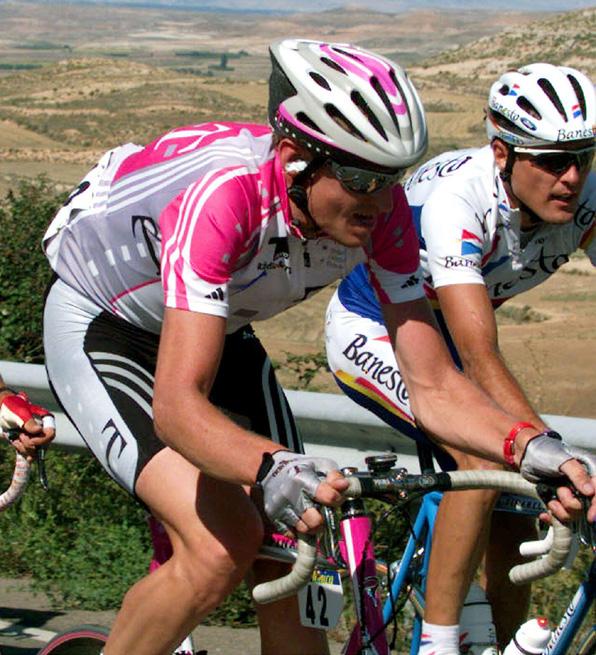
I have a few random yet astonishing facts that even hardcore fans don’t know. Did you know that the race bikes used in the Tour de France cost around £15,000 and are all commercially available? And while we’re on numbers, the best-paid rider earns up to £6 million a year and the minimum payment for a professional cyclist is around £50,000 a year. Now some might be wondering how a professional team can afford to pay their riders such sums, but you would be surprised how high their budgets are. The minimum team budget currently stands at £14 million a year, whilst the wealthiest team has a budget of £45 million. But riders aren’t the only people they have to pay.
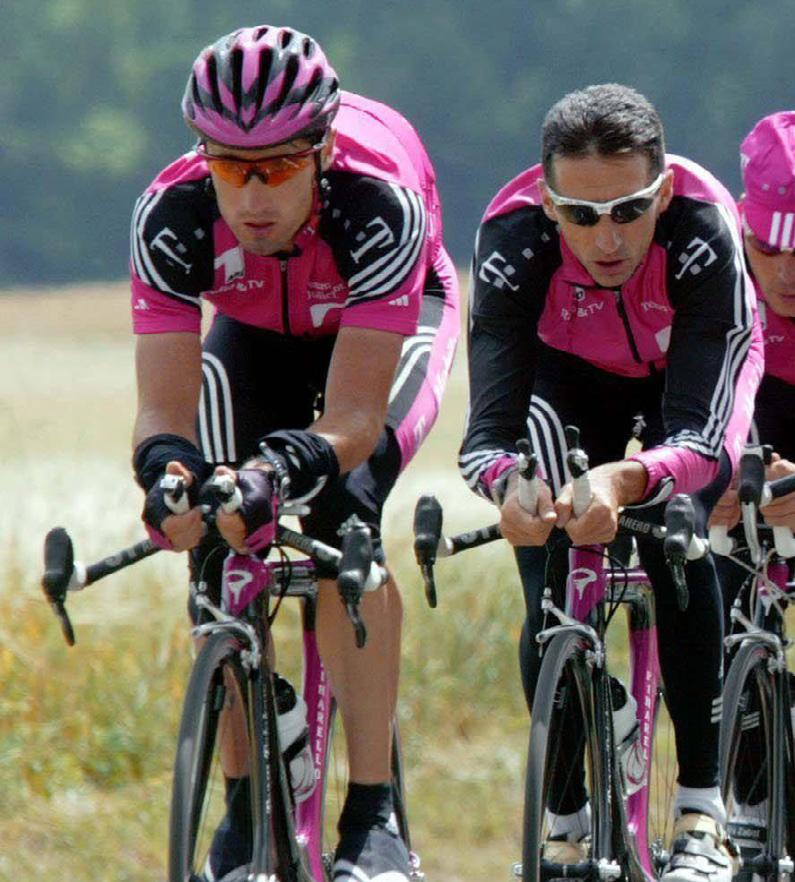
‘He rode in a total of seventeen grand tours during his professional cycling career but drives the car behind the cyclists now in many races, including the Tour de France. ’
A professional cycling team consists of around 100 full-time employees, including coaches and sports directors, and only around 25-30 are usually riders. The riders are constantly on their bicycles, either racing or training for their next big performance. Over the whole year, a cyclist will cover between 30 and 40 thousand kilometres solely on their bicycle. That’s between 80 and 110 kilometres every day!
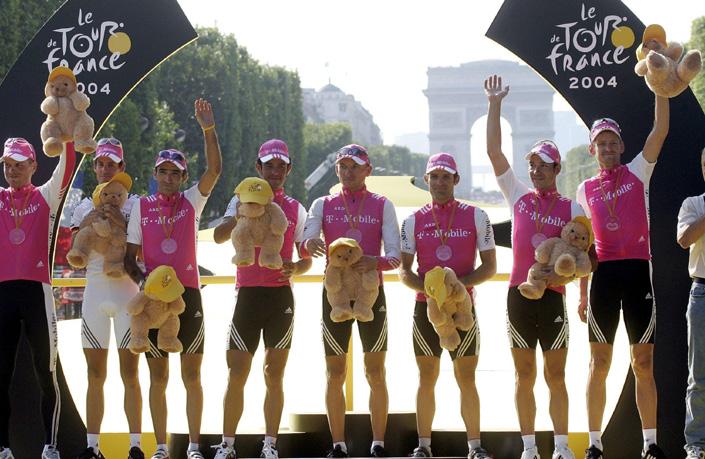


Some people choose to settle down after retiring from a professional sports career, and they might decide to leave that industry for good. But I could never leave behind something I’ve always loved so dearly. Having experienced the terrain, knowing the tricks and understanding the challenges, I decided I knew enough to help young riders reach their full potential. Ever since getting off my own bike, I have been a Sports Director for many professional world-class teams, ensuring that the new talents are good enough to perform on their own bikes at international level. Currently I am working for Bora-Hansgrohe, with riders like Cian Uijtdebroeks. I have previously worked for teams including Team Dimension Data and Quick Step, where I was directly involved in Mark Cavendish’s career. His name may be familiar to cycling fans, but did they know that he and I were actually working on a Netflix documentary a couple of months ago? We both featured in Chasing Legends and now we are doing Netflix together. Perhaps at the end of the day being a cyclist and a movie star go hand in hand; and maybe in a couple of years I will be known for my ‘acting career’ rather than having cycled through cities on pricey bikes.
‘We both featured in Chasing Legends and now we are doing Netflix together. Perhaps at the end of the day being a cyclist and a movie star go hand in hand.’

As a young girl I dreamed of following my legendary godmother into ballet. I loved her as a member of the family, of course, but she also bore glorious titles, such as ‘youngest principal dancer ever in the San Francisco Ballet’ and ‘the most acclaimed ballet dancer in her native China’. Seeing her succcess now, it’s hard to believe her career was launched on the toss of a coin.
Yuanyuan Tan was born in Shanghai, China, in 1976. Her mother wanted to be a dancer but her father said no, so when she saw her own daughter’s physique, looks and determination fitted perfectly the ballerina’s profile, she also saw her own ambition revived through her child. By chance, Yuanyuan was invited to audition for the Shanghai Dance School.
Every ballerina knows that for dancers to achieve the top rank, talent and timing are essential. While one may not have control of both talent and timing, the self-motivation of going through day-to-day training lays the foundation of everything. This graft is often overlooked by the public, and was something the younger me also failed to recognise.
the family decided to leave the decision up to fate. They literally tossed a coin and the rest, as they say, is history.’
Despite the girl’s obvious excitement at receiving an offer of a place from the school, Yuanyuan’s own father, a senior engineer from a traditional family, saw ballet as an indecorous ‘Western’ art form too niche for the Chinese population. But after months of arguments the family decided to leave the decision up to fate. They literally tossed a coin and the rest, as they say, is history. (And the lucky coin has been kept safe to this day.)
A glamorous career followed. After winning a gold medal and the Nijinsky Award at the First Japan International Ballet and Modern Dance Competition in 1993, and a gold medal in the Fifth International Ballet Competition in Paris in 1994, aged 18, Yuanyuan was offered a soloist contract with The San Francisco Ballet. Two years later, she was promoted to principal dancer. ‘Lucky for us and the audience worldwide, the coin landed heads up,’ says Helgi Tomasson, Artistic Director of The San Francisco Ballet.
Not only is the physique of the dancer important, but qualities such as sensitivity to music and understanding of characterisation are also required. One’s unique interpretation of music creates nuances in movement, and this is where the creativity and artistry of the dancer come in. It’s never just about doing what the choreographer demands, but about using wisely the gifts you are handed by fate, and it is this that distinguishes the mere dancer from the true artist. Yuanyuan Tan is one of the latter, and there are few.
Clever, dynamic, and lively in her private life, Yuanyuan Tan has the power to transform herself endlessly, such is the magic of theatre. Her vast repertoire includes leading roles from modern choreographers like Christopher Wheeldon, Edward Liang and Wayne McGregor, to title roles in more classical ballets such as Giselle, Othello and Romeo and Juliet, and the more famous The Nutcracker and Swan Lake. One memorable performance for me, personally, was a triple bill she performed at the Sadler’s Wells Theatre when the San Francisco Ballet was touring London.
Yuanyuan Tan’s favourite ballet piece over her lengthy career has always been The Little Mermaid, a piece I have luckily seen myself. After sixteen years of dancing leading roles,

Elina Lin (6b, HH) pays tribute to her legendary godmother, the great ballerina, Yuanyuan Tan.
when she no longer expected any more major transformations in her career, The Little Mermaid was the piece that made her continue dancing, a work by the choreographer John Neumier that for her personally demands the height of artistry.
The story is more than familiar to most. Yet her portrayal of the mermaid in this modern production of Anderson’s fable showed me, for the first time, how a performer’s emotional presence can strike an audience’s soul without a word being uttered. I clearly remember the sound of sobbing coming from an otherwise-silent audience that night, against the sweet and haunting melodies. During the epilogue of the ballet, of course, the mermaid is in tears after being abandoned by the object of her intense love. And at that moment my own heart was breaking.
When the curtain drops, the magic and glamour from a second ago disappear and the dancers return to their mundane routines. Ballet dancers train like professional athletes, but only when all is well. Injuries, whether acute or chronic, are par for the course, and they can strike at any time at any part of the body.

For Yuanyuan, the most traumatic accident occurred in her late twenties. It was Giselle in 2005. After a grand jeté jump, she finished the ballet season with her right leg immobilised, after dislocation at the hip. She was told only surgical treatment would work, with a 30 percent success rate. Surgery had ended the career of another female dancer in the company, so Yuanyuan refused surgery and began self-rehabilitation with the assistance of books on human anatomy. She made a miraculous recovery after six months and stepped back on stage.

Not long ago Yuanyuan celebrated her 27th year with the San Francisco Ballet. Most ballet dancers decide to retire before their forties, when their bodies can no longer take the punishment. But Yuanyuan has seen nearly all of her previous partners take their last bow. While still active herself, she has begun to take on more behind-the-scenes work in the last two years, especially back in China.
Wherever Yuanyuan chooses to extend her creativity, she will continue to inspire me, young dancers and audiences for years to come.
‘I clearly remember the sound of sobbing coming from an otherwise-silent audience that night.’
‘Her vast repertoire includes leading roles from modern choreographers like Christopher Wheeldon, Edward Liang and Wayne McGregor, to title roles in more classical ballets such as Giselle, Othello and Romeo and Juliet, and the more famous The Nutcracker and Swan Lake.’


‘Clever, dynamic, and lively in her private life, Yuanyuan Tan has the power to transform herself endlessly, such is the magic of theatre.’


The LGBTQ+ FREDIE committee was formed, along with the other FREDIE groups, at the start of the academic year (September 2021) and is now over a year old. It is led by Ms. Fraser, but our student head is Ekaterina Eroshina and our deputy head is Minnie Goar. We have a meeting twice a term, one for the juniors (Shell to Remove) and one for seniors. It is a commitment, but every contribution is valued and appreciated. For those not comfortable with meetings involving staff, we also have the student-led ‘Lavender Club’ for a low-pressure safe space to chat with other students. So far, we’ve seen the first celebration of Pride at King’s, taking at least 20 students to the Canterbury Pride Parade in June. We’ve set up the Lavender Club, as well as the introduction of the FREDIE groups, with the LGBTQ committee among them. We celebrated history month in February, and plan to do so again in the coming year. We’ve had two Hello Yellow stalls now and are still looking for new members. With the arrival of Mr. Mearhart, our new Diversity Coordinator, we are excited to bring new change to the culture and action at King’s. In the future, we would like to provide menstrual bins (bins used to dispose of sanitary products) within the men’s bathrooms, to make a more inclusive environment for trans students. We would also like to further improve the training in LGBTQ+ matters and entertaining certain scenarios. We are already planning a stall for this year’s Hello Yellow fair to represent the community and spread awareness as well as information to other pupils and members of staff. The FREDIE team is looking forward to seeing this year’s progress and hope to achieve even more than before.

the character of everyone’s new acronymic friend.
When we launched the FREDIE initiative, one of my tutees – a Freddie – wondered why I was suddenly sending him a lot of shouty, capslock emails. FREDIE at King’s doesn’t pay homage to my tutee, nor to the well-known cricket, rock or film stars who share the name (if not quite the spelling).
Instead, it is a central tool in the school’s equality, diversity and inclusion agenda. The acronym actually stands for Fairness, Respect, Equality, Diversity, Inclusion and Engagement and, in many ways, it’s the final ‘E for Engagement’ that is central here, since the FREDIE Committees are pupilled groups created to hear student voices and experiences, and to involve them in generating long-lasting, sustainable change.
There are four groups – LGBTQIA+, Neurodiversity, Sexual Equality and Race & Culture – all of which work incredibly hard to make King’s an even more brilliant place in which to live, learn and work. As you will read, the pupils are rightly proud of what they have already achieved within the first year of the initiative, and have big plans for 2023 and beyond!


Sometimes we come up against the view that anyone individual can’t do anything to make King’s a more inclusive school but I see the work as analogous to football teams winning on aggregate. For the non-footie fans, what
that means is that all the goals scored across home and away fixtures are added up, and the team with the most overall goals wins.
Both the pupils and staff involved in FREDIE firmly believe that if everyone makes one small change, whether that’s not using a certain word or taking a bit more time to find out about the many cultures represented within the King’s community, all those little wins will eventually add up to a long-term cultural shift.
Small change. Big difference. That’s what we’re all about, and together we hope to be able to leave the school a legacy of which everyone can be proud.
‘The pupils are rightly proud of what they have already achieved within the first year of the initiative.’
As the representative of the neurodiversity FREDIE Committee, I am very proud of all things that we have achieved within the school, making the exam hall more accessible and starting initiatives such as Neurodiversity Celebration Week to help educate members of the wider school community about the issues that we face. Looking into the future, we are starting a new option for ‘sensory safe’ foods at mealtimes, in the hope of making them more accessible for all pupils. I wanted to use this opportunity to show the struggles that neurodiverse pupils face in school, in the hope that you will gain a greater understanding of why we do what we do. One thing many pupils have found helpful is support from the Hub, the school’s Learning Enhancement Department, and I encourage anyone who is interested in receiving learning support to give it a try. The following paragraphs were written by two neurodiverse pupils at King’s:
‘As a neurodiverse student, I personally have been quite self-conscious about my academic ability. For something as simple as reading out loud in class I get a sudden panic, feeling like everyone will be judging me on my misreading and mispronunciation of words, and praying to God that I don’t accidently skip a line. I have managed to deal with it now, and have my dyslexia mostly under control, but I must still collect myself before I do any public reading. I find preps and especially essays quite difficult, and, in Shell in particular, trying to balance the number of preps I was receiving was really tough for me, especially trying to organise my prep time and get them all done on time. Making friends can be daunting as well, as you wonder whether they will judge you for your condition or not. I personally didn’t struggle with making friends in house, but I remember it took me longer to make friends with people who were in lessons with me, as I wasn’t in an environment



where I was confident and comfortable. The extra lessons and support from the Hub have helped me a lot with self-confidence and my organisation, right from Shell up to the revision schedule for my GCSEs, and have helped me gain confidence to the point where I didn’t even have to think about submitting this. I have come a long way from Shell and that is largely due to the help and support that I have received.’
‘When I first arrived at the school, I didn’t have any learning support, but as soon as I was offered it I immediately accepted because my friend told me how much it was helping her. I have previously struggled with time management as it takes me longer to process, read and write things down than other people due to my dyslexia (causing more than a few late nights from prep). Throughout my time at the Hub, I have learnt very useful skills that have helped me to adapt and manage my workload as well as my everyday life. I have been recommended various methods to help with learning such as tools for reading, touch-typing for writing and many more tips and tricks that have eased my way into a higher and harder workload. Not only did we focus on finding new methods to help with my learning disability, but we also looked at exam technique and revision strategies to help me understand how to prepare myself better for stressful exam periods. Overall, I have always loved going to the Hub because it is a very welcoming atmosphere and each lesson is geared to my individual needs, always educational and enjoyable. Throughout the years I have become much more confident about my ability to tackle academic work, thanks to the Hub.'
Naomi Cray (6b, KD) is proud that King’s is embracing neurodiversity.
‘For something as simple as reading out loud in class I get a sudden panic, feeling like everyone will be judging me.’
WWhat attracted you to King’s?
I think many things did: the diversity of the pupil body, especially in terms of the number of pupils here and the range of school sites – primary, secondary and the International College. I have got quite a bit of experience, particularly in primary and in an international school as well, so I thought it was a wonderful opportunity to support that level of diversity, bearing in mind that I was aware that the current staff body was not necessarily reflective of that diversity. On top of that, the reputation of the school as such a strong and prestigious school, not just in the UK, but internationally too, and so that combination made me see this job as a sort of opportunity to support something that not only improved inclusion and equality and indeed diversity for the school, but also the local community, and, a bit ambitious, but also for the school to be an international beacon – all the ingredients are there. Beyond that, the level of privilege that many of the pupils here have experienced means that they are going to go on to enjoy opportunities in positions of authority across the world, so have a great chance of making the world a better place going forward, so if I can support them to be more inclusive, I think that will have a knock-on effect.
I think that’s an inspirational way of framing it. With that in mind, how exactly would you describe your role within the school?
The priority is supporting staff to be more inclusive and to support a diverse range of backgrounds and ways of thinking within the staff and student body. I think everyone has a degree of cognitive diversity, and that the school should embrace and celebrate that, as well as take advantage of the innovation that comes with moving away from group thinking, within both lessons and how students are challenging themselves in their spare time. The goal is to help students, and staff should be supported in protecting each other from unfair treatment and behaviour, but also to actively listen to each other’s perspectives and ideas. More specifically, I mean giving space to what people are experiencing and receiving during their time here at school – what they are being taught and what is
expected of them. For me, if we’re in a situation where everyone, regardless of their background, feels empowered to challenge discrimination, then I think that if I can empower that, it would be immensely important. Beyond that, if I can also support the school community to embrace diversity authentically, I think that would be a good marker for success.
Given you are still rather new to King’s, how do you think that your vision for the school meets up with your initial impressions? So far, I think that there is a general openness to equality, diversity, and inclusion within the school, and I have seen this within both pupils and staff. To a certain extent, that is as far as it goes –there is an openness, but not a confidence or an understanding of what to do in some situations, and how to commit openness to action. As a result, I believe there are too many missed opportunities within the school, when it comes to challenging discrimination. I think that too many


and staff lack the confidence to challenge something in the moment; either because they don’t know how to, or whether it will make a difference. This means that members of the school community are having to mask important parts of their identity to survive the day and to fit in. I think how we address discrimination and hold space for a wider variety of identities and experiences clearly needs work.

pupils
Ben Mearhart, Equality, Diversity and Inclusion Coordinator, is interviewed by Naomi Cray, Head of the FREDIE Neurodiversity Group.
‘I think everyone has a degree of cognitive diversity, and that the school should embrace and celebrate that, as well as take advantage of the innovation that comes with moving away from group thinking.’
Do you think that’s going to be a lot of work for you, or do you feel that this is something that is quite attainable within the near future?


There are two levels to my answer. In a professional sense, I think that there is a lot that can be done in the coming weeks and months, and a lot of change has already begun to take place to make King’s a more equal school. Beyond that, more honestly and more personally, I would love to see a more inclusive and equitable society within my lifetime, but I am not convinced that is going to be the case. I think that it is only natural that most schools will experience a similar journey over the next five to ten years. Idealistically, I would like it to be much sooner than that, but realistically, I know that social change is a slow process.
What do you think King’s needs to improve upon the most?
I think actively giving and holding space for experiences that pupils are not familiar with would make the biggest difference around school, and whilst there are already spaces for pupils who deal with these issues around, it is the quality of these spaces, and how they are held and how they are protected that needs to be improved upon. The learning that comes from these spaces is key, so I think that holding space, to the extent that it is trusted and relied upon, and, I don’t like the expression normalised, so usualised, in terms of that there are more and more pupils and staff who can trust that they can be heard and speak authentically, so that they feel less pressure to hide the parts of their identity that feel are important to them.
With FREDIE, what do you make of its current role? Do you think the committees need to change or do you feel that they’re already quite successful? I know it’s still quite early days, so you might not be able to give this question the best answer.
The fact that they are so established is so important, as it says that everybody, regardless of their personal politics,
has a space in which they can talk about their experiences surrounding aspects of their identity. Reading the newsletter last year, I think that each group achieved a lot of important things, listening to the communities that they represent and making changes based on the feedback they received. I think that, if more time was given to FREDIE, it would achieve more within the school, although I understand that there are significant limits due to timetabling and other commitments that pupils have. Each member of the groups is supporting transformative change, not just reform within the school, and I want to support the agency of each member in achieving more change across the school. The FREDIE groups would benefit from sharing more of the daily experiences their members face, not just of discrimination, but also missed opportunities within the curriculum, with the community that they’re committed to reforming.
Ok, so final question. We’ve talked a bit about the long-term goals of FREDIE, but what would you like to see from the committees over the coming year, and what impact should we be focusing on within the school? Possibly too idealistic, but I feel that more thought should be given to what normal should look like – when we think of those without disadvantages, what does their experience look like, not just within school, but as they enter university and the workplace? Consequently, for those who are disadvantaged, what would an equivalent look like, and how could we implement that within the school? By specifically consulting with their fellow pupils, the committees need to identify what is preventing that equality of treatment. If I’m honest, it is not the problem of disadvantaged pupils to solve – it’s for those who aren’t disadvantaged to listen and understand and then support the agency of their peers.
The FREDIE groups need to identify what that experience should look like and how to put it into place.
That’s great. Thank you very much for your time.
‘It is not the problem of disadvantaged pupils to solve – it’s for those who aren’t disadvantaged to listen and understand and then support the agency of their peers.’
LX)
Iam extremely grateful for the opportunity that FREDIE has given us to have our say and make proactive difference on issues that we our passionate about. The sexual equality working group has come together having meetings over the year with the aim of ensuring that we get the most out of our discussions and convey to the staff how important our ideas are. Having the group has enabled likeminded people to bring forward their experiences in the school, as well as being there to bring forward points and experiences from peers who do not feel comfortable speaking up. Since the founding of our committee early last academic year, we have brought to attention many things that we would like to see progress, one of those being the way staff handle different situations in the classroom, tending to subconsciously discriminate against a certain gender depending on the circumstances. One thing this discussion drove was the organisation of a teacher training course about periods at the start of this academic year, along with the constant distribution of necessary sanitary products at central points around school and sports facilities to be more accessible. We were also keen to ensure that our girls 1st team cricketers were offered the same opportunities and facilities as the boys, to the greatest extent possible, and both teams were able to play on the 1st team wicket at Birley’s this past summer. Regarding sport, we brought up the topic of fairer opportunities in sports in terms of kit, pre-season training, publicity and removing

stigmas. This term, girls’ football and rugby activities have been introduced on a more official level, with fixtures already lined up. As a group we want to highlight that we are here for equality of genders and aim to bring focus to any discrimination or unfair treatment of boys just as much as girls. Upon induction, new pupils were told how to best treat one another and taught the values on respect within King’s. This is why we urge for representation of both boys and girls within the group to give a more holistic view of situations and keep our actions balanced and fair. It is key that everyone knows, no matter how big or small an issue may seem, that mentioning it to a member of staff, or a rep, will always do more good than harm.

Alice Butt (6b,
is happy to see equality of opportunity established at King’s.
‘We were also keen to ensure that our girls 1st team cricketers were offered the same opportunities and facilities as the boys.’
‘We urge for representation of both boys and girls within the group to give a more holistic view of situations.’
England might have a reputation for being fish lovers, with their famous fish and chips, but I am often tempted to challenge the statement as a Chinese student. Growing up in China, the imagery of fish seems to be infiltrated into many different contexts in life. For example, a ‘salt-dried fish’ (咸鱼) is a colloquial term in Mandarin for anyone who is lazy or idle, just like how the fish sits still in the air as it gets dried. Koi Fish (锦鲤) also symbolizes luck, as Chinese folktales record some lucky koi eventually becoming a mighty dragon after overcoming a series of challenges. The most famous secondhand trading platform is also named ‘resting fish’, which suggests resting, unwanted products could be circulated and repurchased. The advertising line literally says: let good stuff swim like a fish with the help of the platform!
‘Fish’s pronunciation in Mandarin sounds exactly like reminder/ abundancy, so the dish symbolizes prosperity in the coming year.’
how a whole roasted turkey will always be needed for Christmas dinner. This is because fish’s pronunciation in Mandarin sounds exactly like reminder/abundancy, (鱼 and 余 both pronounced as ‘Yu’), so the dish symbolizes prosperity in the coming year. In fact, the dish is probably even more culturally significant than the red envelopes and dumplings, which seem to have become the most-mentioned elements of the Spring Festival.
There are thousands of ways of cooking fish, ranging from the easiest way of just steaming it after some seasoning, to the artistic approach, namely ‘the blooming squirrel fish’. Feel free to start with the easy one just by searching ‘steamed sea bass’ on BBC Food: you will not be disappointed in this festive dish!
What’s most important to me is the fact that a fish dish (normally presented as an entire fish rather than fillets) is considered an absolute necessity for a proper Chinese New Year (Spring Festival) dinner, just like



Wendy Lian (6b, KD) says the Chinese rival the English in their love of fish as a dish.
‘England might have a reputation for being fish lovers, with their famous fish and chips, but I am often tempted to challenge the statement as a Chinese student.’
Dentistry applicant and King’s tooth fairy, Charlotte Lester (6b, LX), loves to examine the Biology Department’s toothhoard.

The King’s School Biology Department boasts a large collection of teeth from many different animals, including carnivores, herbivores, and omnivores. But the tooth that stands out the most, the largest of all in the collection, is an elephant’s molar tooth.
A tooth consists of three clearly defined parts, starting with the pulp chamber, the innermost part of the tooth, which is surrounded by dentin. This substance makes up most of the tooth, and then the outermost layer is called enamel. The pulp is important because it connects the tooth to the rest of the body; it contains a nerve and blood vessels which provide everything for the dentin cells. The dentin, which is about as close to bone that the teeth ever get, is full of microscopic tubules which radiate outwards from the pulp chamber to the enamel. These channels are used to supply mineral ions and new dentin cells to the rest of the dentin. The enamel, the part we see, is a relatively thin layer of inorganic material which is very important to the process of eating.
Elephants are a typical herbivore, and their diet choice is obvious in the physical structure of their teeth. Their molars are broad and long, providing a large surface area with which to grind down plants. Another evolutionary trait that elephant teeth have developed are high crowns, the visible part of the tooth that sits above the gum. Having a high crown works as protection against the wearing down of teeth by providing more tooth to wear down. The crown also has high ridges which you can feel when you run your tongue over your own molars. These are known as cusps. Elephant molars also have cusps that work as a cutting device to slice up tough plant material while the pestle-andmortar action of chewing grinds it down. But the cusps of an elephant molar are different from other herbivores because elephants chew their food in a forwards-backwards motion unlike all other herbivores, who chew left to right. The cusps of a cow or horse’s molar, for example, show a pattern that is distinctive for each species of lines that curve and circle around, often with a long cusp that curves from the back of the tooth to the front. The elephant molars are different because they show a highly uniform pattern of lines from left to right, which form a pair joining together at each side of the tooth and separating out in the middle.
‘Over many years teeth will survive and fossilize, so not only are many archeological sites full of teeth, but these teeth have remained virtually unaffected by the environment sometimes for hundreds or thousands of years.’
be larger than the previous teeth. There are drawbacks to the elephant shedding teeth, because if the last set has worn down to the dentin level, chewing any kind of food can become painful enough to put the animal off eating, which is dangerous. And elephants face an extra challenge in combating tooth wear, in particular the African savanna elephant. The environments they live in can be very sandy and dry, which causes the sand to be blown on to their food, and the naturally abrasive qualities of sand cause accelerated rates of tooth wear.
The inorganic nature of enamel lends it an incredible strength that enables teeth to withstand strong biting forces. The biting force is the force exerted by the muscles of the jaw upon the top, occlusal, surface of the teeth. For elephants this can be as high as 15,000,000 Newtons per metre squared. (To put that into context, for humans the maximum biting force of our molars is 1100 newtons per metre squared.) Although elephants will rarely have to exert that much force on a daily basis, they will still use a significant level of strength. Despite its incredible strength, the enamel will inevitably wear down with constant grinding, just as all teeth do over time. To combat high rates of wear an elephant will lose its current set of teeth and replace them with a new set which grows from the back of the jaw and migrates forward. An elephant has four molars in its mouth at one time, but behind those in their jaw are five more sets of teeth that are growing and will be ready to come forward and replace the elephant’s current teeth once they fall out. Each set of teeth that come through will
The enamel continues to prove its worth, even after the elephant has died: due to enamel’s inorganic structure, after death, when the rest of the corpse is broken down by decomposers and the organic material is recycled, the teeth remain. Over many years teeth will survive and fossilize, so not only are many archeological sites full of teeth, but these teeth have remained virtually unaffected by the environment sometimes for hundreds or thousands of years. In this way, such teeth provide a snapshot of the time in which the elephant was alive. For example, malnutrition over small periods of time will show up on a microscopic level. As the enamel is formed during the gestation period and afterwards it is laid down in lines, and every twenty-four hours a new line is visible. For traumatic events there are also lines that are laid down and they appear as thicker and darker than the normal twenty-four-hour ones, which means they are recognisable as a sign of trauma. Furthermore, because they are laid down within the daily tooth lines, it is possible to date when it was in the elephant’s lifetime that the event happened. The drawback to this is that once the tooth stops growing there are no longer any lines and instead the lines are worn away. DNA can also be extracted from dentin cells to look at the way elephant genetics have changed over their evolutionary history, as well as comparing them to other species to deduce when they may have diverged evolutionarily in the past.
The main problem with using teeth is that almost all techniques used to find postmortem evidence of the animal’s life involves compromising the integrity of the tooth. DNA testing, for example, requires destruction of large parts of the tooth. However, due to recent developments in science it is possible to sequence a genome with less and less DNA.


‘As a cell factory, the body works incredibly smoothly most of the time when we are at the peak of our fitness, efficiently replacing most of the 300 million cells we lose every minute.’
Have you ever marvelled at your bones? We use them every day but how many of us actually know how much they do for us? For example, your femur can hold up to 30 times your body weight. And without your ribcage, your lungs wouldn’t be strong enough to withstand the pressure of your chest and you would suffocate. Bones hold a secret superpower by which they can store large amounts of information about us. We can even figure out our diets from our bones.


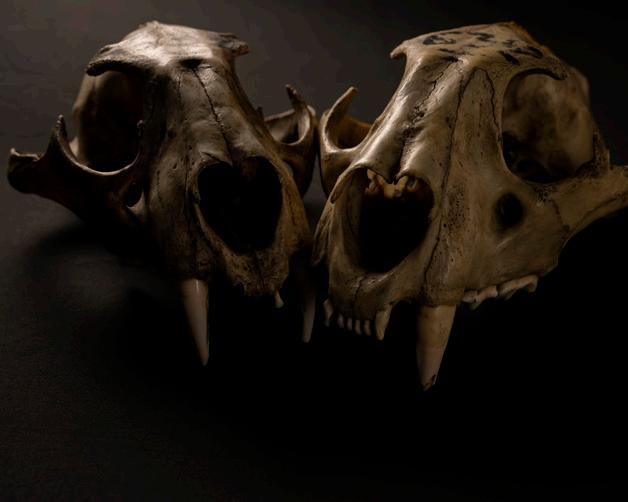
much alteration does a human body sustain throughout its lifetime and what happens with those cells that are not in fact replaced?’
As a cell factory, the body works incredibly smoothly most of the time when we are at the peak of our fitness, efficiently replacing most of the 300 million cells we lose every minute. Our bodies are programmed to know which cells to replace, when and how. Each cell has its own life expectancy: sperm survive for only three to five days after formation; skin cells live for a mere two to three weeks; and red blood cells only survive for three to four months. The liver takes a full year to replace all its cells. Meanwhile the skeleton takes almost fifteen years.
Despite the above, the charming myth that, because we replace so many of our cells on a regular basis, every decade or so we become an entirely different person is, sadly, misguided. Can you imagine if we were able to play by this fantastical rule in a court of law? Picture a defence barrister: ‘But Your
Honour, my client’s wife died fifteen years ago so, even if her husband killed her, he’s no longer the same person he was and is therefore no longer responsible.’ I don’t believe such an argument has yet been rehearsed in a court but it does, however, raise a question. How much alteration does a human body sustain throughout its lifetime and what happens with those cells that are not in fact replaced?
There are four different cell types in our bodies that are, in fact, never replaced and can live as long as we do or, technically, even longer: the neurons in our nervous system; a tiny area of bone at the base of our skull (the otic capsule); the enamel in our teeth; and the lenses in our eyes. Out of these four, the teeth and lenses are only semi-permanent since they can be removed or substituted by modern dentistry or surgery without harming the host. The other two are immovable and truly permanent and remain as irrefutable evidence of our biological identity from before birth until after death.
The dearest wish of Lilia Trigg (6b, WL), who wishes to study osteopathy and physiotherapy, is to spend the rest of her life examining bones. But for now she has to make do with the Biology Department’s amazing bone box.
‘How
The otic capsule is found in the very depths of our skull, around the inner ear. As the inner ear forms, it does so to full adult size immediately and remains insulated (by the otic capsule) against growth and remodelling. In this way, measuring the ratio of carbon and nitrogen stable isotopes may tell us something about the person’s diet: whether a person was a carnivore, pescatarian or vegetarian. The oxygen isotope ratios may reveal more about the source of water in the diet, and from the stable isotope signature associated with water we may be able to deduce where they have been living.
So we could, in theory, from the isotopic signatures in the otic capsule (preferably alongside the first molar) discover where in the world a person’s mother lived when she was pregnant with them and even the nature of her diet. Further analysis of the rest of their bones could give us an indication of where they had been living for the previous fifteen years or so, and what diet they too followed.
Bones are one of the key body parts used to help piece together a story about a person, whether they are dead or alive. In a case where an individual is dead, unknown, and even unrecognisable, their bones can help identify age, sex and ethnicity with the pelvis and skull playing a vital role in analysis and diagnostics. There are large differentiations between bones, depending on ethnicity. For example, Caucasians have a longer thinner cranium whereas people of African descent have a wider, shorter cranium. Not only can our bones tell us about our previous history: in a court of law they are often used to prove or disprove whether death is the result of an injury to the skull.
Why is this vast amount of information hidden within our bones so useful? This information is vital for two kinds of expert: the forensic anthropologist and the forensic pathologist. Both experts use human remains to paint different pictures. A
‘Bones can help identify age, sex and ethnicity with the pelvis and skull playing a vital role in analysis and diagnostics.’
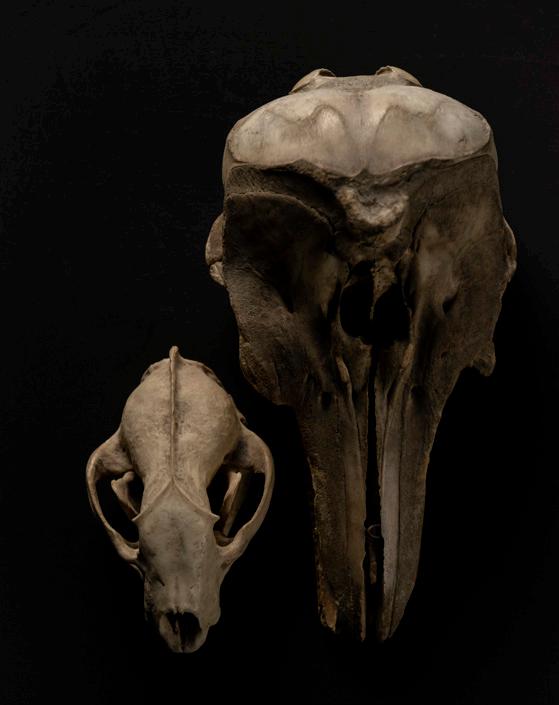


forensic anthropologist is the first to help establish who the person may have been in life. Were they male or female? Were they old or young? Can information being extracted from the bones tell us where the person was living and the food they ate? The short answer to all these questions is yes. Yes, you can paint a whole background picture using information found in bones. A forensic pathologist, on the other hand, so to speak, is concerned with establishing the main cause of death and is often consulted in murder trials.
By all counts, bones are not just a supporting structure within our bodies but rather a whole personal library about who we are that transcends the passing of time and holds information about the journey of life we have undertaken.
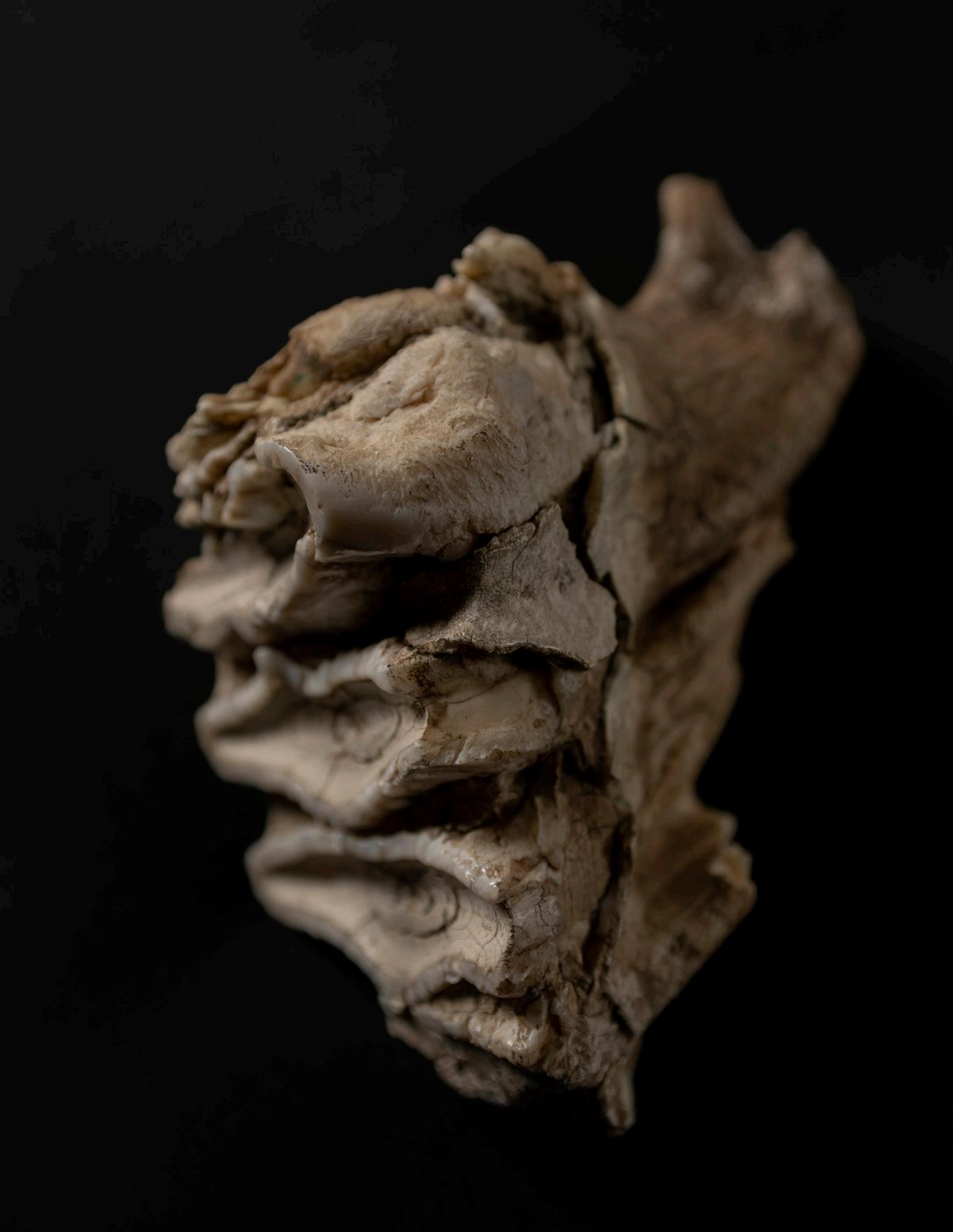
‘You can paint a whole background picture using information found in bones.’

Ross Lane and Jess Twyman of the Canterbury Archaeological Trust, who recently worked on the new King’s Science Building site, explain how they unearth the past to create foundations for the future.
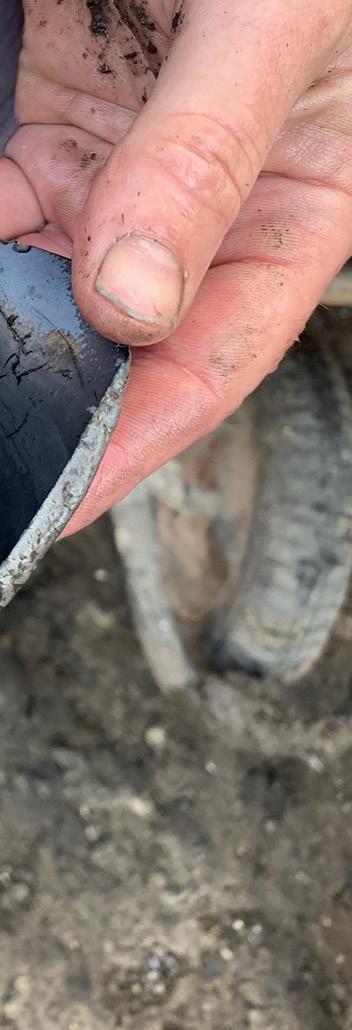
In the Spring and Summer of 2020, while the school was closed and the world was beginning to re-find its feet after Covid, a team from Canterbury Archaeological Trust began excavating the footprint of a new school building in the Mint Yard (Fig 1). This new state-of-the-art Science Building now stands proudly alongside the school entrance, its flint façade echoing those of the NineteenthCentury buildings around it. The archaeological work, funded by the school and supported by Coniston, with guidance from Historic England, has enabled a detailed understanding of this complex site and the preservation of the archaeology both by record (excavated), and in situ (retained in the ground).
The development presented an opportunity for the Trust to re-visit an archaeological sequence first investigated in 1979-80 during construction of the former Mitchinson’s House. The new building would be larger than its predecessor with a deeper basement, meaning that archaeological deposits left in the ground during the earlier build would need to be removed. This area of The King’s School, sitting just inside the Mint Yard entrance, lies within the outer precincts of the UNESCO World Heritage Site and Scheduled Ancient Monument of Canterbury Cathedral; this meant that where they could not be preserved, all archaeological deposits affected by the development needed to be meticulously excavated by hand and recorded by a skilled professional team before construction of the new building.
Working on a complex and deep urban excavation, often with restricted space and during a pandemic, had its challenges. The King’s School was enormously supportive, offering the team use of one of the music classrooms to enable the set-up of individual workspaces and a canteen area. Maintaining social distancing on site was not always easy, but the team worked together to find strategies to deal with the day-to-day logistical issues created by Covid (Fig 2; Fig 3).
The archaeological investigation comprised the complete excavation of a four-metre-deep stratigraphic sequence, spanning a period of 14,000 years from the Pleistocene to the late- and postmedieval periods (Fig 4). Excavations reached and, in some cases, went below the water table. This meant an unusually high proportion of waterlogged deposits, which contained organic material that does not survive in drier conditions, was preserved on the site. As a result, at the forefront of the excavation was an intense programme of environmental sampling. Over 6000 litres of soil were collected for analysis to recover environmental remains such as seeds, charcoal, shell, and insect remains. This data will enable the reconstruction of diet, climate, and the environment during the prehistoric, Romano-British, Anglo-Saxon, and medieval periods. Stratigraphic analysis of over 1300 contexts recorded is underway, and processing of finds has taken place that will lead to specialist reports, all elements combining to create the full and final record of this important and interesting archaeological sequence.
To be able to interpret the earliest development of the site it was important to understand the nature of the geology and the prevailing topographic and palaeoecological conditions (Fig 5). Much of central Canterbury, including this site, lies on river gravels laid down by the Great Stour, which in the past flowed across its flood plain within many braded channels. At Mint Yard, the gravels were truncated by a north–south aligned palaeochannel (an ancient river or stream), which drained into the Stour at about five metres below the present ground level. This channel contained deposits formed about 14,670 to 12,890 years ago. It was these early remains that presented the greatest logistical challenge when it came to excavation. Any area excavated at this depth quickly became inundated with water, making for very muddy working conditions indeed! The reward for doing so far outweighed the difficulties involved, because with such exceptional preservation it was
‘Over 6000 litres of soil were collected for analysis to recover environmental remains such as seeds, charcoal, shell, and insect remains.’
possible to collect fragile but still recognisable leaves that had fallen over 10,000 years ago.

The silting up of the many river channels by the late Iron Age allowed the establishment of a settlement at the crossing of the Stour. At Mint Yard, the earliest occupation comprised a system of drainage ditches constructed in the late Iron Age (from about 75 BC) (Fig 6). Abandonment occurred at the end of the first century BC, with evidence for the deliberate deposition of domestic refuse, including imported fineware pottery, terra rubra, terra nigra and Arretine ware from Gaul, alongside amphorae. Significantly, personal ornaments were recovered from one of the drainage ditches, with these finds perhaps deposited deliberately as an act of closure (Fig 7). Finds from within the ditch included an Aucissa and a Pelta brooch, part of a Roman toilet set, a clasp, part of a necklace and various other metal fittings (Fig 8). The waterlogged nature of many of these deposits meant that the metal finds had not oxidized, as they would in more usual dry conditions, meaning that they maintained their original warm golden colour and shine. These items looked as if they had been dropped yesterday, rather than two thousand years ago.
The development of Canterbury was swift after the Roman invasion of AD 43, with its theatre completed about AD 90. The wet and boggy ground within Mint Yard and the surrounding area was levelled for the formation of a north–west to south–east aligned road that formed the northernmost cardo (street) within the town, which was completed by AD 80. Within our site a line of stakes and posts were driven into the soft underlying mud, showing the line the Roman engineers set out for the road which was later bounded by a ditch (Fig 9). A substantial number of these timbers had survived, preserved in the waterlogged conditions with many still showing cut marks created by their Romano-British makers. At least ten phases of re-surfacing were identified, showing that the road was narrowed and slightly reorientated over time (Fig 10, Fig 11, Fig 12). Land to the south of the road was used domestically, with rubbish pits cut, the fills of which included preserved blackberry seeds among the artefacts recovered.
‘At Mint Yard, the earliest occupation comprised a system of drainage ditches constructed in the late Iron Age (from about 75 BC).’


‘Land to the south of the road was used domestically, with rubbish pits cut, the fills of which included preserved blackberry seeds among the artefacts recovered.’

‘Work undertaken in August 2022 revealed the line of the southern-most wall of the chapel and identified a later flint street surface that led up to Green Court gate, overlaying a much older paved surface.’


The Roman period within Canterbury spanned almost 400 years, and although activity within the confines of the site was predominantly centered upon use and re-use of the road, evidence for the decline of Roman rule and perhaps the disorderly withdrawal of civic norms was still apparent. By the late fourth century AD the Roman road had been abandoned. Excavation of two features, cut soon after into the final phase of roadside ditch, revealed partial human remains. Burial within the confines of a Roman town was not normal funerary behaviour, and these remains were deposited before establishment of any formal burial grounds in the area in the post-Roman period. This makes their presence anomalous and may indicate a rushed deposition amid chaotic events in the period at the time of, or soon after, abandonment of the town.
the cutting of several contemporary refuse pits. Sampling of waterlogged material within the pits recovered insects, invertebrates and waterlogged plant remains, including hazelnuts and an exceptionally well-preserved sloe, complete with stone and surrounding flesh. The faunal remains included the vertebra of a small cetacean (probably a harbour porpoise) and the shoulder blade of a crane.
‘The new school building thus forms part of the continued and varied occupation of this area of Canterbury that can be traced back for over 2000 years.’
Foundations of the Almonry Chapel built around 1317-18 had been recorded and subsequently removed during construction of Mitchinson’s House in 1980. However, work undertaken in August 2022 revealed the line of the southern-most wall of the chapel and identified a later flint street surface that led up to Green Court gate, overlaying a much older paved surface, perhaps contemporary with the chapel’s construction (Fig 14; Fig 16).
Following decline in its use, the Roman road surface had been cut into by features associated with at least one Anglo-Saxon building, and nearby pits contained refuse material relating to contemporary occupation (Fig 13; Fig 14). A thick deposit of dark soil covered the buildings and constitutes a period when the area was open ground used for cultivation. A fragment from a rare bone flute was recovered from the latter half of this sequence, which dates to the Ninth or Tenth Century AD.
The formation of the Almonry Court around 1155 represented the start of medieval activity on the site. Archaeological evidence for this included the laying of gravel surfaces and
The Almonry Court became known as the Mint Yard after it was appropriated by King Henry VIII in 1545 for use as a royal mint, though to date no archaeological evidence for this has been identified. The mint was short-lived, and in 1557 Cardinal Pole proclaimed the Dean and Chapter should repurpose the buildings for the maintenance of a grammar school for boys. In 1566 the King’s School was given use of the Almonry Chapel, after which it was used as a schoolhouse and as accommodation for the Headmaster and boarders. The medieval buildings were demolished in the Nineteenth Century, with the site remaining empty until construction of Mitchinson’s House in 1980. The new school building thus forms part of the continued and varied occupation of this area of Canterbury that can be traced back for over 2000 years, a story that was recorded within the soil layers upon which it now stands.


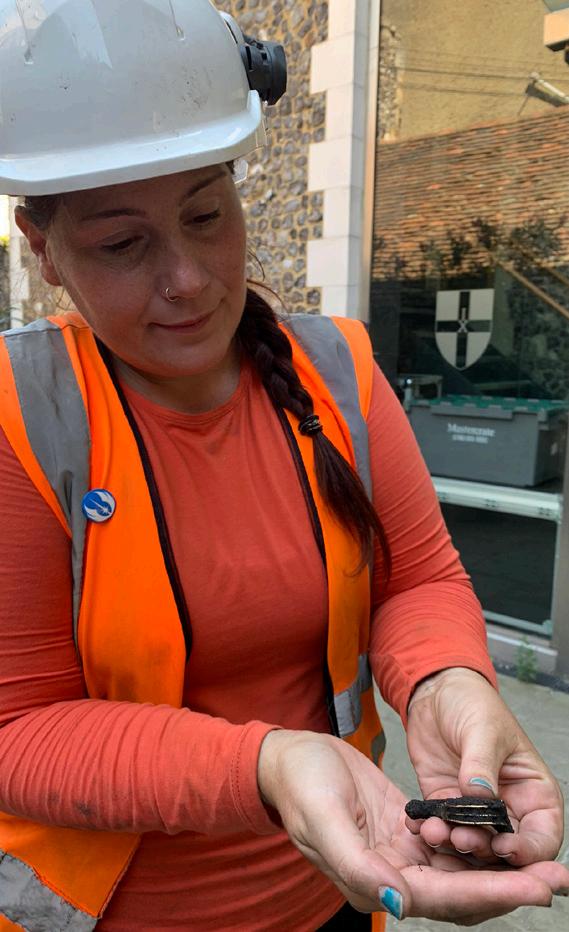







We asked master chef, Andy Snook, for one of his favourite recipes. He chose Katsu Curry.
This popular Japanese chicken katsu curry is easy to make for a low-cost midweek meal. You can prepare the curry sauce in advance, and the strips of chicken are quick to coat and fry up into hot crispy pieces.
For the sauce
• 1 brown onion, chopped
• 1 carrot, chopped
• 1 tbsp sunflower oil
• 2 garlic cloves, crushed
• 2 tsp grated fresh ginger
• 1 tbsp medium curry powder
• 1 tbsp plain flour
• 500ml/18fl oz chicken stock
• 1–2 tbsp soy sauce
• salt and freshly ground black pepper
For the chicken
• 400g/14oz chicken mini fillets or 2 chicken breasts, cut into strips
• 1 tbsp plain flour
• 1 free-range egg, lightly beaten
• 100g/3½oz dried breadcrumbs or Panko breadcrumbs
• 3 tbsp sunflower oil
Serve with
• Jasmine rice, Udon or Ramen noodles and stir-fry Vegetables
1. To make the sauce, put the onion, carrot and oil into a saucepan and cook over a low–medium heat for 4–5 minutes, stirring frequently, until soft but not coloured.
2. Add the garlic, ginger and curry powder and cook for a minute, stirring often. Add the flour, mix well and cook for a further 30 seconds. Gradually add the stock, stirring constantly. Bring slowly to the boil, reduce to a simmer and cook gently for 10 minutes until smooth and thickened.
3. Blend the sauce until smooth using a stick blender and season to taste with soy sauce, salt and pepper.
4. To prepare the chicken, tip the flour onto a plate, the beaten egg onto another and the breadcrumbs onto a baking tray.
5. Coat the chicken fillets in flour, shake off the excess, then dip into the beaten egg to coat and shake off any excess. Put the chicken into the breadcrumbs and turn gently so that each piece is evenly coated.
6. Heat the oil in a large frying pan over a medium heat. Add half of the chicken pieces and cook for about 3 minutes on each side, or until golden. Remove from the pan and keep warm while you fry the remaining chicken.
7. Serve the crisp chicken with steamed rice and the hot curry sauce poured over.
The curry sauce can be prepared in advance and kept in the fridge for 2–3 days or frozen for up to 3 months. Why not make a double quantity and freeze half for another time?

We caught Dr. Fede Elias, Physics Teacher, star-gazing on the Green Court again, but with a new toy. It’s a stellar bit of kit.

ANewtonian reflector on a Dobsonian mount is the perfect grab-and-go instrument for those rare evenings of ‘cloudless climes and starry skies’. The mount moves smoothly, allowing the observer to rotate the telescope and to change its angle above the horizon with a slight pressure of the hand. This very basic manual control does not require any tedious setup, so one can start observing as soon as the telescope is out. The large mirror, 8 inches in diameter, is key to achieving high-resolution images that allow high magnification without losing detail.
On a good night, zooming up to x250 is achievable, and therefore the views of the moon and the planets are superb. We were observing sunspots, and the reflective cap on the telescope is really a solar filter that blocks 99.999% of the light. It is dangerous to look at the sun with the naked eye, much more so with a telescope, unless you have a good filter!


Follow @_watch.the.skies_ for more starry goodness.

‘We were observing sunspots, and the reflective cap on the telescope is really a solar filter that blocks 99.999% of the light.’

Blood may rush beneath their feet, Starvation may loom in a nightmare heat But still they reach for a hand or two Invisible to the world. Unknown to you.
They kneel on cold stone so close to the ground But look up to a voice. A voice with no sound. Tears run down their cheeks as they pour out their Sins. Greed. Hatred. Please forgive. They are free.
Words on a page written by someone long forgotten At some time on some day But still those phrases narrate their lives And save them from the darkness. They see the light.
Continents are crossed day by day. They follow a leader who must know the way. Their faith has no borders; no trust is so great. They will follow that light through the right gate.
Stronger than most, they do not need to look Around the corner. For together they know they will not falter. Sitting alone, trembling with fear, they feel A warm hand on their shoulder. A safe presence always near.
And still the eyes of the world look down On the people who see life as a gift. Not a chore. They have all they need and will never want more. They are free in their belief. A beauty so frequently ignored.
So, as those dull and dreary words roll off the preacher’s Tongue, remember they are a precious song saving someone.
If only you were so lucky.
Natalya Hoare Winner of The Sebastian Barker Poetry Prize 2021
 Artwork: Issy Savage
Artwork: Issy Savage
When I first came to King’s, I thought I would never hear anything as ethereal as the singing of choirs in the Cathedral again. On the nave roof, I had spent years wedged against my kind. All we could do was listen.
We were replaced, transported and stored up by the school mason. We all sat still, wishing not for the first time that we could waltz with the slender shadows sliding over us. Nothing to hear, nothing to see, and nothing to say, until...
‘Tom, would you be so kind as to provide us with some of the old stone blocks? Our Art Scholars are starting a new project on stone carving.’ ‘Sure - give me a moment.’
Light flooded our empty faces as we were hefted out into the luscious open air.
That was when the students came pouring in, along with shimmering words tumbling from their lips as they chatted. I basked in it like radiant sunlight that soaked the students from head to toe. Then there was a sudden harsh banging. Aware of a student towering above me, I figured that she was making the racket. Chisel in hand, she dealt jarring blows to my grey face. I was unable to flinch as chunks of my cheek were dislodged and spun through the air. Amidst the thundering of chisels, I picked up something else. It was a quiet but frantic thudding, like the powerful flutter of wingbeats. I shut out the chiselling for a moment and reached for the mysterious sound. It seemed to ring from the student scraping pieces off my cheek. I realised that I was listening to the pounding of her heart. Beneath that, a lucent voice was whispering.
‘This is surreal. A small yet glittering city had been my home for as long as I could remember. I had never expected to bid it farewell, but I left behind everything I had known and loved. Friends and family... everything that had watched me take my first breath.’
Startled, I pulled away. I had never come across a heart’s voice before. The pounding was still there, driving curiosity into me with every beat. I reached for it again.
‘Why am I standing here with a suitcase of memories, when I could have turned and walked back, back to familiarity?’
The chiselling stopped. The voice trailed off as the students withdrew and headed away. No! Don’t go! I wanted to call out to the girl and hear more from her heart. But she was already gone, leaving me with more than just shattered cheeks.
Imagine my elation when the students came back a week later with their chisels. I did not mind the noise, as long as I could listen to the girl’s heart. I searched for it once again, but this time it was beating more steadily. The whispering was barely audible; I could have easily mistaken it for gentle rainfall behind her ribcage. She was speaking aloud, exchanging words with another student nearby.
‘The lasagne at lunch was amazing.’
‘You were even more amazing at fencing today. I got stabbed five times!’
They tossed laughter at each other like gold coins. ‘Oh, good luck on your small test tomorrow in French class.’
‘Thanks! What are you carving?’
‘A turtle. You?’
Surprise tingled through me. The students had been carving us all along – and the girl had made a friend. Her heart was now beating in a calm rhythm as she chiselled.
‘That’s adorable. Mine’s a gargoyle.’
‘Nice!’
They worked in a companionable silence from then on, and eventually left with the fading sunlight resting on their shoulders. The girl seemed to stand taller, her steps firmer than before.
In the following weeks, the students came and went, and finally we were finished. The girl looked at me closely for the first time, and with a smile ran her fingers along the turtle’s shell she had carved on me. Hesitantly, I reached out for her heart and instantly encountered its voice. It was clear and steadied by her pulse.
‘I get it now! I know why I did not turn back when I could have done. Everyone has been there, at a junction. At King’s, everyone takes a risk at some point in time. It could be as simple as taking part in a performance, trying out a new sport or making conversation. I chose to take that risk. It is the experience that counts. Afterwards we all become a little braver and wiser.’
When I was whisked off to the girl’s day house, I witnessed every dedicated rehearsal of the house song and hearty laughter escaping from the students while they played badminton. I heard them mimic seagulls in the garden where I stood.
I listened to the buzz of activity in the school while teachers and students went about their day. I listened to the clatter of utensils and scattered conversation. I listened to warm greetings shared by friends, new and old alike. I listened to flutes whistling and the murmurings of piano keys that wafted around like a gentle aroma. It was a symphony in its own way.
As I stand in the courtyard now, the girl who turned me into a turtle seldom notices me as she walks past with her closest friends, talking fondly of their tiniest delights at school. I do not mind. I am a mere image of what she no longer resembles. She has ventured out from her shell, ready to embrace everything ahead in life, be it an obstacle or an opportunity.
When I first came here, I thought I would never hear anything like songs in the nave again, but now I know that the songs of the heart are just as beautiful as those of a choir, especially here at King’s.
 Artwork: Helen Zhang
Artwork: Helen Zhang
When I first came to King’s, I was still in nappies. Looking up to pupils as a Housemistress’ son, every year was closer to joining the Senior School. I was informed at the age of ten that I was leaving. I was distraught. It was the night of the pantomime - a Broughton tradition. There was nothing funny about the way I found out. Walking through St. A’s on a beautiful Winter night I reminded my dad how lucky we were to be able to live here for the next five years. His response was priceless. ‘Not any more,’ he replied. I confronted my mum about what he said, and she came clean. That was a long night. When I finally came out of the bathroom, my hiding place, we only had five minutes to get to the Marlowe. We somehow made it and managed to get a bag of sweets (a privilege I managed to exchange for my sorrows). I knew we were leaving, but little did I know the King’s curse would bring me back.
And now, I stood there. Isolated. In front of hundreds of unfamiliar faces. Despite my time in Canterbury Cathedral Choir, I had never felt this nervous. I started singing. The sound reverberated round the vast quire. Half the school’s eyes were on me. The solo finished. I sat down. Finally, I looked up and was reassured that I had done well by the smile on someone’s face. My nerves suddenly disappeared. I knew I would never have to worry about a solo here again, as the school would be supportive no matter how well I had done.
Since joining King’s, my achievements have exceeded my expectations. After finishing as a Chorister, I joined King’s as a place where I could continue to excel musically, but also academically. King’s for me has been a highly interesting experience and I feel proud to be a member of this school. I assumed my first day would be easygoing. My assumptions were wrong. On my first day I had an hour-long Crypt Choir rehearsal, and from then on I knew I was in for a life full of music. Following a rehearsal, I was approached by the King’s Men to join them, and instantly felt accepted into the musical community at King’s. Since then I
have recorded requiems, performed frequently, and sung in almost every service on Sundays, which I otherwise wouldn’t have had to attend. Some people see that as unlucky, but for me it is a great thing to be singing once more in the cathedral where I had already spent so much of my life.
Earlier in the year, I struggled to balance everything I was doing, but I discovered new ways to manage my time whilst completing preps and doing a lot of music and my other main passion, drama. I auditioned for the musical and was over the moon when I got in. We had the best time in rehearsals and on show nights. Later in the year, I started to realise it was hard to do three extracurricular languages on top of preps and all my musical commitments, and so I made the decision to drop them. It was a wise decision on my part, and I am very glad that pressure has been taken off now. Throughout the year, work has been getting harder, and I have had less time, but I have adjusted to that now.
I often feel like a boy in a sweet shop: so many extra activities and opportunities to choose from that it is almost difficult to not do everything. However, I have started to balance everything I am currently doing and I don’t want to jeopardize my current trajectory by taking too much on. I have recently been working more than ever on doing everything I want to without becoming too stressed, and I am now thriving in sports, academia, drama, and music, all with the same schedule as before.
I am so glad that I joined King’s, and feel I have really made the most of my opportunity to be at such an amazing and prestigious school. I can also fit in my social schedule, which means on top of all of this I can still spend time with people who mean a lot to me. Now more than ever do I feel like a true King’s boy, even after spending eight years of my life in King’s already!
 Artwork: Eliza Percival
Artwork: Eliza Percival
When I first came to King’s, Autumn had just begun.
As I stepped out of my car, a howling wind threw a flurry of russet leaves at my feet. Two archways gave a glimpse of the school itself. A grass court of parakeet green was discernible, bordered by tall stone buildings, with a wide path between the two. It all looked a great deal bigger and grander than I had expected.
King’s was not for the likes of me. I had never thought myself clever or confident enough, having received a modest education at a quotidian grammar school. So it was with hesitant determination that I grasped my satchel and marched through the archway towards my new job.
The grounds were completely empty. Echoes of birdsong from the oak trees surrounding the Green Court floated down to me. I forgot, for a moment, that I was in the middle of Canterbury. The late afternoon sun cast a hazy butterscotch shine. I tilted my head to bask in the gentle gleam. My first proper job would turn out well.
But that confidence did not last to the start of my first lesson. I’d spent evenings perfecting the lesson plan, with colour-coded contents and neat tables. Now a shrill metallic jingle signalled my entry to the classroom. I stared straight ahead. My eyes seemed to be stitched to a small patch of wall between two posters. My throat felt sticky.
The class was murmuring in lowered voices. When I came in, they stopped abruptly. This was at around the time that doddery male Latin teachers were slowly giving way to fresher arrivals, but it was still rather unusual to see a youthful, inexperienced but determined female Latin teacher.
At the time, I simply thought the silence signalled my ‘classroom presence’, something my course at teachertraining college had spent an entire unit on. So, buoyed up by what seemed a newfound talent to command the room, I launched into a lively (and, I suspect, somewhat unnerving) introduction, giving away perhaps a little too much personal information. When I paused for breath, I suddenly became aware of subtly rising eyebrows and darting eyes.
Alarmed at this accidental first impression, I floundered in my words, my voice grew muffled, and all confidence in my ‘classroom presence’ scampered out of the window. I had made a complete fool of myself –and painfully drawn attention to my identity as an outsider. How was I meant to educate this hand-picked selection of England’s finest when I couldn’t even introduce myself?
I would have stumbled out of the room and started writing my resignation letter if a boy near the back had not raised his hand.
‘Miss?’ he asked, in clear, phlegmatic tones.
‘Y…yes?’ A voice completely at odds with his own.
‘I enjoyed hearing your intro. But I have a music lesson soon, and I was hoping to learn a few Latin words before then. Would you mind giving us some vocab, even if it’s not what you were intending to teach?’
In that instant, for me, it clicked. It didn’t matter what the class thought of me. I had as much right to be there as they did. Here was an opportunity to teach them a unique skill, and I would make the most of it. With renewed passion, and a deep breath, I answered. ‘Of course. An excellent idea. I think it’s time we looked at Latin greetings. I have some textbooks here. Please hand them out.’
I do not remember the rest of the lesson, just a growing sense of jubilation unfolding inside me that for a whole year I would be able to impart the language of an empire, conquerors, and history to a class that actually wanted to learn. How amazing!
Another vivid memory is lunch in the dining hall early on, after my lessons. It was a Friday, and fish and chips was on the menu.
I received mine, and found a seat at one of the tables dedicated to teachers. There were clear circles of friendship, deliberate empty chairs to mark out territory. Uncertain, I headed for the far end, where an elderly teacher sat alone.
‘Do you mind if I sit here?’
‘No, not at all,’ came the sprightly reply. ‘You must be new. Nice to meet you. I’m Henry.’
‘Victoria.’ I slid into a seat opposite. ‘Yes, I started a few days ago. I teach Latin.’
‘Ah, Latin!’ Henry chuckled. ‘The notoriously boring subject. Do you think you can change that?’
I felt slightly startled at the question, but answered swiftly, ‘I really do hope so. I want to be able to show people why the language is useful, even now. I’m so glad to have the opportunity, at this school.’
Henry closed his eyes for a moment.
Then he said, ‘Do you know, I’m about to retire this week. The students have shown me so much, but when I came here, 30 years ago, I felt terrified of teaching in a school like this. In my first lesson, the boys stuck a piece of chalk between the grooves of my eraser. Whenever I tried to rub something out, I drew lines instead. I wanted to run out of the school and never return. But I managed to carry on, and I know I’ve made the most of my career by teaching here. I hope, and am sure, that you will too. Astra inclinant, sed non obligant.’
I considered, then nodded. It was a good saying.
 Finn Cleghorn-Brown (6b, GL)
Winner of the Somerset Maugham Short Story Prize 2022
Finn Cleghorn-Brown (6b, GL)
Winner of the Somerset Maugham Short Story Prize 2022
It was a work day, and for prisoners like us that meant heaving pickaxes to crush rocks, and scrape dirt under the sweltering midday sun. The agonising lift, each inch tearing muscle from bone, was followed by a brief respite of the downward clatter against unyielding rock. Swish, smash, swish, smash. A rhythmic trance took hold of us and, forgetting the harsh hold of our leg shackles, we felt something beyond the sharp twitches of our traitorous muscles: the rattle of our chains with every swing, the clash of tool and earth with every impact, the scramble of feet with the reverberation of force through our skeletons.

There began a song. I closed my eyes.
A shout! A command. A disruption. Like a mistimed accompaniment, except it demanded the song’s end, but, against expectation, the song grew louder. The previously confused scramble of feet had turned into a sure march following the crashes of our picks.

A shout! Again, another disruption, yet with a lesser effect. The now overwhelming song overpowered the cries of the few guards on duty. Soon a whistle was blown, as perfectly offbeat as possible.
Other guards poured into the field where we worked, like an infection entering a wound. Armed with batons, they gave us a final, full-volume warning to cease our indignation. However, a thought entered our collective mind all at once: the guards were holding batons, rarely something an unarmed prisoner would try to resist, but we were not unarmed. Our pickaxes became our keenest defence and we put them to good use, but not as weapons. There started an irregular clattering as we took them to our chains and shackles. A few swift clangs and crashes and we were free. Like leopards, we leapt through the field of jagged rocks and crusted mud. We were fatigued and bruised, attentive and deaf, but free and fast.
Almost implausibly we made it to the woods without a graze. Not a single trip nor stall hindered our freedom march, but there was no time for rest. Next came the barking. Without a word we agreed to separate into smaller groups and ran through the woods, trying to dodge the dogs of our savage pursuers. I was in a group of four men. I tripped on a tree root and my head hit a rock. That should have been it, the end of my escape, if not my life, but I hadn’t even reached the chorus just yet.
When I woke I found myself not on the cold mat of the forest floor but in the warm embrace of a freshly laundered bed. I looked around the room. The glow of the setting sun had been replaced with the fervent crackling of a fire, and the trees of the forest with the logs that composed the walls of my new abode. I noticed the proud moose-head on the wall opposite. We both had come from forest to room with little explanation of how or why. Of course, I was better off than the moose. I checked for handcuffs, and leg-cuffs. Perhaps a guard had helped me to the nearest medical authority but not left me free. Or maybe there was a bounty upon us and the person whose bed I now occupied would make good on the prize. Paranoia – all of it. My wrists were now as ungrappled as my mind had been back in captivity. Likewise, my ankles were now free of claws.
My curiosity now tantalised, I had to explore further, but when I leant up I found myself overcome with dizziness. What followed was a swift swish as my head hit the pillow it had just left. When I reached up to my head and felt a damp cloth I realised the scarlet source of that dampness. The doorknob began to rattle. Someone was fumbling with it on the other side. I clenched every pore to greet my saviour.
The door swung open in a poorly controlled clatter and an elderly man holding a sponge and tray wafted into the room. He came to my side in silence. Setting
the tray down on the bedside table gently, he took a seat and began to do his work. He removed the blood-sodden cloth and a sharp antiseptic stench engulfed my nose. This odour spurred me awake. I asked him who he was.
‘Who do you think I am?’ he chuckled.
Frustrated by the energy needed for every syllable, I uttered the word ‘please’. He capitulated with a halfanswer: he had been sent to take care of me. He was a jolly man – thickset, with a mane of spun silver and a smooth round face: not the hunter you’d expect to find living in such a home, but perhaps this was why I had awakened unrestrained. I felt a tug as the man finished securing the new cloth with a knot. Perhaps prematurely, I forced myself upright and turned to place my feet on the wooden floor. I felt my weight and staggered to my feet like a fawn on ice. My legs achieved a cautious stance and I hobbled over to the fire. I must have made a piteous sight.

I listened to the crackling fire, its cadence like rhythmic picks and chains heard. Day broke through a window behind my caretaker. The rising sun excited the frosted landscape into a marvellous dance of sparkling colours and I felt a swell of emotion take hold. In my relief a knot of anguish escaping my throat nearly strangled me. The pressure spread to my eyes and the glistening view was blurred by the brilliant glitter running down my cheeks. Was this the face of freedom?
There was a deep, jovial chuckle. ‘Wonderful, isn’t it?’ he asked. I did not reply but wiped my eyes. I had never seen a sight so celestial. And then I felt the man was perfectly akin to his home.
He joined me by the fire and spoke more of his thoughts. ‘Amazing how that tuneful song can be composed of a series of perfectly sequenced clashes of light.’

We stood there side by side for a moment before the caregiver offered me a meal. He led me down the stairs into his modest yet wellcomposed dining room. No moose heads here. Instead the walls were a scattered with butterflies, each painted with a wonderfully unique pattern. There were so many it seemed they were trying to raise the room up to the angelic realm only they could visit. My caretaker re-entered the room with an oddly extravagant tray. We sat in silent company until I had to speak. The dam broke and from a flurry of queries he answered only one.
‘I find the highest authority to be that of a man’s own conscience,’ he said softly. ‘In my experience, that will punish and reward us more justly than any judge.’
I leant back in my chair, wondering if he knew my lack of freemanship. No, it simply was not possible. When he found me I had been wearing those shattered shackles – they’d have given me away at once. I decided not to push it. It was not a regal meal but to a famished man like me it could have been the nectar of the gods. When we had finished, I asked one last question. ‘When may I leave?’ My caretaker gave me a grin and a sideways look, and said I was under no obligation to stay. I could leave whenever I wished.
‘Oftentimes in life it is not when we may leave but how long we may stay,’ he said.
It was not long before I knew what he meant. I hoped to stay until my head was healed and I was fit to face the troubles of the world. But that plan was foiled one night near sundown when I was heading to bed and stumbled, catching my toe on the final step. When I tripped I found the world consumed again with the darkness of my eyelids, and when I opened them I found myself back in the field I had escaped. The song had finished. Once more I heard the sound of pickaxes on ground. Swismash, swi-swish, sma-smash. I should have wept like a child, but as I listened to the clanging and clinking of tools and rock, it dawned on me that they may one day resynchronise, and I might once more hear that joyous song.
‘Oftentimes in life it is not when we may leave but how long we may stay,’ he said.

Once more I heard the sound of pickaxes on ground. Swi-smash, swi-swish, sma-smash.

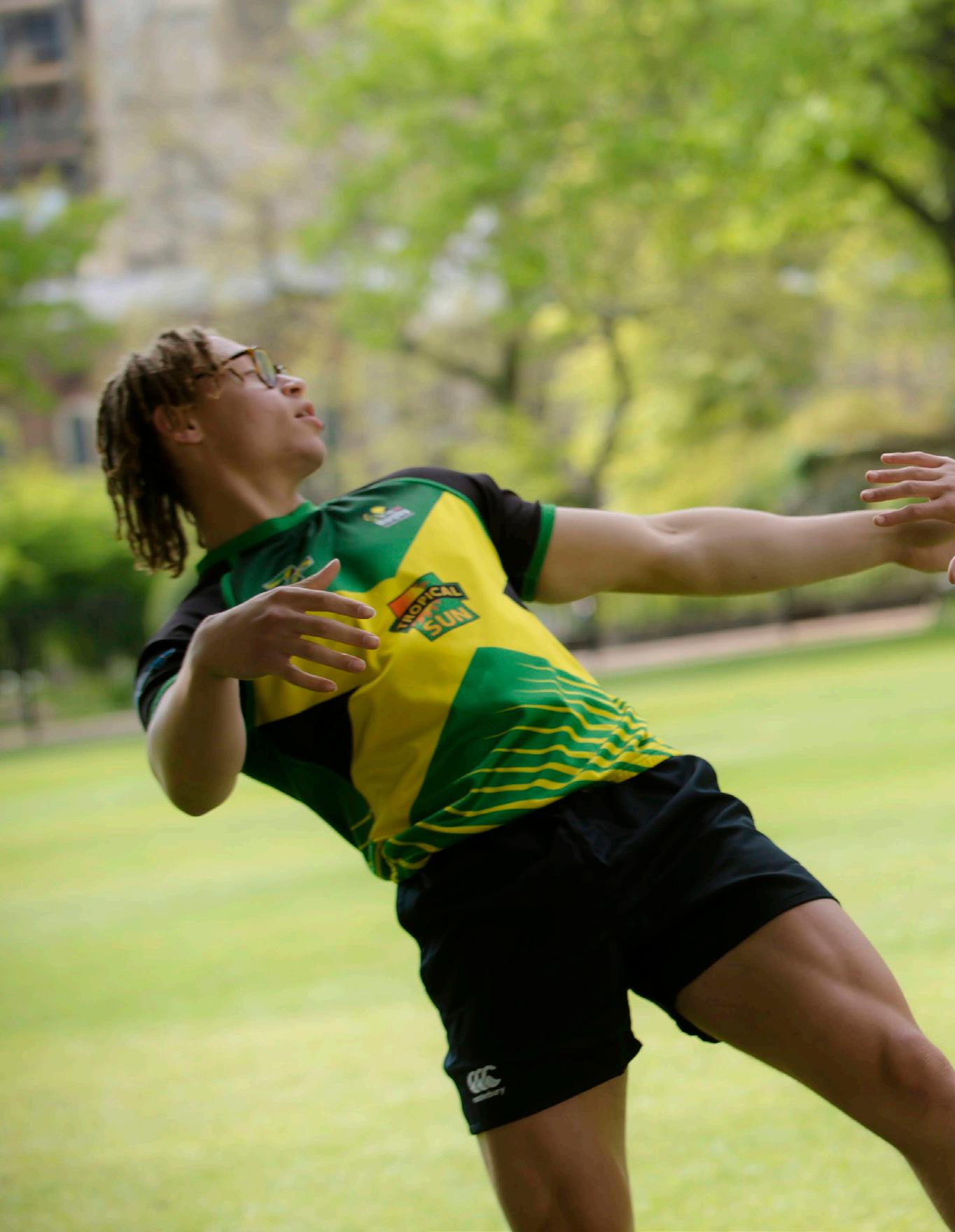 Jack Pelling (6b, LN) and Lucy Andrews (6b, BR) celebrate a busy year on the pitch, court and water.
Jack Pelling (6b, LN) and Lucy Andrews (6b, BR) celebrate a busy year on the pitch, court and water.




The Rugby season started with an exceptional and memorable preseason which Mr Lister organised. This was a brilliant opportunity for the squad to build some good chemistry which benefited us throughout the season, on and off the pitch, as it has always done. The 1st started out the 2021/22 season very strong. Our captain, Ludo Kolade, led us to four strong victories against Cranbrook School (15-0), Duke of York’s (39-0), The Marsh Academy (62-7) in the first round of the national vase, and finally Caterham (247). Sadly, we had our first loss of the season in the second round of the National Vase to Maidstone Grammar, where we narrowly lost 12-17. We went into half term having played 8 and won 4, a strong run. After the break we flew out of the blocks to beat Sevenoaks 37-0, followed by Reigate Grammar and Worth. For our last match of the season we took on our city rivals, Simon Langton Grammar. This was our last opportunity as a squad to protect our Birley’s fortress together. Both teams started off strong, with Langton leading 7-5 at half time. Langton got an early penalty, putting them further ahead at 10-5. Minutes later we returned the penalty, lowering the deficit to only 2 points. The game stayed very close with
Langton coming away with another try in the last few minutes which was then converted, and the match finished at an unfortunate 8-17, a score to carry drive into our season this year. Our season ended Played 12, Won 7, Lost 5. Overall, we scored a total of 276 points and conceded 143. But putting aside the scores, the most important things were our determination and connection, supporting a team and rugby club legacy, culture and reputation of one team, always working, always enjoying. We had a memorable season competing in both the Kent Sevens and the Rosslyn Park Sevens where sadly we didn’t make it out of our group in either one, but it was a perfect opportunity for the squad to play together for the last time and enjoy the game we all love. Our squad for the 2022-23 season seems a strong fit, with a number of boys having played in the XV in their 6b year, who are all eager to get back on the pitch to move a ball around. From the 1st and the rest of the rugby club, huge thanks go to Mr. Lister, Head of Rugby. Our season wouldn’t have been possible without the huge effort and hours put in by such a passionate coach and leader. Equal thanks to the coaching team and a special mention to our physio, Max Ganderton, from The Natural Order.
‘It was a perfect opportunity for the squad to play together for the last time and enjoy the game we all love.’
‘Putting aside the scores, the most important things were our determination and connection, supporting a team and rugby club legacy.’

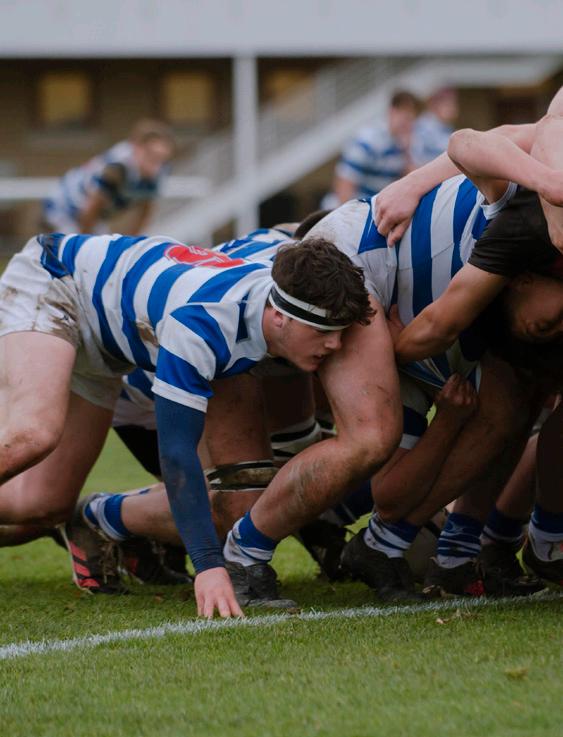
‘Our season wouldn’t have been possible without the huge effort and hours put in by such a passionate coach and leader.’




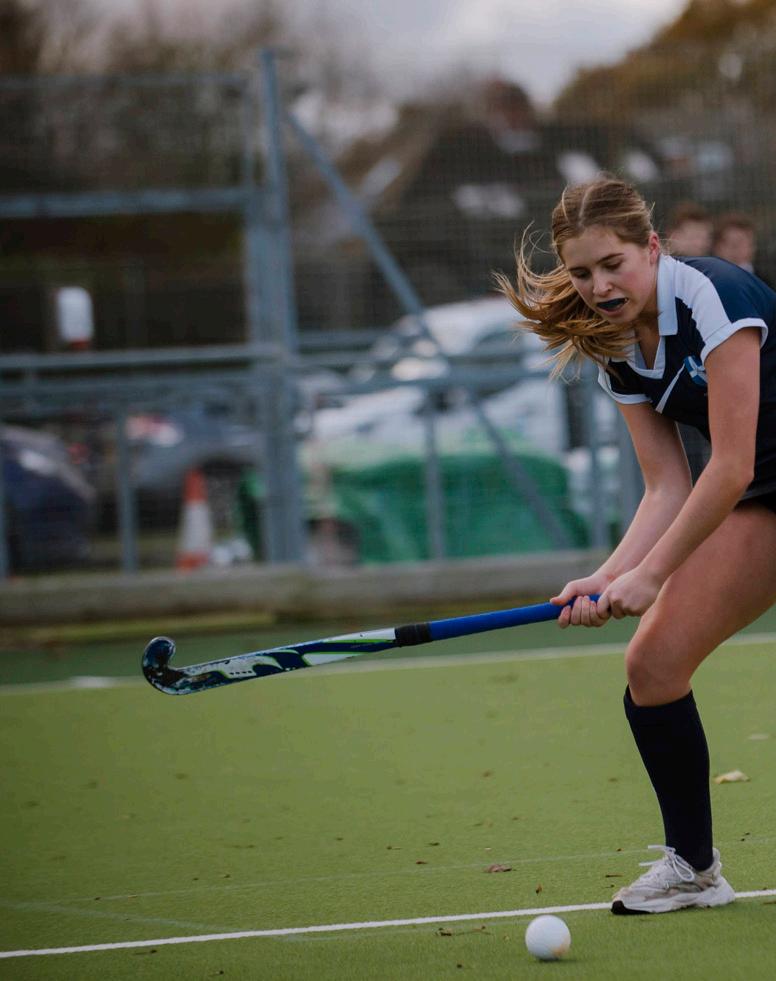
‘Hockey at King’s has also led players out of school where one pupil spent valuable time over the summer break teaching a group of refugees how to play hockey.’
We started our 1sts hockey highlight, the Frank Mason tournament, on our home pitch of Birley’s, where our captains, Sam Newson and Alex Harden, led us into a challenging group stage. A very strong side from Tonbridge caught us off guard and we let a soft goal in, putting us 1-0 down. Sadly, we didn’t recover fast enough and suffered our first loss of the season. Shortly after, we played Sutton Valence. Neither team could get the ball in the net, ending the game at 0-0. After a slow start from us in goals, we played Duke of York’s, where we scored 2 goals, which put us second in our group. The knockout stages were at Kent College, where we started off by knocking the home team out with a hard-fought 1-0 victory. Through to the semis. Playing a very strong St. Lawrence team, we opened the scoring, which rattled the favourites, but they came flying back to win 4-1, with three of their goals scored from short corners, with each one flying into the bottom corner with dominant speed and precision that we will be ready to face

next season. It was a brilliant run from the 1st team, and we were very proud to have made it to the semi-finals, eventually losing to the winners. This King’s team carries some serious talent, and this was shown with 9 wins, 2 draws and 3 losses, including the Frank Mason. We scored a whopping 37 goals with only 15 being scored against us, more than a two-to-one ratio. Going forward into the 2023 season the team still carries the best of King’s talent. A big thank you to Mr. Laslett and the rest of the coaching team for making this such a memorable and successful season. Hockey at King’s has also led players out of school where one pupil spent valuable time over the summer break teaching a group of refugees how to play hockey. Our sport can make a difference, not just where we play for our badge but teaching others from the faultless coaching we get here. This all stems from our school’s attitude of gratitude and inclusivity in King’s sports to spread it externally, defining King’s performances on and off the pitch.

‘Our sport can make a difference, not just where we play for our badge but teaching others from the faultless coaching we get here.’
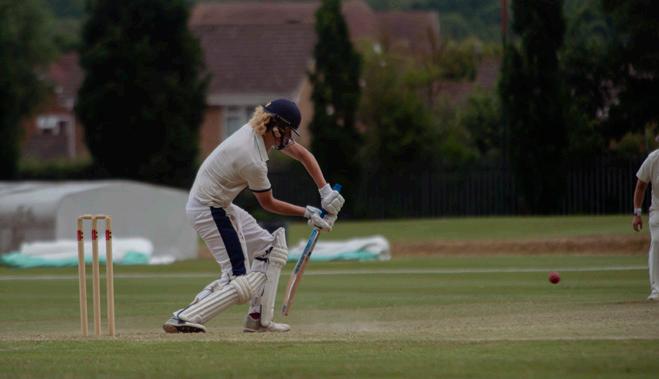
With a 16-game season the 1st XI cricket headed into the season to meet Worth School, but in the first two matches they got off to a walking start to eventually find their feet against Kent College, winning by 57 runs. From there they persisted through the season up against a multitude of strong sides. One memorable moment was a terrific spell of bowling by Nick Connor. Arriving in Sevenoaks to a grey sky, King’s lost the toss and was placed in the field. Taking the new ball, Nick started off the innings by beating the bat first ball. Looking dominant, Nick quickly disposed of both opening batters. These two wickets were then followed by another two, with Nick finishing off with figures of 10-3-38-4. Following came a T20 against Judd. Set a target of 145, spirits were high as our captain, Felix Turl, and Kai Smith approached the wicket. However, after a quick flash of wickets for few runs, Set Rahmen and Will Brunt found themselves out on the wicket. With consistent but low run scoring, Set and Will kept the game alive. Needing 11 off the last over Will, accompanied by Henry O’Connor, had a chance to snatch victory. With scores level with one ball to go, Will found the gap, bringing a boundary and the game to King’s. This thrilling game showed how this team was one of persistence, even in times of doubt even if they were missing key players throughout the season, like Kai Smith. The season came to an end with a tough results sheet. A tenacious and connected team will be carried into the next year and beyond, holding a strong base for King’s cricket to continue flourishing. Special thanks go to Mr. Singfield and Mark Ealham.


‘This thrilling game showed how this team was one of persistence, even in times of doubt.’
‘A tenacious and connected team will be carried into the next year and beyond, holding a strong base for King’s cricket to continue flourishing.’
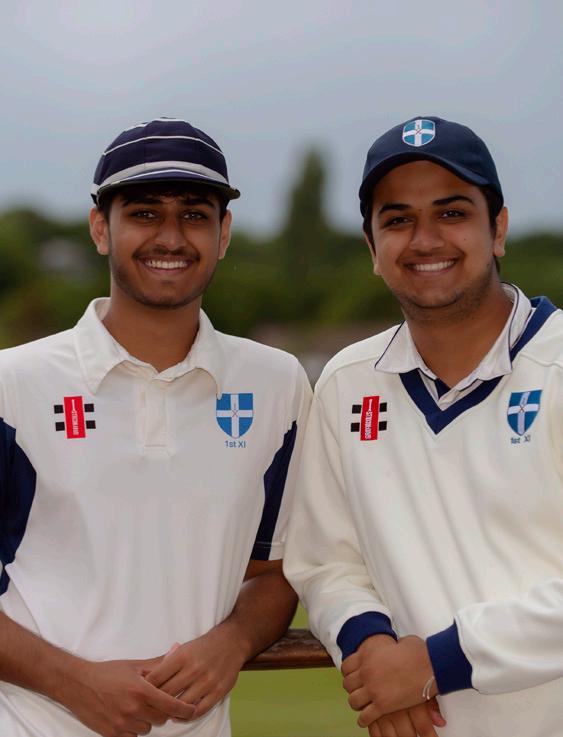
‘Looking dominant, Nick quickly disposed of both opening batters. These two wickets were then followed by another two, with Nick finishing off with figures of 10-3-38-4.’

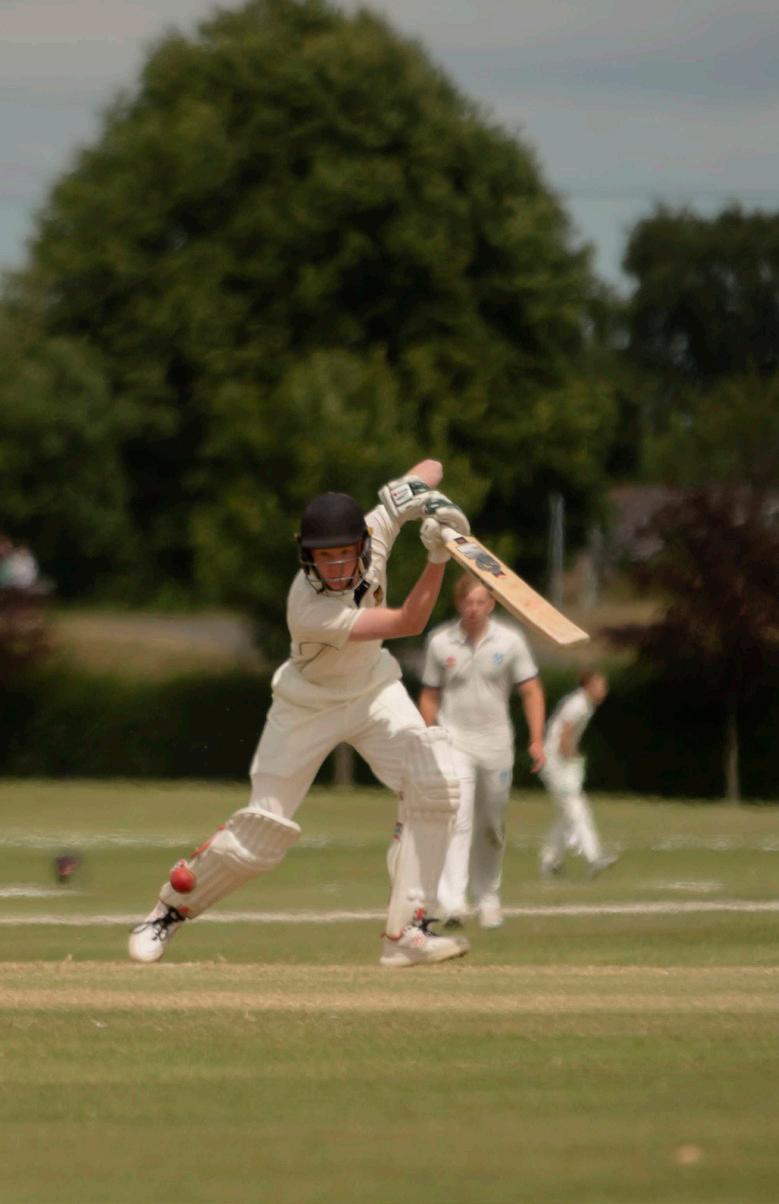


‘With some tough fixtures the staff and players maintained sturdy motivation to improve, and are more than ready to build towards greater success.’

Football continues to grow. The 2021/22 season saw a vast number of successes for many teams. What was most pleasing was the much-awaited return of the Surrey and Kent Independent League (SKIL), a playoff between several schools to form a league and compete for silverware each year. One highlight came from the U16A side, who scored fourteen goals in five matches, conceding only three, and triumphantly winning their league by five clear points. Clearly this was a dominant performance from a great group of players and the future looks promising for the football club. The 1st XI had a more difficult season with an unlucky draw when travelling to Sevenoaks for the first match. Ultimately this saw the eventual league winners come out on top and it was difficult to rebuild momentum thereafter. However, with the addition of new coaching staff, facilities and equipment, the players have adapted well to a new style of football and progressed week after week. A strong performance against St. Dunstan’s College highlighted how far the team have come and what they are more than capable of achieving. In the Junior end of the club
numbers were consistently high and the pupils benefited from using the University of Kent 4Gx artificial pitch. This saw an increase in core skills and the pupils’ ability vastly improved over the term. With some tough fixtures the staff and players maintained sturdy motivation to improve, and are more than ready to build towards greater success as the years pass by. Coming up for the football club we have a packed pre-season event over the Christmas break with a more structured and competitive September 2022. We are also introducing Kent Cup fixtures for our newly formed Girls’ Football Team at U16 and U18 level. King’s football winnings and coaching wouldn’t have happened without Mr. Gardener and every one of the coaches, and thus a big thanks goes to them. The Football Club has looked at their impact outside of the King’s community and have opted for a more sustainable ball provider: with links through the charity Alive and Kicking we are using recycled footballs: a reflection of movements spreading through King’s sports to make our equipment more ethical and our facilities with coaching more inclusive.

Tennis 2021 – 2022 was a successful season. We were able to produce 18 pairs and have them all play regular fixtures. U15 girls competed in the LTA Youth Regional Finals at Sutton Sports Village. The girls qualified for this event after they won their local league and then went on to win the Kent division. They then managed to reach the semi-finals of the regionals, where there was an engrossing battle with Lancing College. After singles and doubles the scores were tied at 3-3 and the fixture was to be decided in a shootout. King’s narrowly lost. We then went on to win the 3rd/4th place play-off after beating Notting Hill and Ealing High School. Overall, this was a fantastic end to a memorable season. The team consisted of Julie Oprchal (Year 8 JKS), Honor Fox (Shell), Ruby Johnson (Shell), Sasha Llewellyn (Shell) and Sofia Kozlova (Remove), all who will carry King’s tennis in the coming years.

In December the sailing team headed to the Queen Mary Reservoir where they were able to compete in the keelboat competition. The team were able to try out larger boats that required different skills and techniques to what they were used to. This helped them work more closely as a team and improve their in-boat communication. During King’s week, the team had their last competition at Itchenor Schools Week where they were really able to show off the skills they’d developed over the year. They were thrown straight into the deep end with difficult conditions and tough courses, which meant they had to think on their feet, dig deep and work together as a team. A special mention goes to Jacob Whiteley and Alex Banks, who came 36th out of 64 boats.






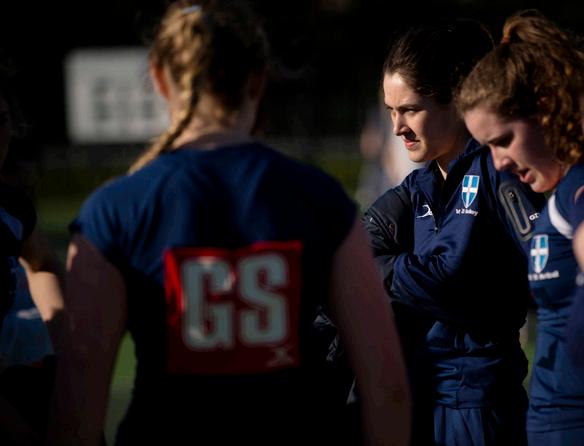
 Lucas Emmott (5th, MO) reflects on a truly musical year.
Lucas Emmott (5th, MO) reflects on a truly musical year.

Music is a crucial part of what makes King’s Canterbury the incredible school we know. Every day there is someone somewhere practising, learning, or performing music to a semiprofessional standard. Last year was the first chance we’ve had since the pandemic to offer a year of concerts to parents and public. For instance, every Friday there is a short recital in which any pupil can perform to a kind, supportive audience. This regular event is only made possible by all the dedicated members of staff in the department who work tirelessly to supply a suitable learning environment for every student, encouraging them to strive towards their full potential. These recitals provide a fantastic opportunity to perform as a soloist or a small ensemble and are perfect for broadening one’s appreciation of music as a member of the audience, with exposure to pieces stretching from the early baroque period to modern jazz. One brilliant advantage of these recitals is that every week is a surprise. The programme constantly changes and often there is a theme matching the season or holiday. Towards the end of the Autmn Term, for example, there was a lovely arrangement of ‘Ding Dong Merrily on High’ for four French Horns, and ‘All I Want for Christmas’ for solo piano, and the 6a music students performed their own festive composition for a band. For Chinese New Year there were also many performances of traditional tunes and melodies by a wonderful group of enthusiastic, unfamiliar faces.


Everyone in the King’s community feels the sudden buildup of excitement, arduous work and pressure that approaches with the highlight of the first half of the first term – House Song! All the stunning entertainment is solely run by pupils, which is why it’s always a special experience listening to each performance and imagining the amount of time that’s gone into arranging and rehearsing every moment. The few individuals who conduct each year are always the ones who celebrate the most in the afterparty, especially this year, since it was the first such competition in two years.

‘Last year was the first chance we’ve had since the pandemic to offer a year of concerts to parents and public.’
‘King’s Week is the perfect representation of music at our school. The packed schedule offers something for everyone.’
‘The choir will lull you to sleep as you relax in a heap of blankets under the setting sun on a calm summer’s night.’


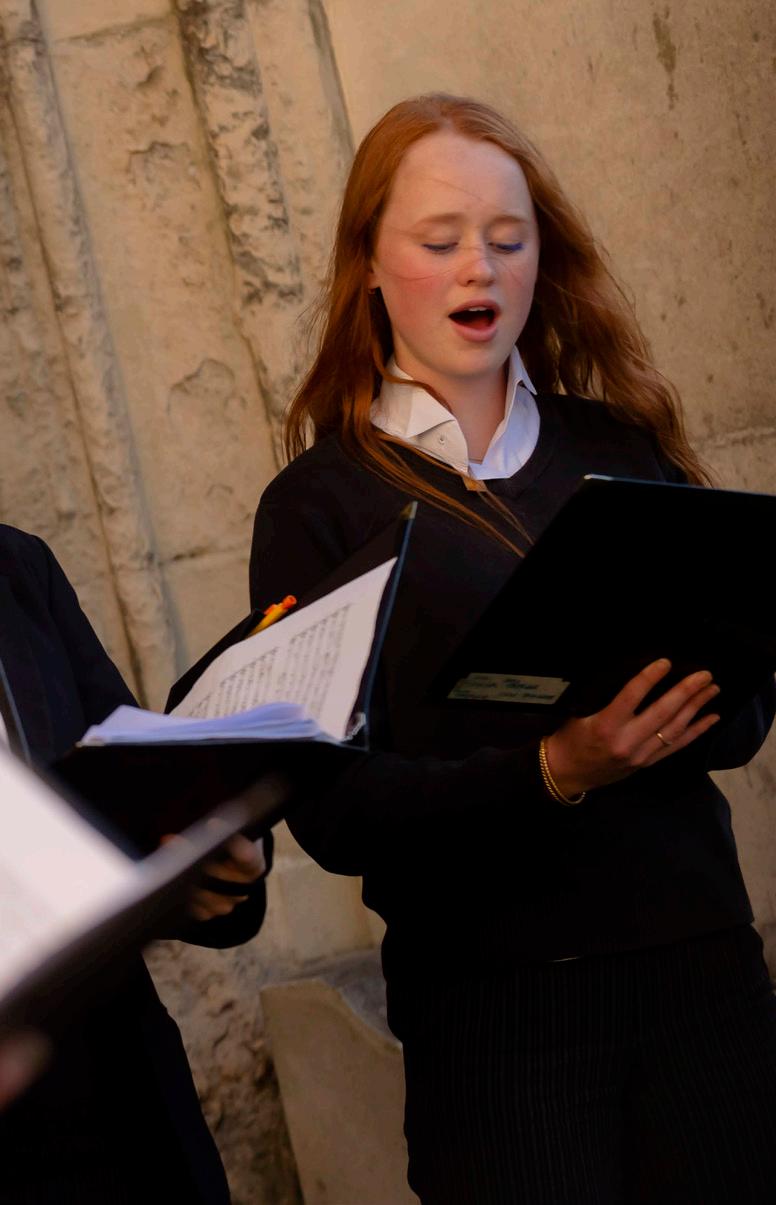
‘The atmosphere created by an immense symphony orchestra is quite unlike anything else: the sheer noise coming from all around you is invigorating.’
Other events in the Autumn Term were Remembrance Day, which is such an important, emotional service for so many people around the world. One of the difficulties for the school musicians is the windy weather, causing many music scores to go flying, unless they dig out the washing pegs. The unique setting of Memorial Court and the Norman Staircase is the perfect venue for creating a sombre atmosphere, right for reflection. There was also a chamber concert in November that featured a smaller chamber orchestra playing fiendishly challenging music, a string orchestra playing a diverse choice of folk music, and a wind ensemble playing a Mozart Serenade. These kinds of pieces allow for a more intimate tone and often create a beautiful dialogue between instruments, passing melodies around as the sound reverberates in the vast expanse of Shirley Hall.
When Christmas approached and boarding houses decorated their trees and walls, more music was being prepared for Advent. Sadly, the Christmas Concert was canceled towards the end of term, much to the disappointment of those who had put lots of time into practising tricky semiquaver runs and unexpected entries. One piece from the programme, Finlandia by Sibelius, was performed and recorded in February the following year in Shirley Hall.
This was a memorable occasion because of the massive instrumentation and inevitable deafening crashes from the percussion section. The atmosphere created by an immense symphony orchestra is quite unlike anything else: the sheer noise coming from all around you is invigorating, and it requires a different kind of practice to make your own voice heard while keeping a seamless blend of sound.
Another aspect of music is the choral side, often featured in a religious sense and usually part of a cathedral service. It is this side that often connects with so many people in all kinds of ways. The mixture of melody and words creates a welcoming environment able to bring out many feelings and emotions. We are lucky to sing not just as a school but also at funerals, as part of a dramatic requiem, in recordings, or on tours to other churches or cathedrals. Singing is an accessible form of music, so for the performance of Verdi’s Requiem the King’s Chorus is assembled. Filling the whole cathedral requires


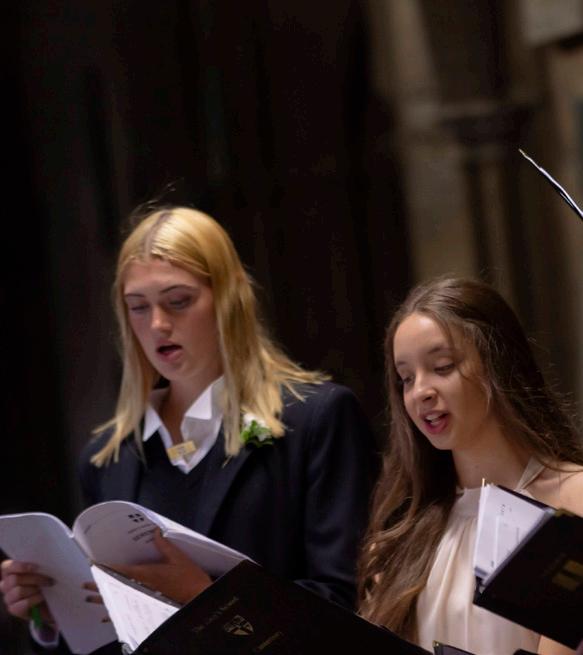
many singers to create a
‘Filling the whole cathedral requires many singers to create a sound powerful enough to match the great passion and drama contained in the music.’
sound powerful enough to match the great passion and drama contained in the music. These great choral works are often undertaken with the help of professional soloists who add to the sense of prestige and professionalism associated with a piece like this. We also recorded Fauré’s Requiem as Easter came into focus, which is a beautiful mass that featured some stunning solos from the student body. The pressure felt in a recording is much more intense than a regular performance because the number of microphones and wires means one small mistake is inevitably heard in the resulting take. However, after a few hours and a lot of perseverance, the result is always spectacular.


King’s Week is the perfect representation of music at our school. The packed schedule offers something for everyone, ranging from the scenic Serenade, where the choir will lull you to sleep as you relax in a heap of blankets under the setting sun on a calm summer’s night, and The Virtuosi or Gala Symphony Orchestra Concert, where you can hear the awe-inspiring 6a concertos and other overtures and symphonies. Jazz on a Summer Sunset and the Jazz Concert are a collection of energetic songs with frequent singing and improvised instrumental solos presented in a lively manner by the students and staff in Big Band. Fleetwood Mac is a pop concert performed by students in a band that plays various hits from the hit band as well as a plethora of other engaging songs to get the enormous crowd of dancers on their feet.


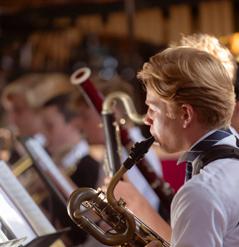


So, as the year ends and everyone finishes their final exams, do support this wonderful week in 2023 to end next year with a flourishing farewell.

‘The mixture of melody and words creates a welcoming environment able to bring out many feelings and emotions.’
Imogen Melrose (5th, KD) shares her theatrical highlights of the year.
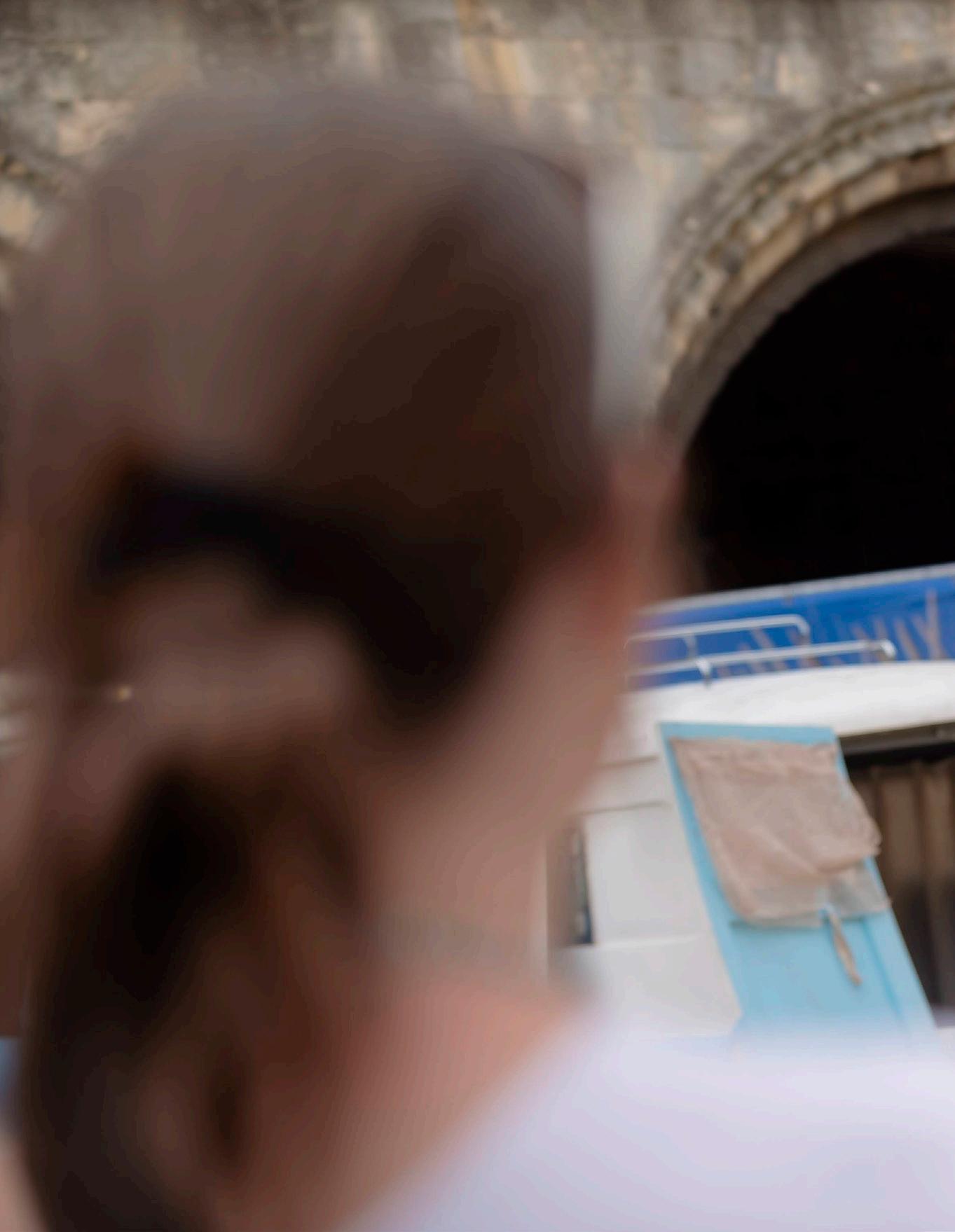
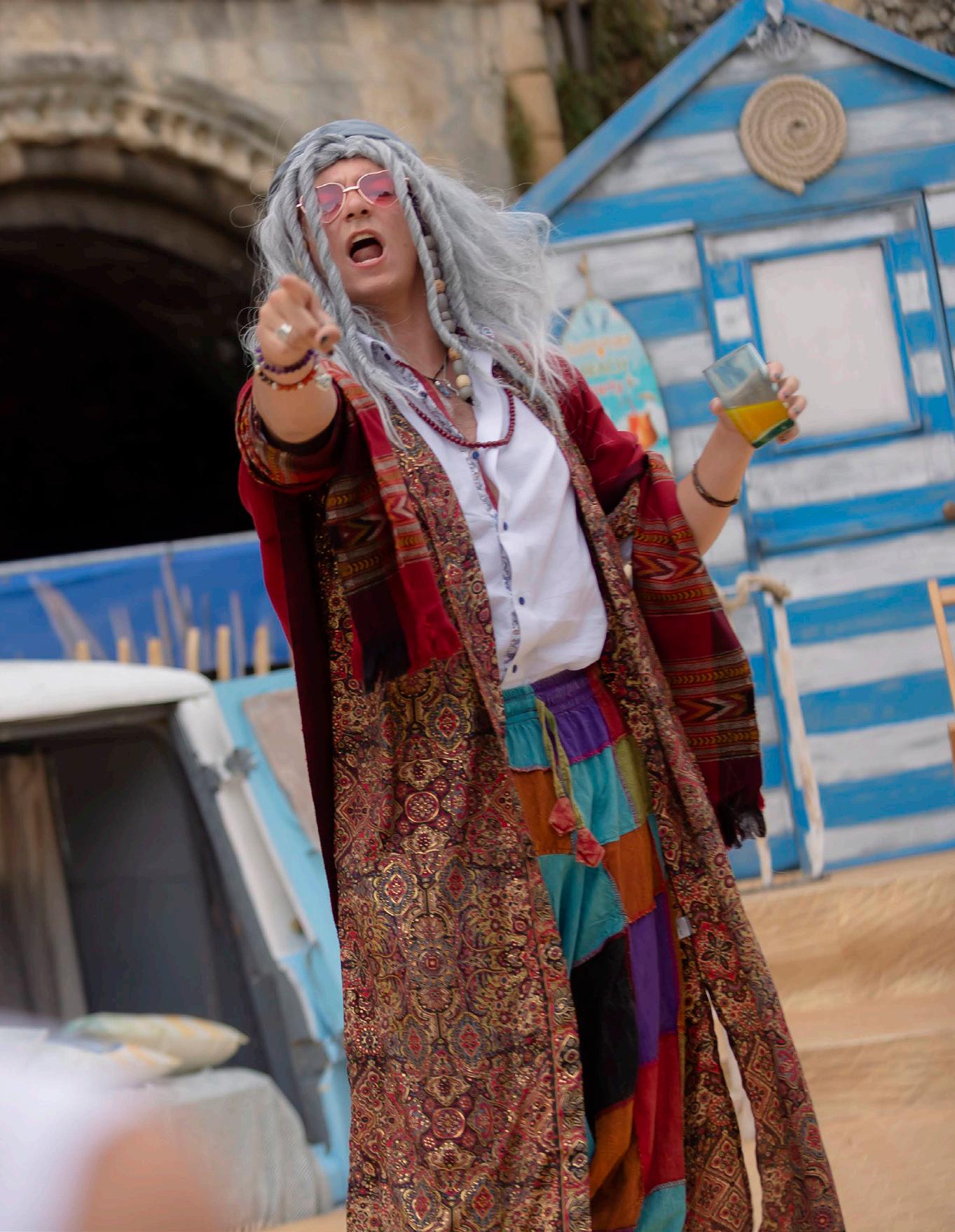




Last academic year kicked off rather late with public productions due to the postponement of Great Expectations in the pandemic. In January 2022, however, the Malthouse stage was reconfigured into traverse, immersing the audience into the fabulous world of Charles Dickens. The actors navigated a deliberately sparse set, characterised by intuitive lighting design and larger-than-life set pieces, integrating a mixture of naturalistic and un-naturalistic performance styles to reignite this famous tale.
The play itself, a dynamic adaptation of the original novel, explored complex themes of class and identity, following the protagonist Pip. After gaining the brief attention of the beautiful Estella, adopted daughter of the infamous Miss Havisham, Pip falls in love, making it his mission to become a gentleman so that one day he may marry her. When Pip is sponsored and swept off to London by an anonymous and mysterious figure from his past, he loses sight of everything he had once held dear, forgetting his old friends and eventually failing to earn the heart of Estella, returning to his old life to find that he no longer has a place there.

Despite its delay, the production was a great success, filling the Malthouse seats and engulfing audiences in a celebration of classic Victorian literature. This production was particularly poignant for the Drama Department because it was dedicated to our beloved
Production Manager, Bill Baxendale. His family attended the opening night on which a memorial plaque was unveiled in the auditorium of which he was so fond. He was integral to its conception.

In early February, the Malthouse stage was once again taken to for A Night at the Musicals. This celebration of musical theatre was a medley of dozens of different shows, old and new, featuring classics like Fiddler on the Roof, Cabaret and American in Paris to fresh Broadway blockbusters like Waitress, Everybody’s Talking About Jamie and Heathers. With a massive cast, the stage was full of a flurry of high-energy dance and song, captivating the audience with an energetic and fast-paced showcase of talent. Smaller, more elite groups of dancers stunned the spectators with complex numbers whilst they were serenaded by a series of delightful solo vocal performances. This lighthearted and accessible show filled every seat, running for four nights and garnering praise from parents and students alike.
Following the visit of Dominic West in the titular role of Dr. Faustus, the Shells and Removes took to the Malthouse stage a week later with a slightly different take on Christopher Marlowe’s renowned work. As soon as they entered, it was clear that this would not be a naturalistic portrayal of the tale. The set and lighting highlighted the dark, gothic themes of the play as the 60-strong cast crawled
‘This production was particularly poignant for the Drama Department because it was dedicated to our beloved Production Manager, Bill Baxendale. His family attended the opening night on which a memorial plaque was unveiled in the auditorium of which he was so fond.’
‘
from beneath a smoke-filled underworld. The powerful red lighting, along with the neutral colour palette of the ensemble’s costumes, captivated the audience before the break of silence when Faustus entered.
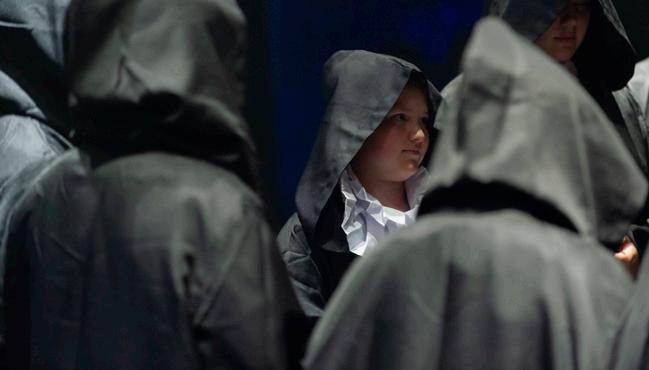

The story began with Faustus turning to the scholars for advice; enter 18 pupils embedded within portraits painted by our very own art students. This provided much-needed comic relief to the sinister downfall of our protagonist. Soon after, we met Mephistopheles but not in the usual manner since there were four of them! Dressed head-to-toe in white contradicted their menacing entrance through the trap doors accompanied by a grating shriek that got the whole audience on the edge of their seats. The climax fell in the middle of the show when we saw Faustus sell his soul to the devil. The chorus of sin scribed his eternal damnation on the Malthouse stage in chalk whilst they whispered echoes of his doubts rising to a piercing crescendo. The final image of Faustus was his descent into hell in complete silence before the ultimate line of the play spoken in unison by the whole cast: ‘Faustus is gone.’
Memorial Court went through quite a transformation to capture Shakespeare’s hilarious Twelfth Night. The floor was replaced
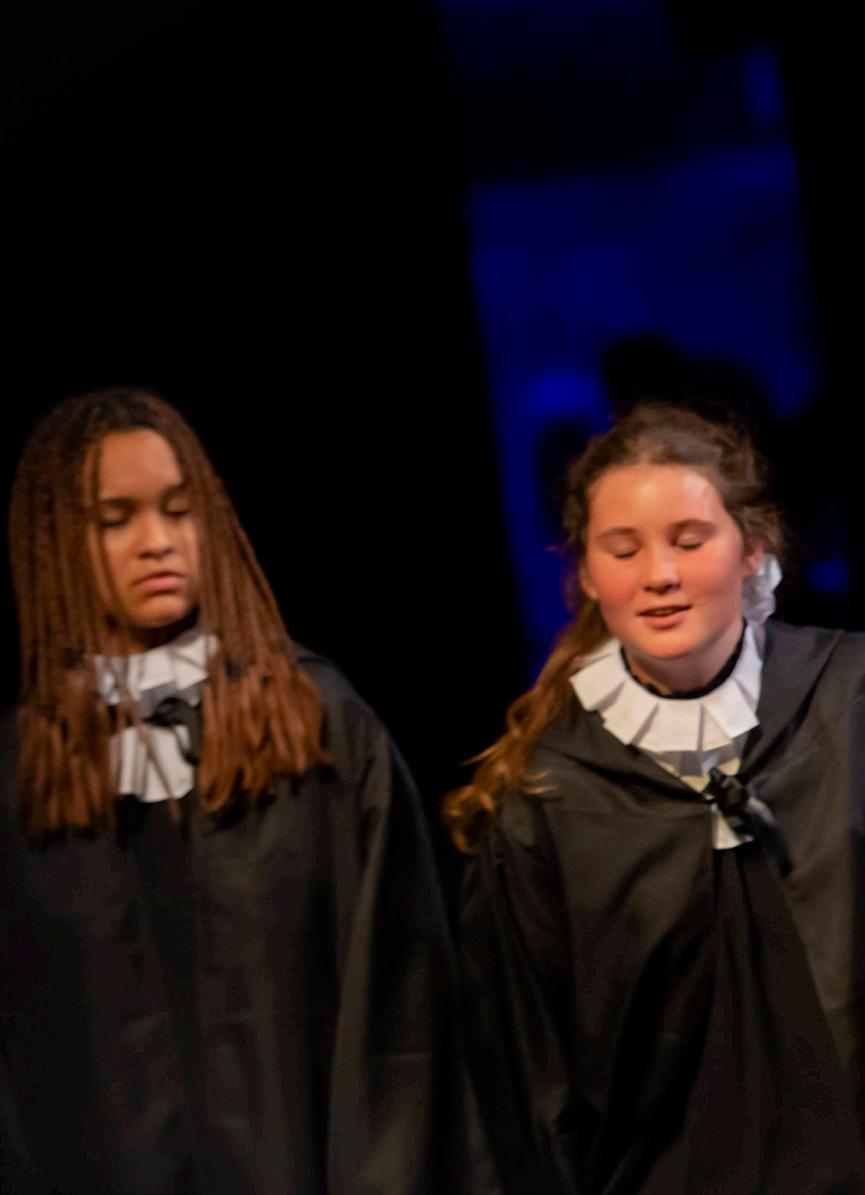
‘As soon as they entered, it was clear that this would not be a naturalistic portrayal of the tale.’
‘‘The final of image of Faustus was his descent into hell in complete silence before the ultimate line of the play spoken in unison by the whole cast: ‘Faustus is gone.’’’

‘The set and lighting highlighted the dark, gothic themes of the play as the 60-strong cast crawled from beneath a smoke-filled underworld.’


with (tiles of) golden sands and shimmering blue waters designed to transport the audience to the summer shores of Cornwall. It is always a challenge to perform outdoors, and the cast was blessed with good weather for the run of the performance after a downpour during the dress rehearsal. Our modern seaside adaptation included eye-catching costumes: the surfers, dressed in wet suits and rash vests with body-boards under their arms, entered with Orsino to the melody of At the River by Groove Armada. This deeply contrasted with the mourning countess, Olivia, draped entirely in black, who entered through her beach hut followed by her grieving sailors. It would not be a Shakespearian comedy without a case of mistaken identity: enter shipwrecked Viola (now Cesario) clad in shorts and a cropped wig with an uncanny likeness to Sebastian. The vibrancy of Malvolio’s bright yellow stockings, and even Sir Topas’s ginger beard, lit up the stage and the faces of the audiences as the sun slowly set over the open-air theatre. There were many moments of stand-out
acting, but there must be credit given to the comic quartet of Maria, Sir Toby, Sir Andrew and Feste, who livened up the stage every time they entered and had the audience howling with laughter for the entire play.

KiDaCo was another highlight of King’s Week. Opening with a dramatic and thought-provoking telling of the women’s suffrage movement in the early 20th Century, this performance combined styles of classical and contemporary dance, creating a haunting and moving narrative with stunning costumes and a highly accomplished and talented cast of dancers, leaving every audience member with goosebumps. This was contrasted by the following act, consisting of solos, large group dances and student-choreographed pieces of all styles of dance, including hip-hop, classical ballet and disco. The audience was moved to both tears and cheers throughout this varied celebration of dance.

‘It would not be a Shakespearian comedy without a case of mistaken identity: enter shipwrecked Viola (now Cesario) clad in shorts and a cropped wig with an uncanny likeness to Sebastian.’
‘Our modern seaside adaptation included eyecatching costumes: the surfers, dressed in wet suits and rash vests with body-boards under their arms.’












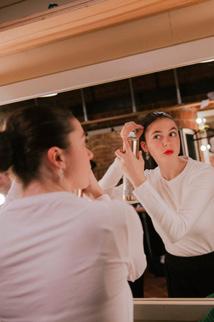






(Reproduced with typographical errors and idiosyncratic punctuation unless a mistake would mar meaning and enjoyment.)



On Wednesday February 1st a lecture was given by Canon Southwell on Worcester College for the Blind. He commenced by sketching the various difficulties under which a blind person laboured, and showed us how the lack of one sense had developed others to an extraordinary degree.
The Lecturer then showed us several slides of the College and of its members at work. Carpentry, practical science, typewriting are all part of the school curriculum. In fact the boys who are turned out as capable clerks are very serious rivals to those who possess their powers of sight to the full. After discussing the school work Canons Southwell then turned to the recreations. One of their chief indoor games was chess, and at that they excelled, one of their team having actually beaten Senor Capablanca in a fair contest.
The chief sport of all, however, was their rowing. In this they did not feel so much the handicap of their lack of sight, and were remarkably efficient. Running and jumping even, as the lecturer showed us, were not beyond their powers.
We think several of the facts laid before us came as a great surprise to most. The cheerfulness with which they seemed to work, and their earnestness would be a lesson to those who did not realise to the full their good fortune in being able to see properly.
It was subsequently arranged that the school should raise some money to help one scholar at the College by means of small voluntary annual subscriptions.
On Wednesday February 8th a lecture was delivered in the Parry Library by the Rev. F. Goodchild. His subject was “Life in NorthWestern Canada.” His lecture was illustrated by many excellent slides, and this combined with the lecturers’ attractive style and the fact that he was relating his own experiences, served to intensify the interest which we took in it.
He gave us an excellent account of pioneering life, from the building of the rough log hut to the subsequent homestead which sprang up around it. One of the most striking facts in the lecture was the way in which all hands in the Village, as it grows, seem to work together, especially in the matter of building and fitting out its church.
He explained the extreme difficulty experienced by missionaries and clergymen in the administration of the affairs of their parishes, some of them being so vast and the dwellings in them being consequently so isolated that any definite assembly point for school or church was quite impossible, and the vicar becomes more and more a travelling missionary.
The lecturer also drew a rapid sketch of the working of a lumber camp, from the time of the arrival of the steamer and one or two attendant scows to prepare the camp, to the actual felling, collecting and transporting of the logs.
A very amusing account of the Esquimeaux’ dress, life and religion was illustrated by several interesting slides. The lecturer showed us that the work of the Christian missionaries did not only bring a higher ideal of life to the Esquimeau but also gave him a new courage to go out to his work without being in terror of hidden evil spirits which lay waiting for their victims in every natural object.
CORRESPONDENCE.
N. B. – The Editors decline to accept any responsibility connected with the opinions of their Correspondents. Name and address must always be given, not necessarily for publication, but as a guarantee of good faith. Personalities will involve certain rejection. Letters should be written on one side of the paper only.

To The Editors of “THE CANTUARIAN.”
Dear Sirs,
Might I suggest that the Boat Club, with one of the subscriptions obtained from some budding Felton, should purchase a few of the articles known as Pontiuses? They would certainly be a great boon to those who row in the Boat Races in the Summer and Easter terms, and who, I am sure, would be very grateful for the relief.
Yours hopefully, ENGINE.
To The Editors of “THE CANTUARIAN.”
Dear Sirs,
I think I am echoing the complaint of the Day-boys when I ask why no suitable arrangement is made for the supply of hot water and for bathing for the thirty day-boys.
Yours, S. H. IVER.
To The Editors of “THE CANTUARIAN.”
Dear Sirs,
In the dim and distant past, a resolution was passed by the Sports’ Committee to the effect that “inter-Tugger Swimming Sports, should be held at the end of each summer term.” Could not this be revived? We have got good baths and there is no lack of enthusiasm in the school.
Would it be too much to hope for a school swimming team?
Yours optimistically, H.O. ACTIVITIES.
To The Editors of “THE CANTUARIAN.”
Sirs,
Is there any reason against publishing the order of the events at the Sports beforehand? If not, it would materially assist the undecided in their selection of a suitable entry.
I remain, ANXIOUS.
To The Editor of “THE CANTUARIAN.” SIR,
To The Editors of “THE CANTUARIAN.”
Dear Sirs,
It used to be the custom, I believe, that only members of the first game should wear grey flannel football shorts. Should not this privilege be still adhered to?
Yours sincerely, B. AGGS.
Having in my own person experienced the hardships of a warm summer in the corps, would it not be not altogether unwise and foolish to take some measures to alleviate this discomfort? In the regular army under the circumstances, men are equipped with short trousers or knickerbockers. Since the war there must be large dumps purchasable for a song. Why not equip the corps with the same? Coolness and efficiency combined are thus obtained.
I append myself,
A SUMMER IDYLL.
To The Editor of “THE CANTUARIAN.”

DEAR SIR,
The question is asked by many. Why have the swimming races been dropped? It is now nearly 3 years since they were last held. Cannot something be done to revive them.
Hoping that my suggestion will find favour.
I am yours, S. W. IMMING.
To The Editors of “THE CANTUARIAN.”
Owing to the increasing keenness with which the school watch the 1st XV. matches, the field of play is liable to be curtailed considerably. This could be prevented by a rope which would be of great assistance to those unfortunates who have to cope with such an unruly crowd.
Yours etc., I. M. PROVER.
To The Editors of “THE CANTUARIAN.”
DEAR SIRS,
Would it not be possible to have more attention paid to the cricket coaching in future. At present, one is not able to profit much by “greens’ at 12.15, although a professional does come down. The wickets on the green court are very poor, and one cannot benefit by coaching on a bad and dangerous wicket. The games on Bev. do not have much attention paid to them, occasionally an enthusiastic master comes up to coach. The Blores games are a mere farce through lack of coaching and interest paid to them. Surely this state of affairs does not tend to improve the school cricket, and this of all games, perhaps, needs the most attention paid to it.
I remain, Sirs, Yours in hope, A. C. RICKETER.
To The Editors of “THE CANTUARIAN.”
DEAR SIRS,
Could not the eight volumes of the Cantuarian in the Parry be supplemented by the addition of volume 9? It is surely time that it appeared, as volume 10 was begun three years ago.
Yours in anticipation, A. C. RITIC.

To The Editors of “THE CANTUARIAN.”
As the school has just had a running Match against Blackheath Harriers out of which the School emerged as victors, I should like to suggest that when we have a running race a new course should be chosen every race and that the length should be increased to about 6 miles when desired. The reasons for this suggestion are: (1) When a team runs on the present course they, if they are visiting us, do not know the course, whereas we do. (2) By running on the present course dozens of times, as a member of the “eight” has to, both in practice runs and in matches, it becomes terribly monotonous, whereas if a new run was taken there would be some excitement for what was coming. Possibly the selection of a course might present a little difficulty, but this could easily be overcome, as there are numbers of “Dykes” and rivers, which present nice baths for the runners, around Canterbury.
I am, yours truly, N. E. W. COURSE.
On Wednesday, November 30th the school journeyed to Sutton Valence and eventually discovered the wrong entrance to the school. We learnt that two of their best players were crocked, but we hardly imagine this affected the result, inasmuch as the school grew rather slack against such feeble opposition. One might with justice, say, they started slackly, for the first five minutes was wasted by rather aimless “looks” into touch from within our “25.” Our outsides however soon learnt that they had not much to fear once they started attacking. Simultaneously the forwards woke up and proceeded to let Cook have the ball from every loose scrum, though they were frequently penalised for “foot up” in the tight. The threes threw away most of their chances by selfishness in which Mizen was the chief offender, though he put in many fine runs and scored four tries. The handling generally was on the weak side, probably due to over-excitement. Half-time came with the score at 25-0, five rather easy kicks having been missed.
After half time the school scrum went rather to pieces becoming imbued with spirit of try-getting, wherein they succeeded in muddling the outsides. Page aided by Cartwright got a couple of good tries, Mizen scored another far out after a dashing run from half way, which was converted by Osborne, who succeeded in two attempts, thus putting up a record for the day. He was given a try by Mizen shortly after when two yards from the line. For the last five minutes Sutton Valence put on a spurt and kept us in our 25 nearly all the time. A most disappointing display by the team when practically at full strength. Heyman served his “threes” well. The final score was (41-0).
The following represented the school :-
O. H. De St. Croix, S. E. Haselden, A. L. Mizen, J. M. F. Cartwright, G. C. Page, D. G. Heyman, W. L. Cook, M. Arnold, M. D. Ommanney, B. T. Wace, R. H. Osborne, O. D. Evans, C. H. Gibson, C. H. Bryant.

Oh glorious brain! Thou master mind, who first Turned thy great thoughts to lesser things, As some great tree the seed from which it springs Regenerates: Disorder’s ranks didst burst When thou didst liberate the Cabbage, cursed And bound by rough Confusion’s tyrant strings. No longer to the mind such picture brings A cabbage field – Disorder at his worst. No longer does the farmer scatter seed Of cabbages at random. Now, in rows He carefully deposits each young plant. Thus can he see more clearly when a weed Or tare among his cherished produce grows. Ye muses! To my hero blessings grant.
E.O.
(To the first man who planted cabbages in rows.)
O monument of stone to heroes built
To men who fought and died for England’s name, Give them their due – a true immortal fame, That all may honour as they see the hilt Graven in stone on thy surmounting cross, As standing in the midst of Honour’s court They gaze upon the cross by skilled hands wrought And think upon Old England’s sorrowed loss. Long may be thy life in thy proud place Beneath the shadow of that mighty pile The Old Cathedral’s towers whose ancient face
The traveller sees when distant many a mile. May thy imposing mass still leave some trace Of those whose valour saved us in our trial.
Anon.


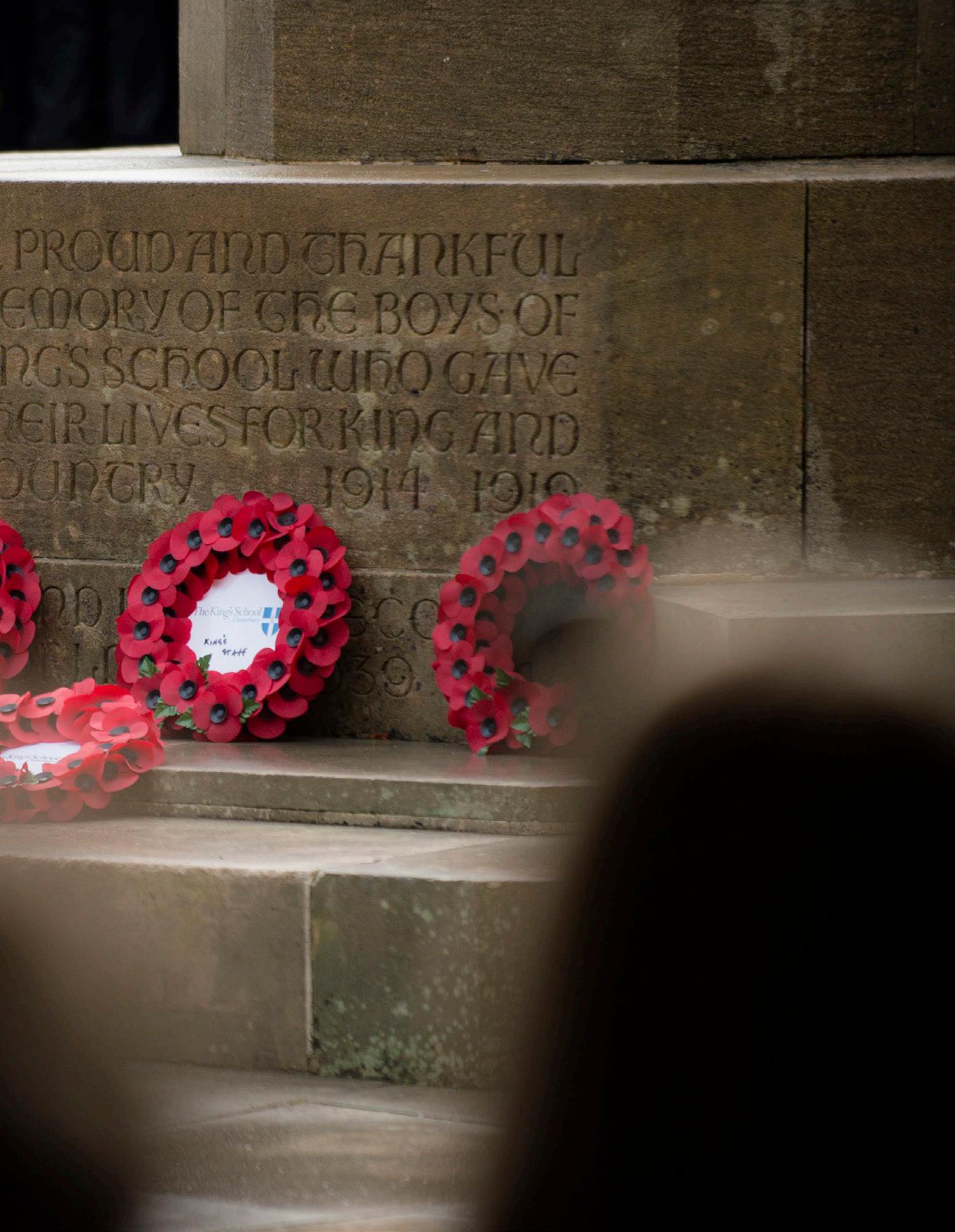




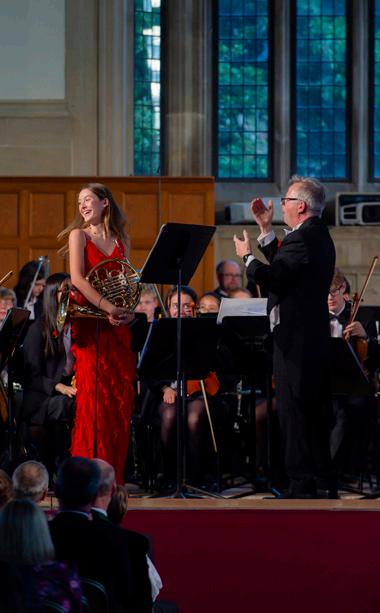



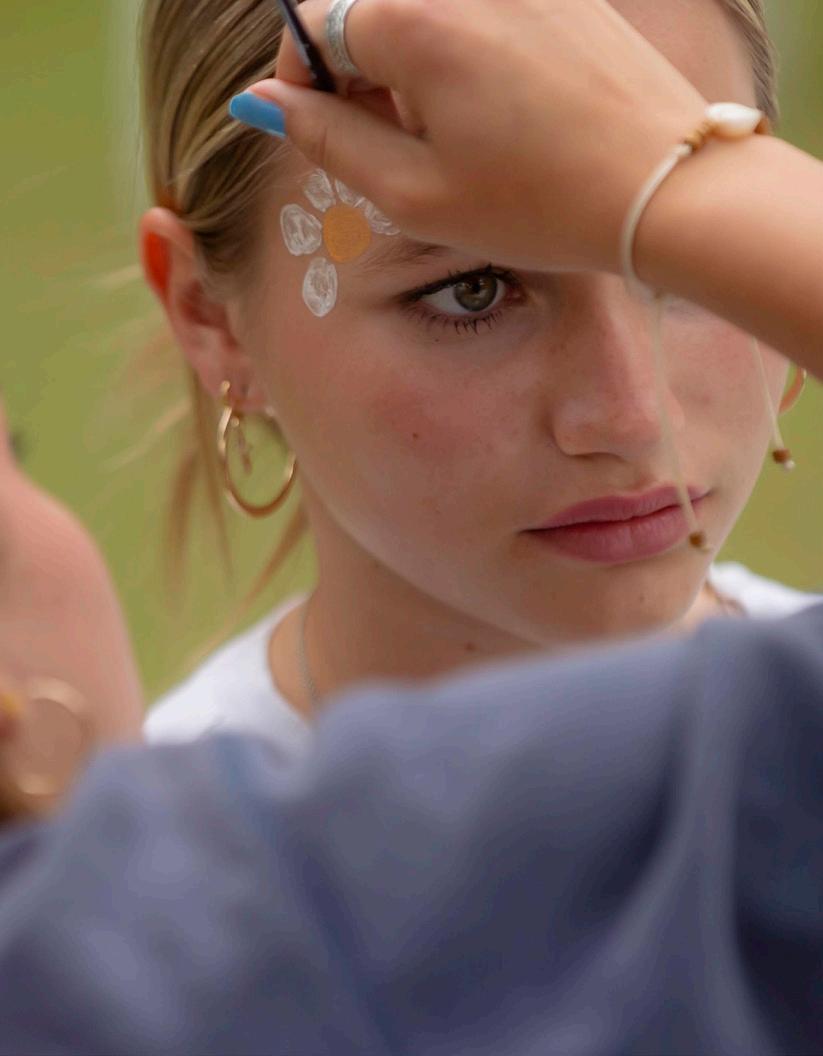
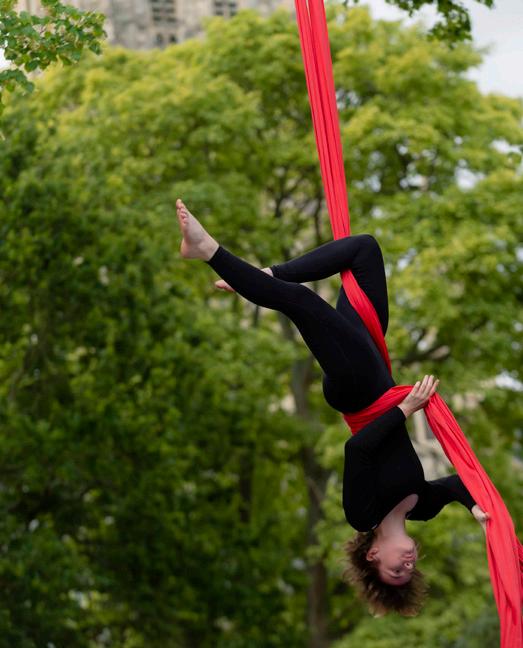
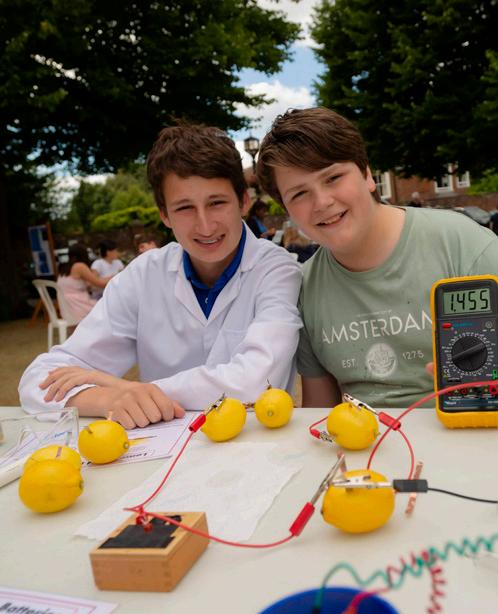

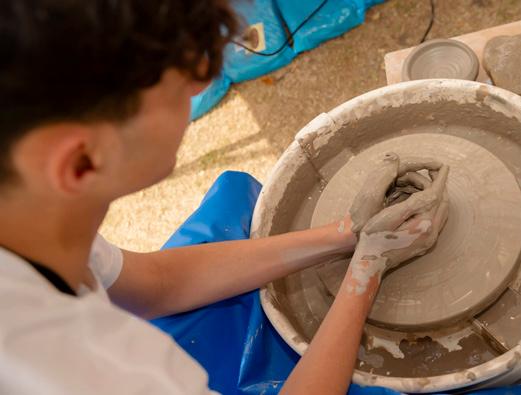






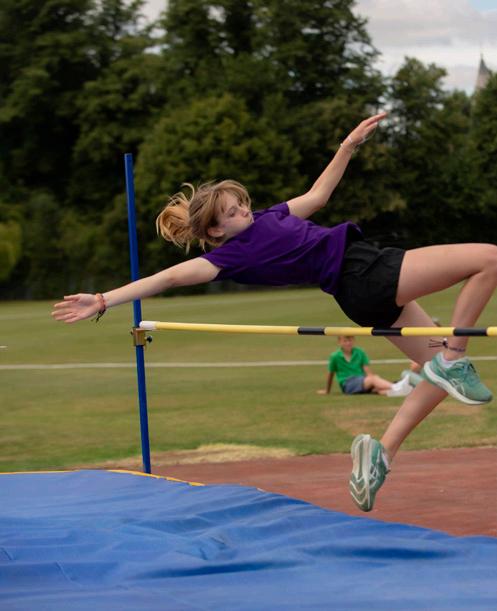










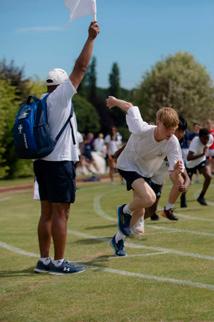

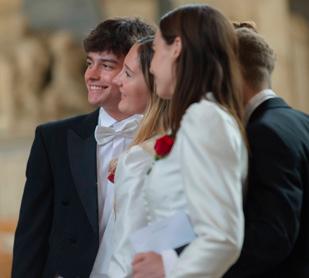

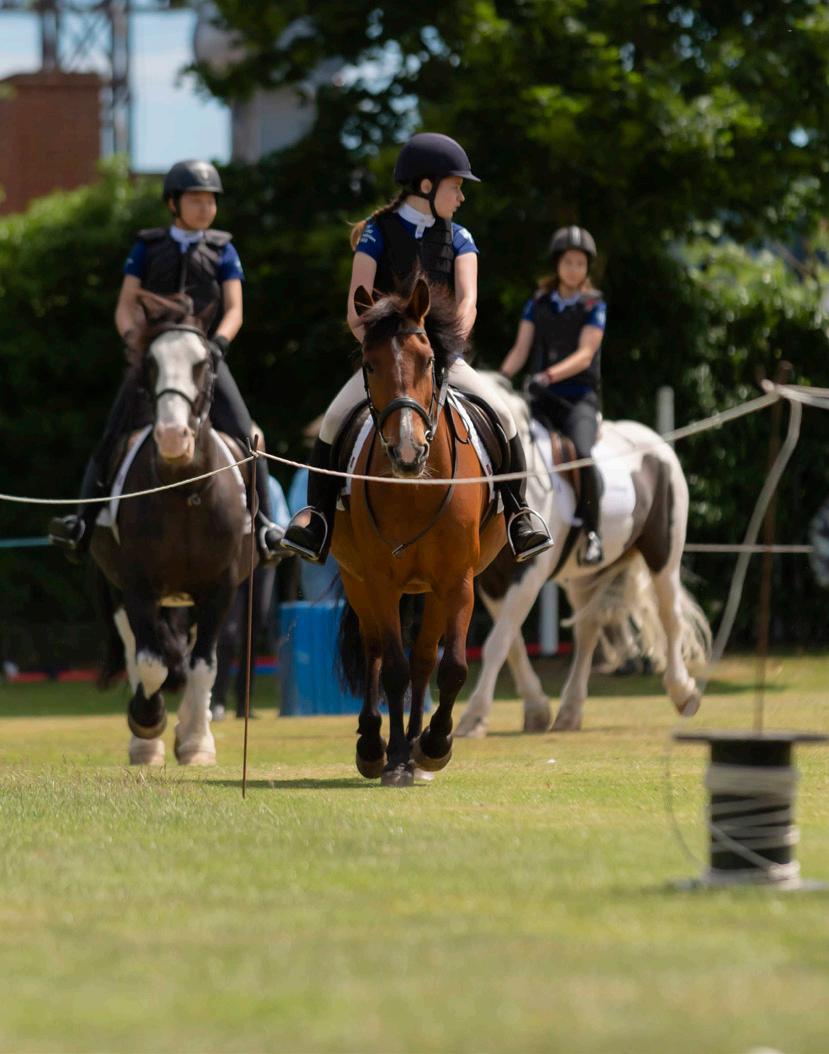




















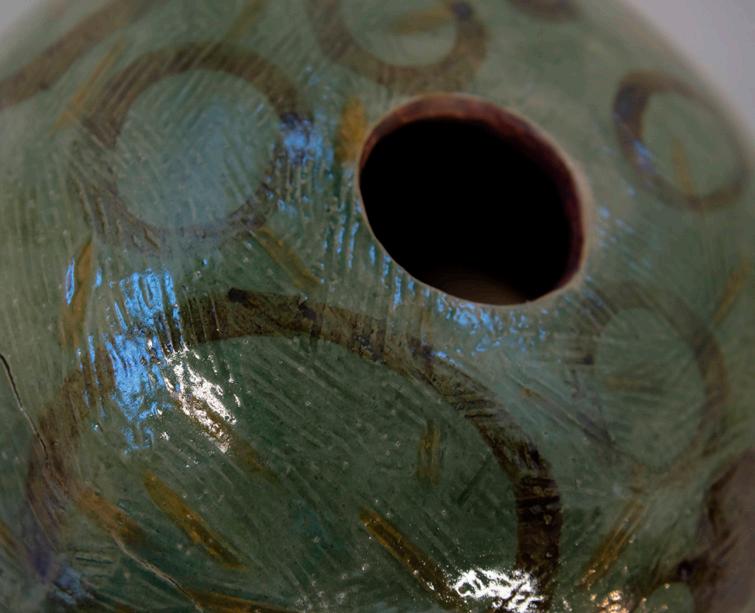






Ask pupils or staff of their recollection of Peter Roberts and it might be of him standing at Memorial Court in his gown every morning, come rain or shine, as pupils and staff made their way to first period. He would always have something to say – a comment on their premier league football team’s score from the night before, a word of praise for a performance in a concert, or to put forward his thoughts on a recent talk or debate. He seemed to know of incidents before most other people and would go out of his way to smooth over any issues or disagreements.
Or they might remember Peter at the helm of his ship, sitting in the bay window of his Lattergate office, looking out over the garden, beavering away at his computer. And then there was that moment after his final school assembly in the summer term of 2022 when he was treated to a surprise farewell from the pupil body who surrounded Green Court to clap and cheer as he cycled precariously around on one of the King’s Week bicycles, his gown flapping behind him.
Before arriving at King’s as Headmaster in 2011, Peter had spent his time at a number of educational establishments. As a student at Merton College Oxford, Peter enjoyed captaining the College cricket team and leading the ‘Past and Present’ Society for historians, whilst as a young teacher at Winchester he was soon known for raffish outfits, heightened by bow ties, and also for founding ‘Les Six’, a philosophy and discussion group. He soon became Master of College, the scholars’ house at Winchester. Meanwhile Marie was Head of Department at some very challenging, but very rewarding, state schools in Southampton and Andover. As always, she was the warm heart at the centre of the College community in the medieval part of Winchester. Peter then went on to be Headmaster of Bradfield College where he and his three dogs enjoyed steeplechasing across the Berkshire fields and his three daughters flourished despite him introducing full coeducation around them. Marie was at the heart of the village community and even had French radio interviewing her on the doorstep on the day of Kate and William’s wedding, since the Middletons lived close by.

Peter was often writing cards to people: effusive thanks for a member of staff who had gone above and beyond, or to offer support and condolences when times were tough. He was also remarkable in terms of knowing the pupils and so incredibly supportive of them when they faced adversity. Perhaps some of this knowledge came from the fact that he read, and then wrote, so many reports
every term. He never lost his love of teaching and enjoyed every opportunity to delve into the pupil psyche, be it at Shell breakfasts on Friday mornings, Lattergate lunches with representatives from a year group or whilst reading them poetry on his Monday evening house visits. Rose Meddings (BR 2012-17 and Captain of School 2016-17) recalls, ‘I really enjoyed my time as Captain of School for Mr. Roberts. He was a really interested Headmaster who I felt genuinely cared about his school and pupils. I enjoyed our meetings, which were always punctuated with a variety of interesting topics, and I always felt supported both personally and academically.’
Peter was a stalwart on the touchline at Birley’s and Blore’s, supporting players, interacting with parents and staff, and bringing his beloved dogs along for good measure. He enjoyed the privilege of being the ‘Head Man’: no one else could get away with going into the swimming pool area wearing shoes and bringing a dog too. His presence was also felt at the International College and at JKS and, conscious of green issues, he could often be spotted riding his bicycle down to JKS along the Sturry Road, tie trailing in the wind, reminiscent of a bescarfed Biggles.
Known for his love of Latin and French, Peter used both languages at every opportunity. Rarely did a speech at a dinner or a talk at assembly pass without some smattering of Latin or French included. Andrew McFall, Common Room President, recalled in the farewell speech he gave about Peter the story of one occasion when Peter needed to discipline a Sixth Former. He asked the then Head of Sixth Form to attend the meeting at an unearthly hour of the morning. Having driven in from Whitstable, said Head of Sixth Form sat through the meeting whilst Peter decided to conduct it in French, as the student was bilingual. The Head of Sixth Form, sadly, wasn’t.
Despite the long hours that he worked, Peter somehow found time to fulfil a passion for charitable work. He was an enormous enthusiast when it came to the School’s Partnership work, encouraging links with local schools and wanting King’s to do more to serve the community around it. He regularly raised money for charities close to his heart, sleeping out overnight with just some cardboard boxes for shelter to raise funds for Porchlight and more recently volunteering regularly to go out and help those who were sleeping rough on the Canterbury streets. He wasn’t often spotted out training but nevertheless he would manage to pop away, be it to London or Paris, to run a
‘He regularly raised money for charities close to his heart, sleeping out overnight with just some cardboard boxes for shelter to raise funds for Porchlight.’
marathon in support of a charity, then rush back to make sure he could make it to a cathedral service or to take assembly. When he wasn’t running he could often be found enjoying a refreshing early morning swim in the sea, and not only in the warm summer months.
Peter believed strongly in the importance of the School’s links with the Cathedral, and he and the Dean, as Chairman of Governors, would meet regularly for tea and cake on a Monday afternoon. Little that happened within the Precincts would escape the two of them. For a man who loved tradition, always extolling the ‘renaissance’ values of King’s, the beauty of the old buildings and the importance of the Benedictine tradition, Peter nevertheless also oversaw a period of change and ambition at King’s. In his time the school bought the old Diocesan Payne Smith Primary School and built Lady Kingsdown House. The Pupil Social Centre was created out of the dark and dingy basement of the Shirley Hall. The Malthouse campus was acquired and the development of the impressive theatre followed, along with the transformation of an old workshop into a sports hall, creating a fantastic facility for fencing. Peter also worked with the governors on the international strategy which saw the building of the International College next to the Malthouse theatre as well as the first steps of King’s abroad with the setting up of a school in Shenzhen under the auspices of Geoff Cocksworth. At the time of writing the scaffolding is finally beginning to come down around the new Science building with its wonderful flint walls which fit so well into the landscape of Mint Yard – a project Peter might have expected to have seen finished before retiring but which, because of the pandemic, has taken much longer. The arts, science, music, sport – Peter always talked knowledgeably and enthusiastically about all of them. Above all he loved King’s Week when all these areas come together to show the creative and ‘renaissance’ ethos of King’s.




The pandemic period was exhausting. Peter never stopped working, always looking to reassure people that all would be well, even in lockdown. When things were at their hardest and most isolated, he would film himself on his phone ‘on location’ around King’s so that he could still send out messages of hope and togetherness to the school community,

‘Throughout his eleven years at King’s, Peter had Marie at his side, be it at Birley’s or concerts or plays, or the numerous social occasions that being Headmaster involved.’
most human side of ‘The Head’ may not have been on display for many to witness but I, for one, knew that, in the ivory tower that is a headship, a gentleman with caring values occupied the throne.’’
and so we could feel in touch with the beauty of the School. He worried so much for the pupils facing long periods of isolation and was at pains to try and find ways to improve the mental health of both pupils and staff during this time.

Comte Benoit de Vitry d’Avaucourt, Interim Chairman of the Governors, states: ‘I have known Peter both as a parent and more recently as a Governor of the King’s School, having put my own five children through the school. This spans from before Peter first started in 2011 through to his leaving last year. Among Peter’s many qualities, I always respected his work ethic and his ability to know all pupils. Peter is a very caring individual and was utterly committed to his pupils. Peter was deeply devoted to all aspects of King’s.’
And throughout his eleven years at King’s, Peter had Marie at his side, be it at Birley’s or concerts or plays, or the numerous social occasions that being Headmaster involved. He and Marie were always the best of hosts, always generous with their time. For them both, King’s was about family, friends, community, colleagues. Everyone was important, regardless of their role in the school. But after 11 years, the lure of some extended time in France, especially after all the pandemic restrictions which prevented Peter and Marie from going ‘home’ for quite some time, has been too strong, and Peter and Marie have been enjoying some much-needed and well-deserved time off in the Charente, appreciating the quiet and calm of their beautiful home in the French countryside, along with their two dogs, Holly and Rhubie. And who knows, perhaps Peter will confound the locals by ensuring that he throws in the occasional English phrase or idiom to keep them on their toes.

My first contact with Peter was on the phone in the summer of 2011, discussing the case of a boy in my house who had underperformed at AS and whose choices for 6a had to be revisited. This was not an ideal start but, in the end, it did not prevent us developing a strong professional relationship.
As Senior Housemaster, and later President of the Common Room, I had many occasions to witness Peter’s diplomatic acumen and ability to face up to, and resolve, prickly problems, concerning both pupils and staff. When momentous announcements had to be made, he would pre-warn me, sometimes asking for my opinion, but he always knew which path he was to follow. From BASCOS to OKS Committee meetings, Peter displayed great skills at stating what he wished to achieve, and the iron will to see it through. Of course, many will remember Peter’s speeches, peppered with Latin or French a parte or idioms, aptly mixing the serious with the jocular. As a French speaker, I did appreciate Peter’s fondness for the language and his readiness to switch to my mother tongue when we met. This, naturally, had been well fostered by his French wife, Marie, who invariably accompanied him to the social events at which Peter’s presence was required, as well as the other impromptu gatherings during which we could resort to the old lingua franca…
There is, however, an episode that is etched into my and my family’s memory. One Christmas time, as my family was visiting us in The (new) Grange, I invited Peter and Marie for a drink so that they could speak some French, especially for my parents, who do not speak English. As we were sitting in the House Common Room, Peter sat next to my now-late father and started a conversation, which delighted my dad. And on several occasions, as they were chatting, Peter helped my father to get his drink: a simple gesture but one that showed great humanity and humility. My parents were most impressed and touched by this show of attention and respect for old age. This most human side of ‘The Head’ may not have been on display for many to witness but I, for one, knew that, in the ivory tower that is a headship, a gentleman with caring values occupied the throne.
MPHD‘‘This
 by Claire Anderson
by Claire Anderson
After Debbie’s arrival at King’s in 2005 she was a valued member of both the Politics and History departments and will be greatly missed by both her colleagues and the pupils. Originally, she was employed to cover the maternity leaves of the esteemed Sam Price and Sarah Richardson for two terms but stayed on into the summer term after convincing the Deputy Head Academic, Geoff Cocksworth, that she could teach Geography and cover Simon Anderson’s sabbatical. Following Peter Henderson’s retirement from History and Politics, she was appointed on a permanent basis from September 2006. Based with the Economics Department in Priory, she taught both subjects to A’ Level until 2018.
During her time at the school, Debbie witnessed some significant changes in personnel, and worked under several heads of department, beginning with Paul Teeton in Politics, then David Perkins. More recently, following David’s appointment as Head of History, she worked with Owen Moelwyn-Hughes (fondly referred to by Debbie as the ‘Big Beast’, due more to his reputation in the world of Politics teaching than to his physical stature, I believe!), to whom she provided support on his many ventures, talks and conferences, as well as the Model United Nations. Debbie’s impressively wide-ranging knowledge of global politics, as well as insider intel on the people and events in the UK political scene, made her invaluable to the Politics Department and, after the departure of OTMH in 2019, along with Ian McEwen, she became the mainstay of the department and vital to its continuation as a viable subject, navigating the Covid-related changes and switch to online learning, as well as the Teacher Assessed Grades in the summer of 2021, all in the twilight of her career. This was a rocky time for the Politics Department and Debbie was key to weathering the storms and reestablishing the department following Owen’s departure and the pandemic’s effects. That it is again a thriving department with new staff taking it forward is thanks in no small part to Debbie and her commitment in her final year at the school. Her role in mentoring new teachers in the early stages of their careers is one of her lasting legacies, and we have all benefitted from Debbie’s experience, expertise and wisdom.
During her time at King’s, she also taught EAL, using her knowledge of a wide range of countries and cultures that she had gained through her years teaching in international schools, and her global travels, to help some of the international pupils progress academically. She also regularly taught Shell and GCSE history when
required, as well as previously having taught the History A’ Level on Italian Unification, British Imperial Policy and Russia under Tsarist and Communist rule. That Debbie could turn her hand to any of these diverse areas is testament to her ability as a teacher and the breadth of her knowledge. The History Department also underwent a period of evolution during Debbie’s service, with the retirement of Richard Hooper as Head of Department in 2008 and the arrival of Toby Purser and subsequently David Perkins’ 10-year tenure, before my appointment as the first female Head of History in 2020. With the retirement of such eminent and long-serving members of the department, such as Richards Maltby and Hooper, and also Stephen Graham, Debbie certainly witnessed a changing of the guard.
An account of her time at King’s would not be complete without mentioning her role as Deputy Housemistress over many years. She was originally appointed to the role in Broughton from September 2006 with Father Fred and Amelia Arvidsson, then with Cath Shearer, for a total of eight years in the House. Following another five years as a tutor in Walpole, she returned to Deputy Housemistress duties latterly to help Emma Bell in Bailey. Emma writes, ‘Debbie has been a wonderful support to both me and the girls as Deputy HSM of Bailey house for almost four years. Her wisdom and knowledge of schools and universities has been valued by the sixth form girls. Well-travelled and familiar with many different cultures, Debbie was able to help settle girls from all over the world and was able to talk to them easily about their home countries because she often had first-hand experience there. Although she took no nonsense, she cared for each girl as an individual and was never too busy to chat. We will miss her in Bailey House but know that she has an exciting retirement ahead of her. We wish her and Richard safe travels and plenty of well-deserved time away from work.’
Debbie can now look forward to her well-deserved retirement with her partner, Richard, divided between their homes in Anjou and London, having had a varied career and made a positive impact on the many pupils that were fortunate enough to be taught by her. I know they had real affection for her. To me personally, Debbie has been a vital support since I took over as Head of History and Politics, and indeed throughout my time at King’s. She has been a friend, a sounding-board and a greatly-respected colleague. We wish her all the best for her retirement and will continue to appreciate her significant contribution over 17 years for a long time to come.
The list of famous Belgians goes on forever: Hergé, Plastic Bertrand, Jacques Brel, Eddy Merckx, to name but a few. To this list we must add the name of Ben Katz, who came to us in 2014 after reading Natural Sciences at Cambridge. The etymology of the tribe name of Belgae is ‘those who swell with anger’ – wildly inaccurate as a description of the warm, funny, jolly and kind man that Ben is. Starts of terms were always marked by a lovely box of chocolates brought back from the homeland, providing a tasty extra dimension to departmental meetings. He was such a good colleague because he clearly cares, has an inquiring mind, and his cheerful approach is infectious.
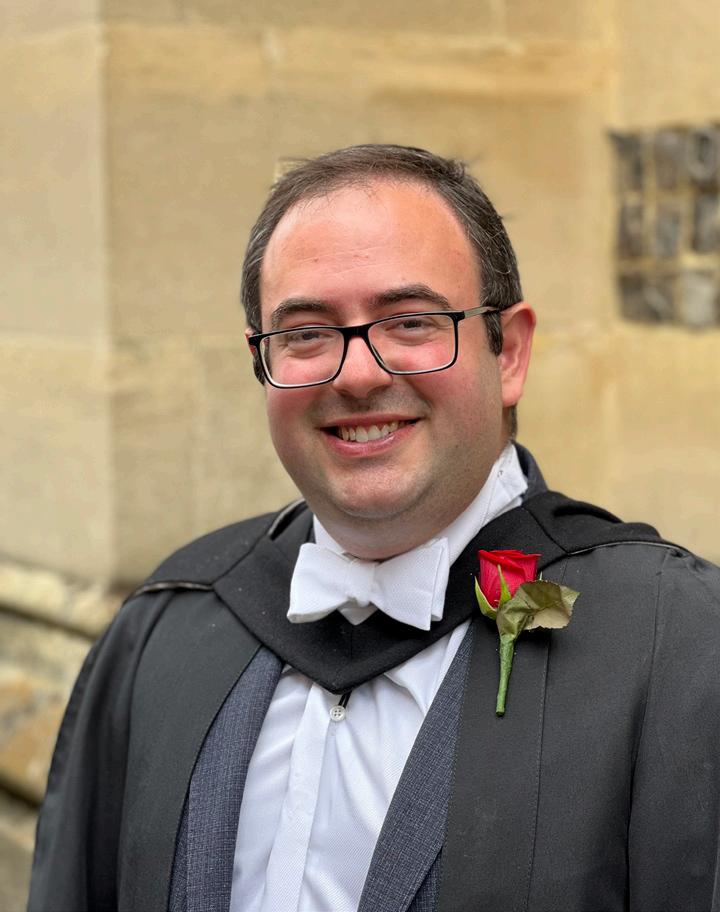
Ben was first and foremost a teacher of Mathematics, and he has been vital in helping promote a problem-solving culture within the School, even if not quite everyone was always grateful to receive a Problem of the Week in their email inbox. He was instrumental in running (very efficiently) many individual Mathematics competitions and Olympiads for the last few years, as well as taking small groups away to team contests. With a true love of the subject, he has bags of ability in communicating that enthusiasm. He always set high standards and the length and/or difficulty of his preps became a minor legend, apparently spawning Whatsapp groups so pupils could discuss how to do the work. Within the department Ben had a strong sense of collegiality. You might think a department of Mathematics teachers comprises a collection of rather distinct individuals, but he works in a way that reinforces the sense of a working community instead.
Ben managed to fit in a tremendous amount of all-round schoolmastering without ever stretching himself too thinly. Head of Bridge Club as well as the Jewish Society, he was involved with football, rugby and table-tennis, as well as the board-games activity. He was also a long-serving tutor and deputy housemaster in Meister Omers under Richard Ninham and, latterly, Richard Singfield, and was held in very high esteem by the boys. Always helpful and supportive, Ben also displayed a real competitive streak, never more so than at the house table-tennis tournament. On the staff side, although John le Carré once quipped that a committee was ‘a creature with four hind legs’, Ben would not agree with this, and positively liked meetings, procedures and protocols, and served as Common Room Secretary for several years.
This year the Belgians considered banning round goldfish bowls because, it has been claimed, they make their inhabitants stressed. Life at boarding school is variously described as living in a goldfish bowl, or on an oil rig etc. Perhaps more a leap from the frying pan into the fire, Ben leaves us to take up a position at Tonbridge School as Deputy Head of Mathematics. Moving between these two schools is something of a well-worn path by now, and he is not far away at all. Our dismay at losing him is tempered by the sure knowledge that we will see him again.
‘He was such a good colleague because he clearly cares, has an inquiring mind, and his cheerful approach is infectious.’

